Growing up, Allison McDade loved getting Slurpees with her friends. Today, as 7-Eleven's first trademark lawyer in more than twenty years, she protects the global brand on every corner. P60

With offices in Tulsa and Oklahoma City and clients ranging from Fortune 100 companies to small businesses and individuals, LSL has been providing effective and comprehensive representation to its clients on a local, regional and national basis for more than 20 years.







As a full service law firm we understand that exceptional service and strong client relationships are oftentimes just as important to the clients as results. In fact, over the years we have found that striving to provide the best possible service and committing to developing strong client relationships enhances overall results by allowing us to better anticipate and respond quickly to the needs of our clients. Placing an emphasis on service and relationships is therefore a top priority for every LSL employee.

www.law-lsl.com APPELLATE | BANKING & FINANCIAL INSTITUTIONS | CORPORATE SERVICES | INTELLECTUAL PROPERTY | LABOR & EMPLOYMENT LITIGATION | MEDICAL MALPRACTICE DEFENSE | REAL ESTATE | TAX, TRUSTS & ESTATE PLANNING | WORKERS' COMPENSATION
Successful advocacy demands highly skilled attorneys with extensive knowledge of the law, mastery of complex rules of procedure and the ability to see a case through to its ultimate conclusion.
Purpose
Our feature section spotlights ten leaders who have found their career calling. For these inhouse counsel, a job is more than what you do; it’s who you are. P58
Modern Counsel 3
Fry
Cover: Gillian
Contents Implement Feature
P10
At smart home technology company Resideo, Dina Khaled solves IP law puzzles and revels in the excitement of engineering and new technologies
P18
Through deliberate cultivation and active participation in numerous organizations, Matthew Wagner of PDC Brands has gained a supportive circle of legal colleagues around the world
P36
Brent Bostrom describes Growmark’s strategic planning effort, which centers on the four-pillar GROW strategy: good relationships, resources of unmatched value, optimized supply chain, and winning innovations
P74
Driven by her passion for innovation, Theresa Conduah of dosist stays centered in the face of adversity and rises
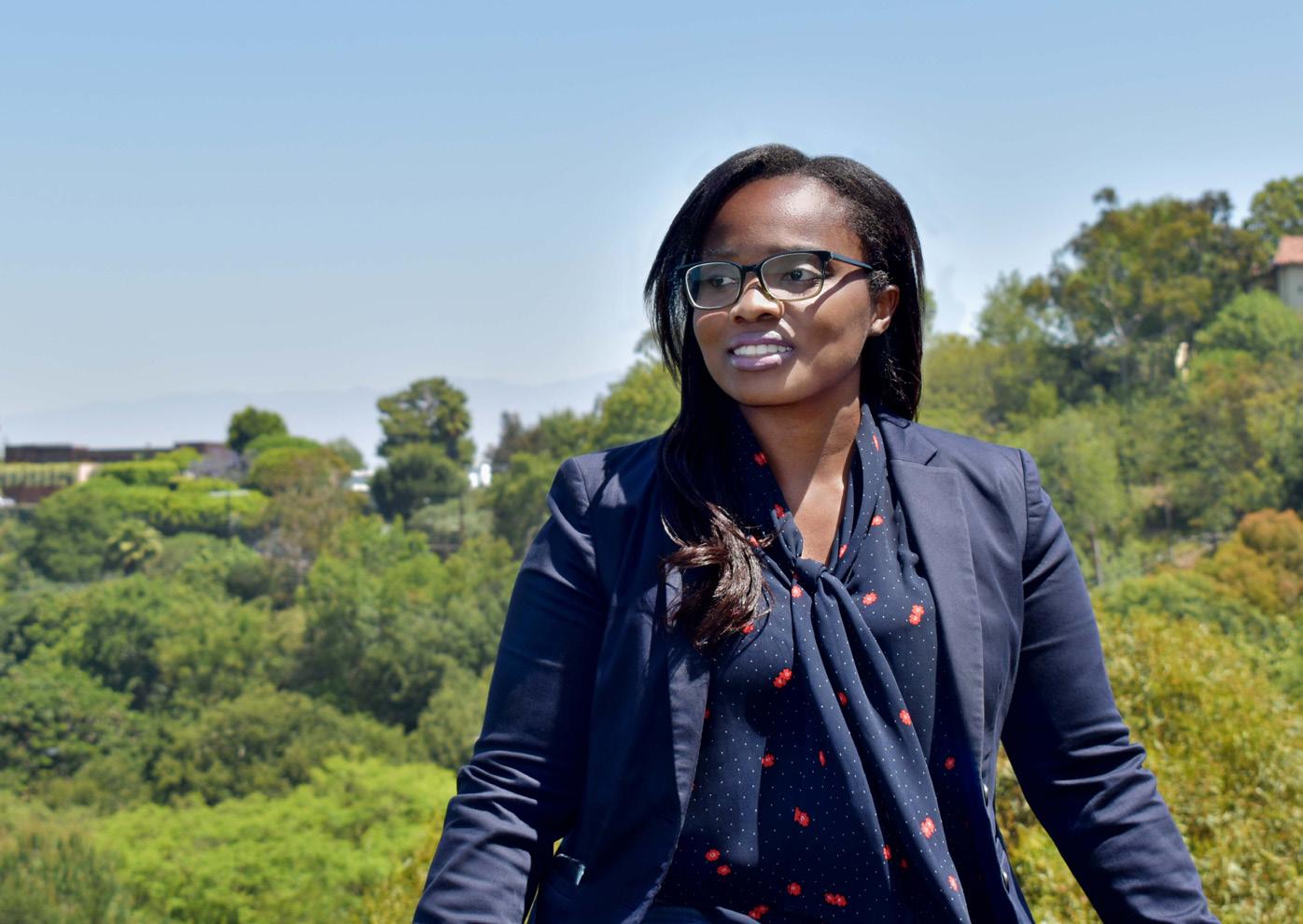
allowed him to communicate across cultures and swiftly adapt to new situations.
P84
Michael Dolce advocates for child and adult survivors of sexual abuse at Cohen Milstein Sellers & Toll
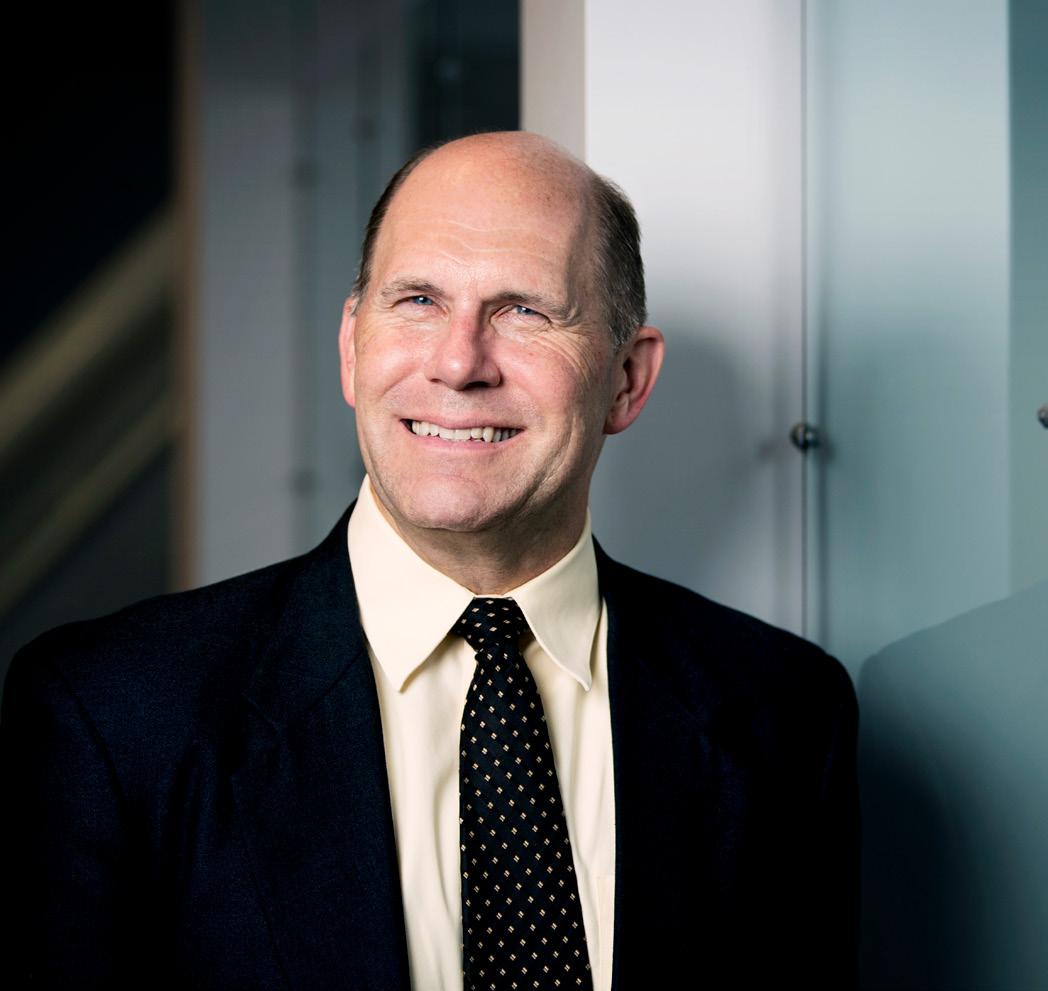
P100
Adam Levitt of DiCello Levitt Gutzler has handpicked a team of excellent attorneys dedicated to securing justice for individuals and companies
P74
P36
Contents 4
Andrew Hancock (Bostrom), Handal Murat (Conduah)
Lead Evaluate
P120
Dawn Becker has dealt with many crises and challenges in her years with Federal Realty Investment Trust, including an early project that went up in flames during the largest fire in San Jose’s history

P172
Steve Heinrichs brings a fascination with the manufacturing industry and more than two decades of experience to Mueller Water Products, where he is helping grow the business globally
P187
Goldberg Segalla’s Michael Appelbaum employed his social media sleuthing skills to pull off a cinematic win in an unusual automotive liability case
P199
Washington Prime Group’s Stephen Ifeduba is ever adaptable as he handles the shifting demands of his role in the dynamic retail landscape
P202
P131
Terry Roberts on how American Eagle Outfitters aspires to match its culture to its beliefs, walking the walk on diversity and inclusion
P134
CoStar Group’s Jaye Campbell, Jeannette Koonce, and Stefanee Handon have played a critical role in establishing the legal group as a businesspositive collaborator

P140
Communication is the name of the game for Weatherford’s David Morris, who acts swiftly and dispassionately to find solutions to issues
Tiffany Archer draws upon empathy and an in-depth understanding of human psychology to further a strong culture of ethics and compliance at Panasonic Avionics
P120
Modern Counsel 5
P202 Courtesy of Federal Realty Investment Trust (Becker), Benjamin Chateauvert (Archer)
Creative Director, Editorial Kevin Warwick Managing Editor Hana Yoo Senior Editor Frannie Sprouls Editors Melaina K. de la Cruz Sara Deeter KC Esper Designer Gretchen PeGan Staff Writer Billy Yost Corporate CEO & Publisher Pedro A. Guerrero Chief of Staff Jaclyn Gaughan President, Group Publisher Kyle Evangelista VP, Hispanic Division Head of Audience & Engagement Vianni Lubus VP, Finance David Martinez Director, Client Services Cheyenne Eiswald Senior Client Services Manager Rebekah Pappas Client Services Manager Brooke Rigert Director, Talent Acquisition Elyse Schultz Senior Talent Acquisition Manager Haylee Himel Director, Strategic Partnerships & Accounts Krista Horbenko Senior Events Manager Jill Ortiz Senior Director, Sales Ben Julia Director, Sales Training & Development Alexa Johnson Content & Advertising Managers Megan Apfelbach Abby Levitsky Elif Negiz Madi Shaw Kara Thomas Alex Tomalski Stuart Ziarnik Facebook: @ModernCounselConnect LinkedIn: @modern-counsel Twitter: @ModernCounsel Modern Counsel is a registered trademark of Guerrero, LLC. © 2021 Guerrero, LLC guerreromedia.com 770 N. Halsted, Unit 307 Chicago, IL 60642 Reprints Reprinting of articles is prohibited without permission of Guerrero, LLC. Printed in China. For reprint information, contact Reprints & Circulation Director Stacy Kraft at stacy@guerreromedia.com Contributing Writers Zach Baliva Jeremy Borden Will Grant Russ Klettke Keith Loria Courtney Ryan Paul Snyder Sara Verdi Zayvelle Williamson Clint Worthington Stephanie Zeilenga Photo Editors & Staff Photographers Cass Davis Gillian Fry 6 Masthead
Our red electric kettle bubbles,
and my husband pads to the kitchen to make himself a cup of coffee. It’s 10 p.m. Our nine-month-old daughter has finally gone down for the night, our greyhound lies dozing on his dog bed, and our cat is curled up, doughnut shaped, between the folds of the blanket beside us.

This is our nightly ritual. My husband joins me on the couch and we talk over our days, the murmur of a Korean drama humming in the background. This is our time.
Rituals have always been important to me. My family observes our weekly traditions: Taco Tuesdays, Wednesday bake nights (mentioned in my wedding vows), Friday pizza and movie nights, Saturday chocolate chip pancakes mornings. When the COVID-19 pandemic upended the world as we knew it, our sense of time flattened and blurred and threatened to set us adrift. The rituals that ground and anchor us in the present moment matter to me now more than ever.
With so many unknowns in the outside world, I remind myself that life is and has always been unpredictable. These extraordinary times have plunged us into a crash course in adaptability and resilience. Yet they have also allowed us the stillness and mental space to figure out what we care about the most—what gives our lives direction and meaning.
Modern Counsel asked the ten executives in our second annual Purpose section to tell us what drives them. These leaders are called to compassion, to service, to a cause greater than themselves. Guided by their personal missions, they steer themselves and their companies toward success.
Going forward, Steven Haber of Bloomberg plans to dedicate at least 50 percent of his time to pro bono matters. “Now, more than ever,” he reflects, “I think the legal community should be doing all it can to help out those in need.” Michael Dolce of Cohen Milstein fights tirelessly for his fellow survivors of sexual abuse to help them achieve justice and healing. And our cover star, 7-Eleven’s Allison McDade, quotes Sir Winston Churchill in explaining her desire to bring about “progress and positive change” in the world: “We make a living by what we get. We make a life by what we give.”
A world turned upside down has given us a chance to reexamine how we spend our time, act with intention, and imagine a more expansive approach to life, characterized by greater flexibility, generosity, and joy. The choice is ours; we are free to stretch and grow and change, finding our way toward a brighter future.
Hana Yoo Managing Editor

Gillian Fry Editor’s Letter Modern Counsel 7
WE MAKE YOU LOOK GOOD A custom publication is your organization’s best marketing material, and we create the best custom publications. Contact Vianni Lubus at 312.564.2185 or vianni@guerreromedia.com to start a conversation about your custom publication.
Implement
Celebrating legal leaders’ latest efforts and achievements, including transactions, expansions, negotiations, and inclusion initiatives
Chief Puzzle Officer
Dina Khaled marries her love for science and the law by protecting patents at smart home technology company Resideo
By Courtney Ryan
Implement 10
IN LATE 2018, HONEYWELL, A MULTINATIONAL CONglomerate and producer of aerospace systems and industrial products, officially completed its spin-off of smart home technology company Resideo. For Dina Khaled, that spin-off presented a compelling professional opportunity that enabled her to transition roles from an IP general counsel at Honeywell to vice president and chief IP officer at Resideo.
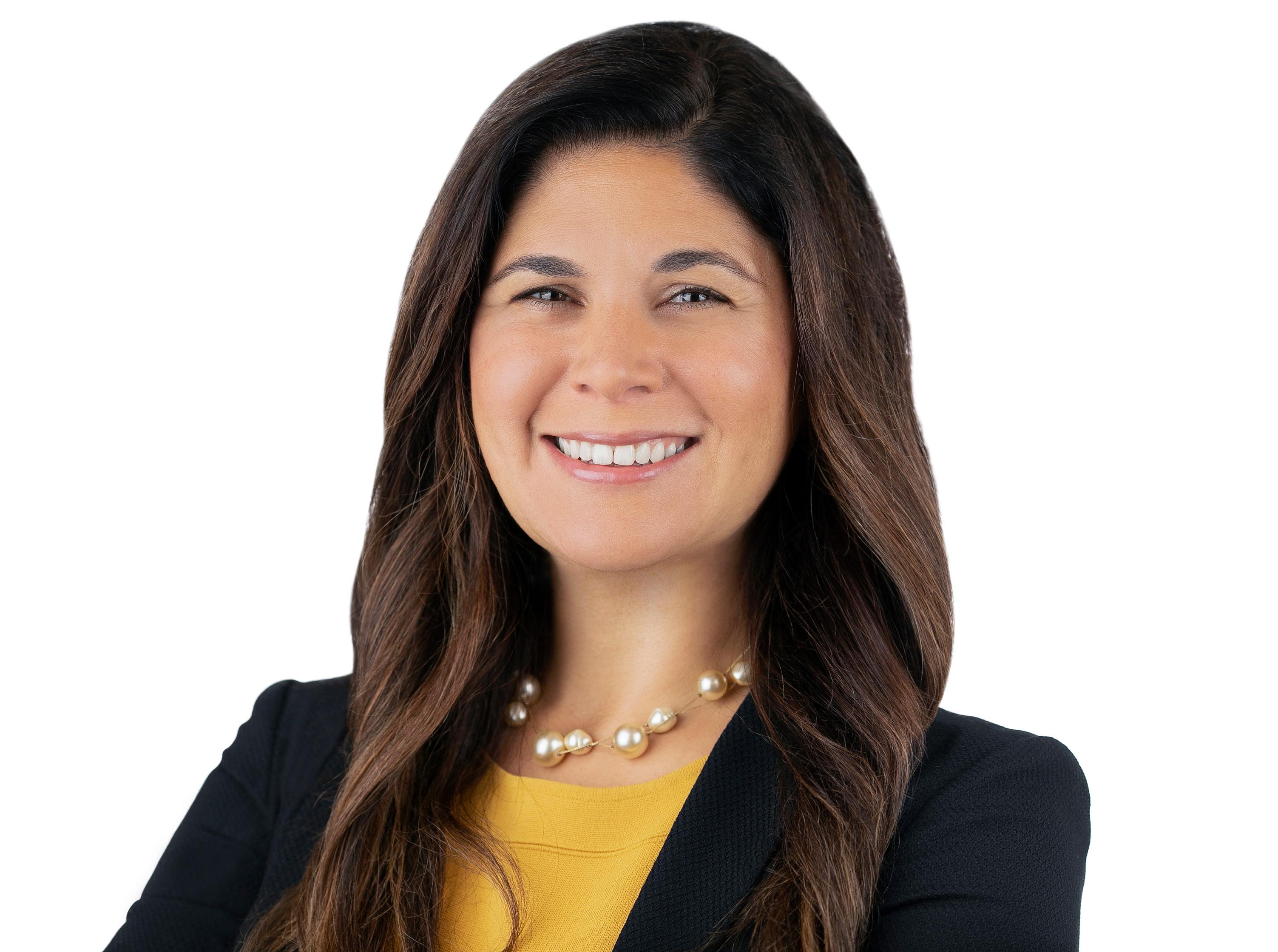
“Being involved in a spin-off was another opportunity in puzzling, but this time it required me to shape the pieces together of an effective IP department, built from the ground up,” Khaled says. “It demanded that I create a structure that was strategic and lean but responsive to our position in a competitive and
litigious market space.” Finding ways to stay on the leading edge with what she’s working on has been a driving force in Khaled’s career, beginning with her interest in intellectual property law.
“I was one of those people who knew very early on that I wanted to be a lawyer,” she recalls. “I started college as a political science major with the idea of pursuing criminal defense work or civil justice issues, but I found myself missing the problem-solving challenges of math and science.”
It was a high school math teacher who made the connection for Khaled between her innate problem-solving ability and the law—and recommended that she consider becoming a patent attorney. That
Dina Khaled VP and Chief IP Officer Resideo
Moshe Zusman
Modern Counsel 11
voice gained resonance during her first year of college.
“I pulled out a phone book and found a couple of patent attorneys who were willing to do an informational interview with me. Thanks to those attorneys generously sharing their time and insights with me, I knew I had found my career,” she says of what she discovered to be the best option for both her law ambitions and her left-wired brain. “It was a perfect marriage of interests for me—the critical thinking aspects of the law with the wonder and creativity of engineering and new technology.”
After nine years at a private law firm, Khaled landed at Honeywell and worked as IP counsel for twelve years, covering technologies such as space electronics, aviation flight controls, and jet propulsion engines. As her career evolved, she dug into new puzzles, such as guiding negotiations with prime contractors in the US government space to protect the intellectual property of proprietary commercial technologies being used in military and space applications. By the time she was ready to explore a new avenue, Honeywell began spinning off Resideo.
Prior to the Resideo spin-off, Khaled worked on the side of Honeywell in negotiating several IP agreements for the Garrett Motion spin-off from Honeywell. When Khaled was given the opportunity to move to Resideo, she used that spin-off experience to help close the IP agreements needed to position Resideo as a key player in the connected home marketplace.
“It was a really exciting time,” Khaled says of the transition. “I quickly began engaging with the key business stakeholders to develop an IP protection strategy and
to rationalize our patent portfolio of more than three thousand matters, while simultaneously getting up to speed on the four then active patent infringement suits, kicking off a substantial patent clearance project, negotiating two patent crosslicenses, and implementing a new patent matter management tool. And this was all in the first two months!”
Since the spin-off, her work hasn’t slowed down. Khaled led the IP due diligence for and subsequent integration of three small technology companies. She has overseen the filing of three petitions for inter partes review to challenge the
Implement 12
“I really enjoy solving puzzles, whether crossword, jigsaw, or legal, and I find that the practice of IP law is full of fun and challenging ones to solve.”
validity of patents asserted against Resideo— all of which were instituted. And she is currently managing Resideo’s defense of a US International Trade Commission action.
In creating an IP department from scratch, Khaled realized the team would need to be scoped to fit a small- to midcap company playing in a very complex IP space. She hired an IP attorney and an IP paralegal to fill out a small team of four employees. Khaled worked with cross-functional leaders to help drive change from legacy processes and policies to those better suited to those of the new Resideo construct and orientation.
Though the broad scope of the role keeps things interesting, Khaled’s favorite part of the job is attacking puzzles head-on while getting to learn about new technologies on a regular basis.
Shumaker & Sieffert attorneys deliver high-quality patent protection to clients around the world using a combination of legal expertise, consistent processes, and technical depth. Learn more at www.ssiplaw.com Shumaker & Sieffert, P.A. commends Dina Khaled for her recognition by the industry and Modern Counsel. PATENT PROTECTION. ENGINEERED.
“Sharing the excitement that the engineers have toward what they’ve created and what they’re contributing to Resideo is one of my favorite parts of being an IP attorney.”
13
“I really enjoy solving puzzles, whether crossword, jigsaw, or legal, and I find that the practice of IP law is full of fun and challenging ones to solve,” she says.
“I also love that I regularly get to learn about new technologies from the experts in those fields— the inventors of those new technologies. Sharing the excitement that the engineers have toward what they’ve created and what they’re contributing to Resideo is one of my favorite parts of being an IP attorney.”
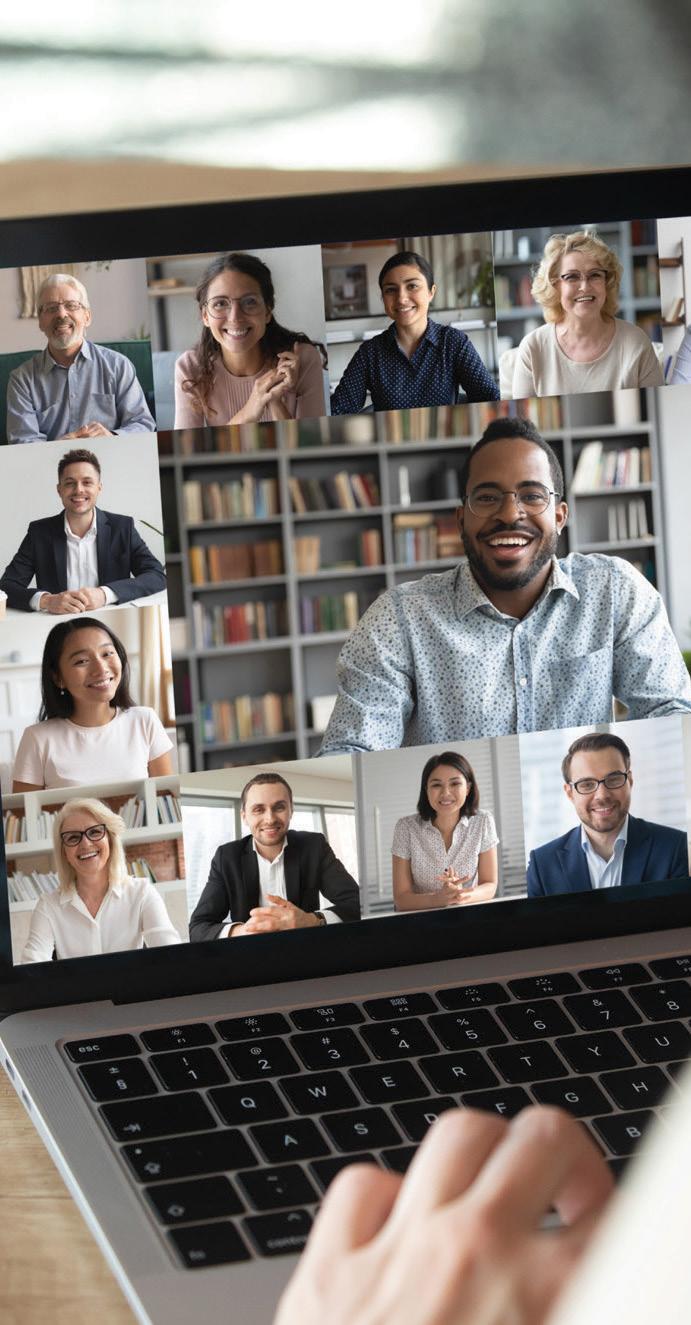
Not only does she appreciate learning from engineers in the field, but Khaled has found she also harbors a passion for teaching.
“I enjoy sharing my knowledge of IP law,” Khaled says. “In my role, there are many opportunities for me to help educate my colleagues in the legal department, as well as on the engineering and the business sides, as to why we do the things we do. As much as I like learning, I like to share knowledge as well.”
Shumaker & Sieffert, P.A.:

“As an accomplished patent attorney with a broad base of IP experience, Dina had a clear understanding of the role of IP at a technology company like Resideo from the outset. What she has accomplished is truly amazing.”
 –Jessica Kwak Rauckman, Principal
–Jessica Kwak Rauckman, Principal
At Husch Blackwell, client relationships are our highest priority. We are pleased to partner with Dina Khaled, Vice President and Chief IP Officer, to deliver legal insight and business leadership to Resideo. Innovative connections. Partners in your success. huschblackwell.com 120 South Riverside Plaza Chicago, IL 60606 312.655.1500
A Steady Stream of Fresh Ideas
MONIKA DUDEK HAS SPENT THE PAST seventeen years building and protecting Trading Technologies’ patent portfolio, one of the largest in the financial trading space. When she came on board at the company in 2002, the electronic trading software firm had only a handful of patent applications on file. Today, it has more than nine hundred patents.
In 2013, Crain’s Chicago Business said the company had “pulled off a rare trifecta” in building a portfolio in the top ten for patent outputs in Illinois, the top twenty for quality, and the highest output per employee. Having such a strong, high-quality patent portfolio gives Trading Technologies a serious competitive edge, Dudek says. She notes that it strengthens the company’s market position and protects research and development investments.
Now vice president of intellectual property, Dudek first joined Trading Technologies (TT) as a patent agent, recruited for her background in electrical engineering and the expertise she developed at a Chicago law firm. During her first four years at Trading Technologies, she was pulling double duty, working full-time while completing the evening program at DePaul University College of Law.
By Stephanie Zeilenga
Her early work at Trading Technologies was focused on the buildup of TT’s portfolio, invention mining, and the preparation and prosecution of patent applications worldwide. She then transitioned into a management role and started to oversee the patent portfolio’s development by the in-house team. In the last few years, she was involved in a number of postgrant proceedings involving TT’s patents and the corresponding appeals to the Court of Appeals for the Federal Circuit. Last
Monika Dudek shares how Trading Technologies built one of the largest patent portfolios in the financial trading sector and what she’s doing to help other women succeed in her field
Modern Counsel 15
Expertise Spotlight
As a specialist international IP firm with twenty years of experience in helping businesses protect and exploit their IP, EIP is immensely proud to have Trading Technologies as a long-standing client. Trading Technologies were and remain ahead of the field as an independent software vendor offering groundbreaking tools for traders. While exciting and innovative, they present challenges when securing patent protection in Europe. From EPO examiner trips to regular and lively discussions around “technical contribution,” EIP partner Heather McCann has worked closely with Monika for more than twelve years to develop a filing and prosecution strategy that has enjoyed success in Europe.
EIP combines patent attorneys with IP litigators and provides clients with a range of filing and prosecution services, strategic advice, and enforcement through litigation. At EIP, we focus on direct client work and building industry knowledge, based on close links with our in-house instructors. EIP’s expertise is recognized by leading legal and industry directories and garners quotes such as “The most impressive aspect of EIP’s work is its ethos and ability to just get things done” and “hits far, far above its weight.”
Visit www.eip.com to find out how we aim to be “Better, Different.”
year, she fully transitioned into managing patent litigation and currently leads all aspects of district court litigation involving four patents.
Trading Technologies is unique in that it has chosen to keep the vast majority of portfolio work in-house, versus turning over patent drafting and prosecution to outside counsel. This tactic, as well as building out an expert team that includes highly qualified patent prosecutors, has been key to building TT’s strong patent portfolio.
“You have to really know the space to craft effective claims for patents,” Dudek says. “Writing a good claim requires a delicate balance. Too broad, and it can be read on prior art and will not withstand a litigation challenge; too narrow, and it can easily be designed around.”
Building Trading Technologies’ patent portfolio required a steady flow of fresh ideas, so the in-house team established a culture of innovation. They educated employees about the patent process, encouraged engineers to come to counsel with their ideas, held brainstorming sessions with engineers, and established a recognition program for inventors. They also built a patent committee to review innovations.
“During my early days at Trading Technologies, those patent committee members were our eyes and ears at engineering meetings. They alerted us to potential innovations, which provided yet another stream for a steady innovation pipeline at the buildup stage,” Dudek says.
The in-house team also worked closely with examiners at the United States Patent and Trademark Office
Implement 16
(USPTO) to increase Trading Technologies’ allowance rate, especially in the early years of the portfolio buildup.
“In 2004, when most of our cases started getting examined, the allowance rate in our patent class was one of the lowest of any patent class at the time,” she says. “We had to work with the examiners at the USPTO to educate them about our technology.” A few years of persistence paid off, and the in-house team significantly increased the allowance rate, setting off a period of robust portfolio growth.
Although Dudek is passionate about her work in patent law, she says the profession suffers from a severe

gender and diversity gap. It’s not rare for her to be the sole woman in a room full of male attorneys and engineers.
In 2018, to encourage other women in the field, Dudek became one of four founding members of the Chicago chapter of ChIPs. ChIPs stands for Chiefs in Intellectual Property and is a global organization that connects and advances women in tech, law, and policy. More than sixty women attended the very first event, and the chapter has continued to grow ever since, says Dudek, who is currently the Chicago chapter’s cochair.
“ChIPs events are highly beneficial to both young and senior female attorneys
because they provide a venue to develop and enhance networks and spotlight successful women leaders,” she says.
Now that she’s been in patent law for twenty years, Dudek says she feels it’s an obligation—and an honor—to pay it forward to women just starting their careers in patent law. “I am always ready to help young attorneys, meet for coffee, and offer advice,” she says.
She continues, “If we are in leadership positions, we should work toward increasing equality and diversity in the intellectual property field, not only by our own actions but also by being vocal with corporate leadership about the need to do so.”
Courtesy of Trading Technologies
Monika Dudek
VP of IP Trading Technologies
Modern Counsel 17
A Human Satellite
Matthew Wagner brings networking skills aplenty and more than two decades of litigation and IP expertise to PDC Brands
By Billy Yost
Implement 18
MATTHEW WAGNER DOESN’T HAVE A “Go Big or Go Home” tattoo anywhere on his body, but it’s not because he lacks the pedigree. The now general counsel at PDC Brands with nearly twenty years of firm experience prior to going in-house doesn’t just have an area of expertise; he has half a dozen.
Early in his career, litigating on behalf of cable and telecommunications companies, Wagner realized he wanted to work on matters that landed exclusively in the federal courts and agencies. He purposefully chose to pursue substantive areas of the law that were exclusive to the domain of federal law.
But PDC Brands didn’t just gain an expert litigator with multitudes of IP, copyright, and patent experience when Wagner transitioned from outside general counsel to full-time in-house GC. They got a natural networker. Or at least one might assume so, based on the lawyer’s cultivation of a supportive circle around the world that goes hand in hand with participation in legal and bar associations. Yet by his own admission, it’s a skill that Wagner has had to actively hone. And like most things in the lawyer’s career thus far, he has chosen to do so on a large scale.
“Matt is completely hands-on and uses his years of experience in planning litigation strategies and developing
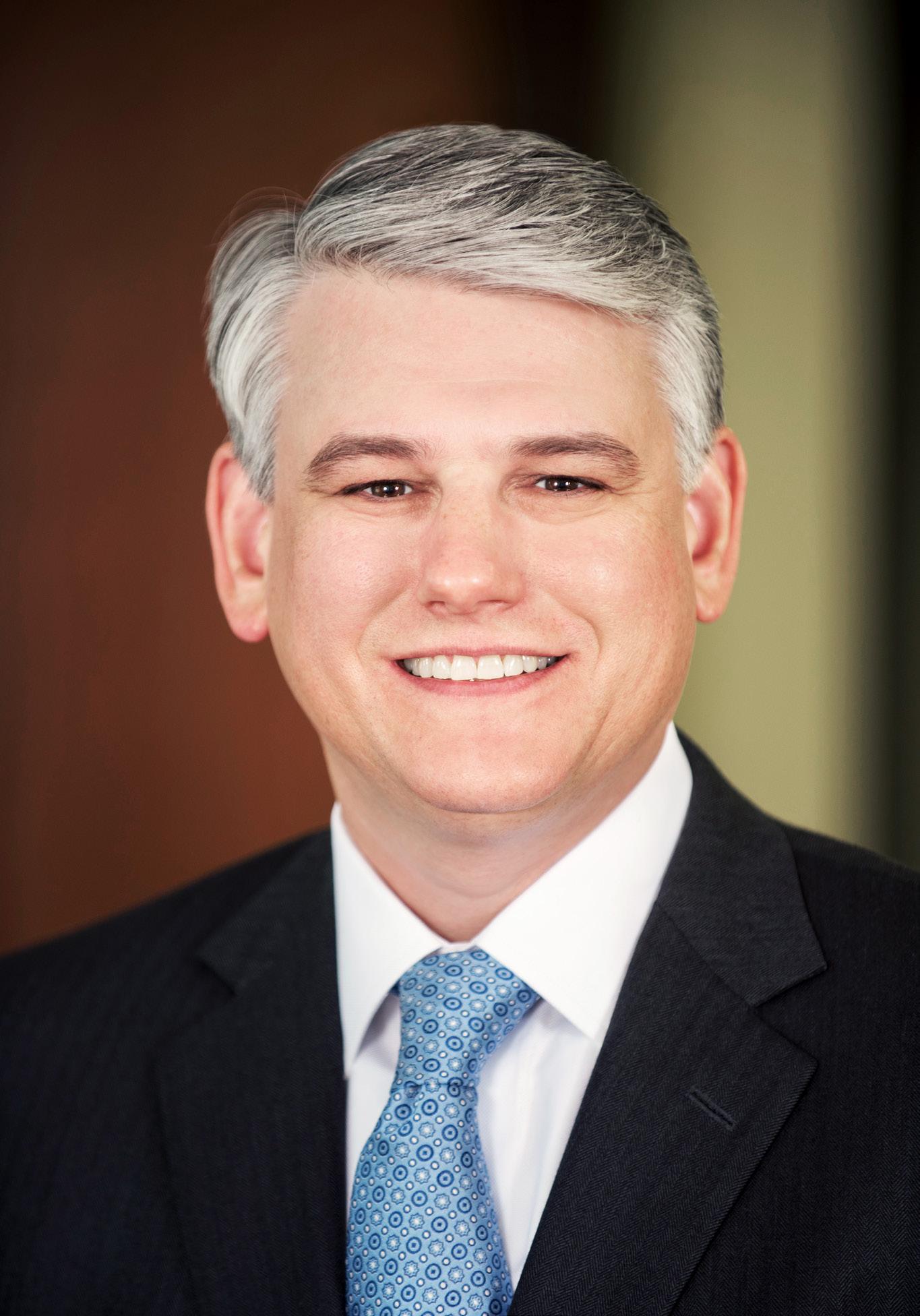
Event
Photography of North America Corporation/Courtesy of American Intellectual Property Law Association
Modern Counsel 19
Matthew Wagner General Counsel PDC Brands
technical defenses with outside counsel,” says Cristina Ciminelli, a partner at Yukevich | Cavanaugh. “Matt is truly supportive and collaborates at every step to ensure the best possible results. As a further bonus, Matt is pleasant to work with and appreciative of outside counsel and their efforts.”
A Young Antenna
Wagner’s exposure to law came early on by way of his father, who, after two decades as a history teacher at James Madison High School in Brooklyn, put himself through law school and pursued a legal career.
“He got involved in cable, telecom, and satellite law in the mid-eighties,” Wagner remembers. “The work he was doing ultimately became an aspect of the architecture for the modern cable television system, relating to customer premise equipment and security methodologies.” His dad’s work coincided with the Cable Communications Policy Act of 1984, which enacted national standards for local and regional cable TV franchises, along with many requirements all cable TV systems would have to meet going forward.
Although Wagner’s father passed away while his son was attending law school in the early ’90s, the young Wagner was exposed to a fair amount of his father’s work. At the same time, he found himself interested in computer programming and how that work product could be protected.
“Broadband was on the horizon, and we all rode a giant wave that truly changed everything in the way we live, work, and play,” Wagner says. Those advances in technology also eschewed an evolution in cable and satellite television law, enacted just as Wagner was graduating from law school: the Telecommunications Act of 1996.
Wagner went on to work right in the epicenter of communications law: Washington, DC. The new law deregulated huge parts of the industry and left many cable
and satellite companies looking to adapt to the new climate. “It was a very busy time in DC for us,” Wagner remembers. “Companies that once held monopoly franchises were now open to competition.”
Wagner says the action was hot during the late ’90s while the new ’96 Act was being implemented, both at the Federal Communications Commission and in federal court. Litigation ensued over the meaning of the statutes and to resolve disputes between competitors.
Infrastructure to Content
As Wagner’s career progressed, his interest in IP continued to build. With the birth of his first daughter in 2000, the family moved back to the Northeast to begin their next chapter. Wagner began as an associate at boutique firm Collen IP in Westchester, New York, then rose to the role of litigation partner. In this role, he handled all forms of intellectual property and related commercial disputes, including patent, copyright, trademark, false advertising, trade secret, and unfair competition cases. Carrying his experience with computers and software forward, he counseled clients about domain names and litigating cybersquatting cases under another new federal law that passed in 1999.
The burgeoning IP expert relied on his software and electronics background to guide his work, building out IP-related expertise over a decade at Collen. Leveraging his experience in cable and satellite technology as well as computer hardware and software, Wagner recalls litigating patents relating to myriad subject matters, including eyewear, electronic transaction processing and prepaid gift card technology, and industrial lasers. Over the course of many years, Wagner found himself as lead nationwide litigation counsel on behalf of a client enforcing a portfolio of patents related to magnetically detachable sunglasses.
Implement 20
The lawyer’s work took him to federal courts all over the country. During this time, Wagner also represented luxury goods makers from all over the world in domestic anticounterfeiting. “I represented the Swatch Group as well as some luxury watch companies and fashion designers while at Collen IP.” Wagner developed different strategies using IP laws to thwart the unlawful importation and distribution of counterfeit and parallel goods. Using copyright to protect the designs etched in the watchcase back, Wagner litigated one matter all the way to the Supreme Court.
Also, Wagner began building out a new expertise: consumer products and cosmetics. He’s not even fully sure how that came about. “For whatever reason, I developed this very deep experience and knowledge in cosmetics: lotion, skin lightening creams, skincare, soap, and the like,” he recalls.
The lawyer continued to amass knowledge about new product development, research and prototyping, manufacturing, and the entire life cycle of consumer products. The lawyer would eventually be lured in 2010 to the regional corporate and commercial law firm Diserio Martin in its Stamford, Connecticut, office to found its IP group, before coming in-house to PDC Brands in October 2018.
Wagner was intimately familiar with PDC, having represented the company for almost a decade as outside counsel. What began as a routine trademark infringement case blossomed into a relationship that saw Wagner become outside general counsel to the company and nonexecutive secretary to the board of directors. Among other transactions, he advised the company in 2012, when its founder exited through a sale to private equity firm Yellow Wood Partners. And in 2017, he represented the company in connection with Yellow Wood’s sale of its stake to CVC Capital Partners and Leonard Green Partners for $1.425 billion. Wagner joined PDC as its first in-house lawyer as general counsel in October 2018.
Building an Ecosystem
The particulars of Wagner’s work require him to work in jurisdictions on a global level. The lawyer sits on the board of the American Intellectual Property Law Association, where he is former chair of the copyright law committee and participates in a handful of others. He is also a fellow of the American Bar Association. Additionally, he is involved in his local community,
Modern Counsel 21
“I knew I needed to create and cultivate relationships and spread those relationships that I had already developed into new directions and places. It’s the best way to meet new people with similar interests and to stay on the cutting edge.”
White & Case congratulates
where he has served on the town plan and zoning commission for more than a decade. Since 2013, he has been elected annually by his fellow commissioners to be the chairman.
“I knew I needed to create and cultivate relationships and spread those relationships that I had already developed into new directions and places,” Wagner says. “It’s the best way to meet new people with similar interests and to stay on the cutting edge.”
At first, taking part in these organizations gave him a chance to be taken under the wing of more experienced lawyers, but eventually, it allowed Wagner to mentor people and do the same good for others that he was shown. “It’s really that critical element of who we are as people and professionals,” Wagner says.
“It’s staying involved in your community and learning from the very best, then passing that along to others. If you do that, good things will happen.”
22 In this advertisement,
White
&
Case means the international legal practice comprising White & Case llp, a New York State registered limited liability partnership, White & Case llp, a limited liability partnership incorporated under English law, and all other affiliated partnerships, companies and entities.
our esteemed colleague and client, Matthew Wagner, on his professional accomplishments, dedicated leadership and significant contributions to PDC Brands’ success. We are honored to partner with Matthew in the pursuit of innovation and excellence. whitecase.com
Wagner says that while professional networking has become yet another arrow in his quiver, it wasn’t ever an area in which he thought he might thrive. “It really doesn’t come easy for me,” the lawyer admits. “And it’s something I’ve struggled with. But we need to all recognize that everyone brings something to the table. The most important thing is showing up to the table.”

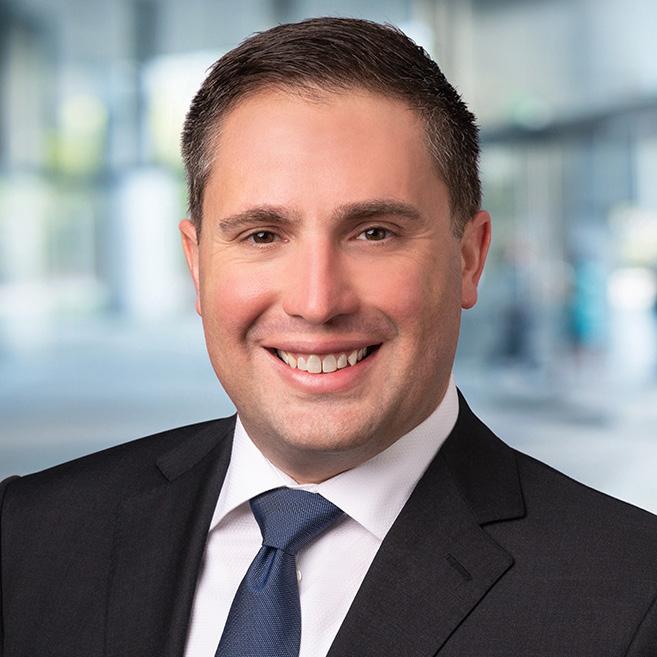



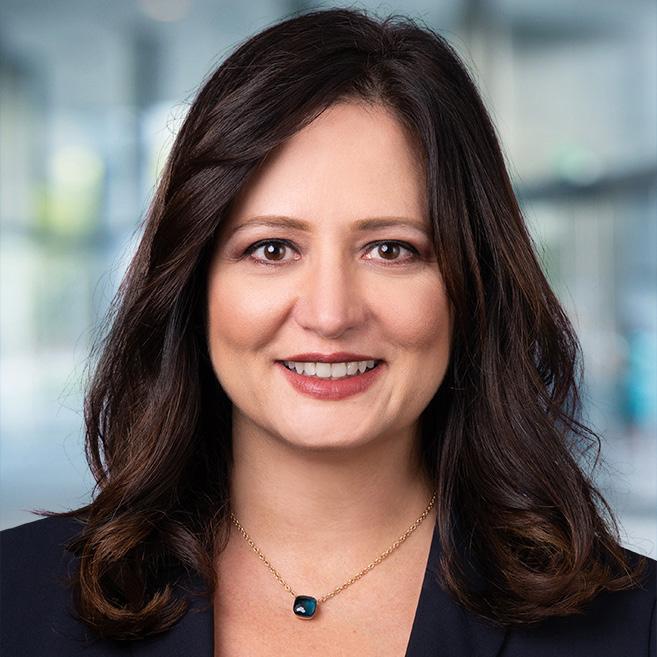
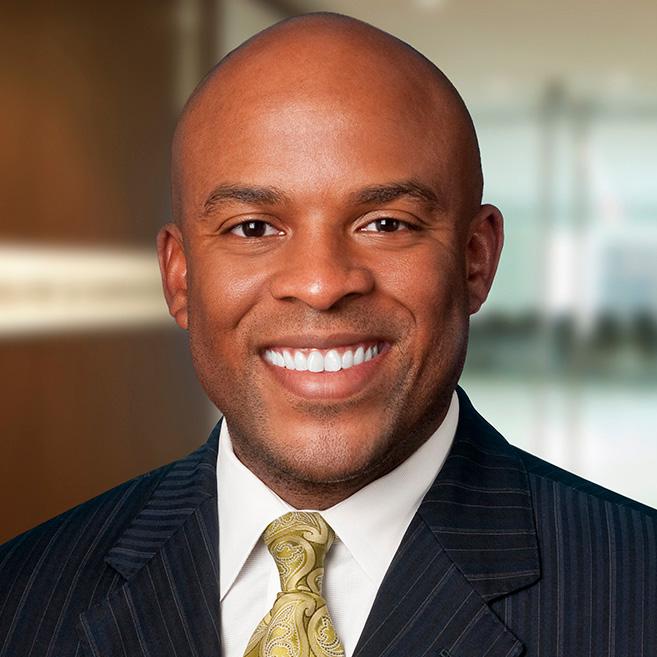

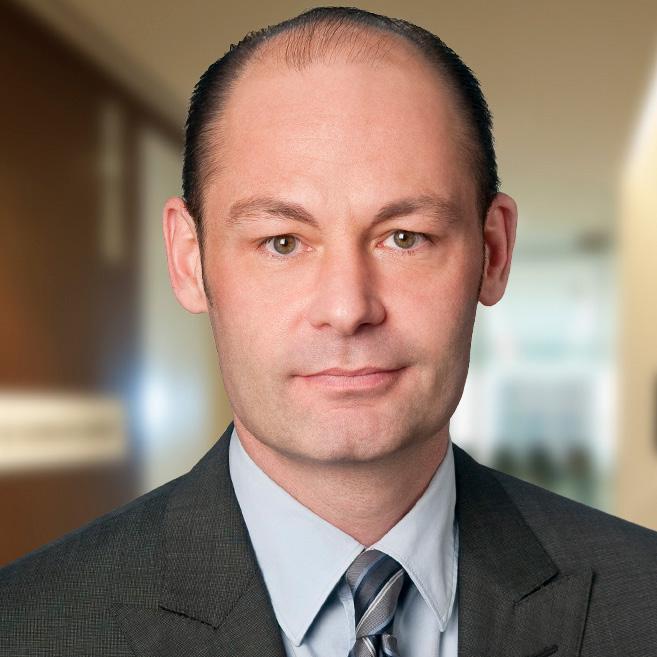
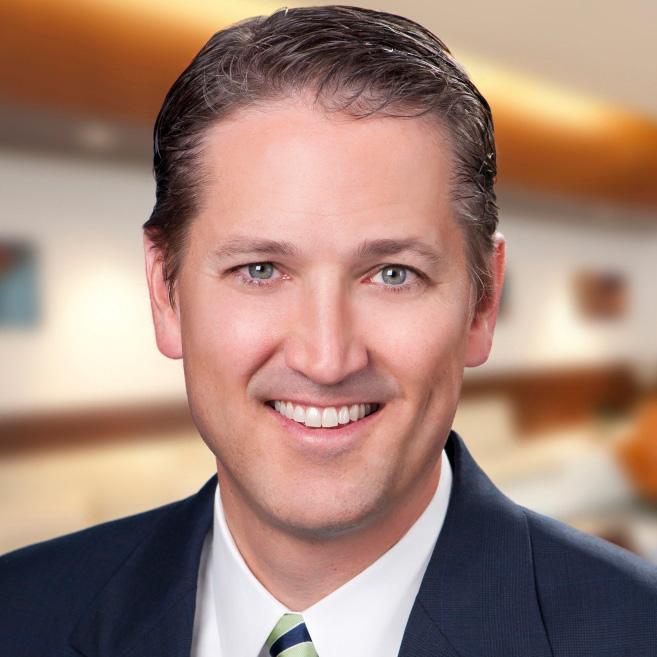

It’s the strongest advice the GC says he can offer those who are struggling to connect to more people in their field. “You’ve got to cultivate and plant those seeds through bar associations, speaking engagements, and other opportunities,” Wagner says. “The professional development activities are unpaid—an investment—but believe me, it keeps you ahead of the curve, on the very top of your game, connected to the best of the best, and doing good for others.” His advice is to raise your hand and participate. Be a leader.

23
From left to right, top to bottom: James J. Yukevich, Todd A. Cavanaugh, Steven D. Smelser, Thomas Borncamp, Cristina M. Ciminelli, Delmar S. Thomas, Raymond H. Hua, Nina J. Kim, David A. Turner, Patrick J. Cimmarusti, Jeffrey W. Caligiuri
yukelaw.com
Yukevich | Cavanaugh congratulates Matthew Wagner of PDC Brands for his recognition in Modern Counsel.
Los Angeles | San Diego | San Francisco
Preparation, Thought, and Perseverance
At residential mortgage colossus PennyMac, Chris Weinstock handles the legal end of blockbuster deals under tight deadlines
By Paul Snyder
Implement 24
WHEN YOU HANDLE THE LEGAL END OF FINALIZING deals worth hundreds of millions—if not billions—of dollars, it’s best not to get intimidated by the big numbers at stake. Although Chris Weinstock, executive vice president and deputy general counsel for residential mortgage giant PennyMac, concedes it took time to learn that lesson.
“I worked on more garden-variety warehouse lending transactions before I joined PennyMac but had also negotiated strategic alliances with all sorts of Fortune 500 companies,” he recalls. “I was used to that. Some of the innovative transactions we’re involved with here really go beyond the norm. It’s easy to be intimidated by a $1 billion transaction and what happens if it doesn’t actually get closed on Tuesday like it’s supposed to. It’s a matter of getting used to delays and the complexity of everything involved and coming up with problem-solving alternatives.”
Since joining the company in 2015, Weinstock has become intimately familiar with the process, helping carry major deals across the finish line. From securing term notes worth up to $650 million for mortgage servicing rights to bolster the company’s capital structure to finding ways to secure servicing advance financing even in the midst of the COVID-19 pandemic, PennyMac’s executive leadership—in concert with mortgage finance, the treasurer’s office, and the legal team—has helped cement PennyMac’s reputation as a powerhouse in the financial industry.
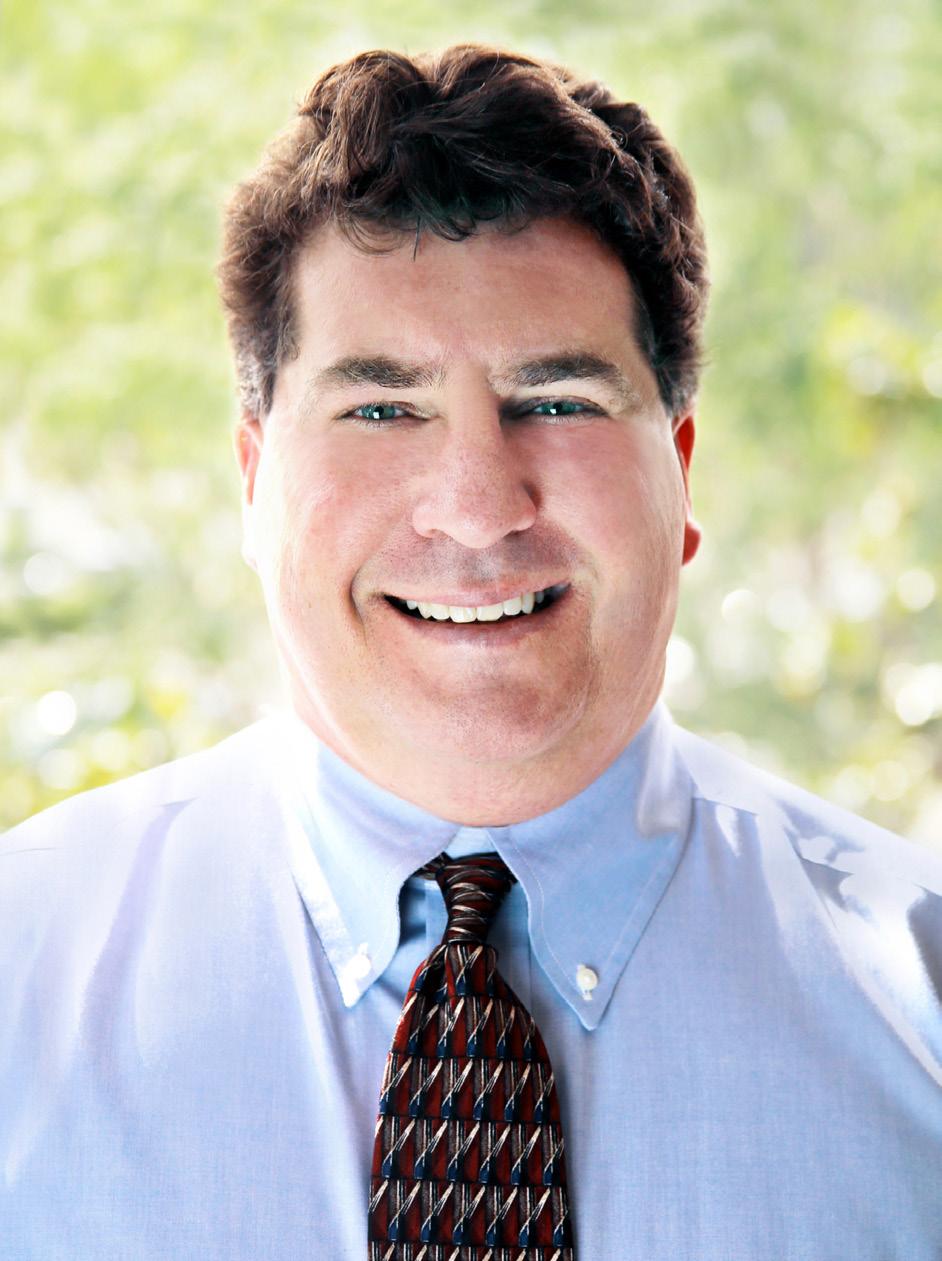
“The fact that PennyMac is widely known in the industry for its innovative, successful deals is a tribute to Chris’s excellence and leadership,” says Chris Gavin, a partner at law firm Cadwalader, Wickersham & Taft who regularly advises on PennyMac transactions. “He sets the tone when it comes to teamwork and commitment and getting results.”
Weinstock says deals range from “smaller” ($100 million) warehouse lending agreements to finance mortgages the company originates to $2 billion layered, multiasset structures that include combinations of lenders and Wall Street investors. In heading up the legal team responsible for structured finance transactions related to as well as strategic acquisitions of mortgage servicing rights and mortgage servicing advances, Weinstock has to be aware of corporate structures, pricing terms, and every little dip and uptick in the market—which has proven especially volatile in recent months.
Even working against the clock and fielding one tight deadline after another, Weinstock says patience and understanding are key in these transactions—another lesson he had to learn on the job.
“We once had a big transaction that we’d been working on for more than eighteen months, and one of the ancillary transaction parties intentionally delayed the negotiations to create leverage and obtain better terms,” he recalls. “Some people internally saw this as an attempt to create excessive or unfair terms. This happened in the final days and hours of the transaction that we had worked on for so long, and it was too late to replace the ancillary party.
“I lost my temper and expressed my frustration, and unfortunately, it was misinterpreted by one of the primary parties of the transaction as being directed at them,” Weinstock adds. “Eventually, it was all explained and settled, but what I learned from the experience is that you have to be mindful of the relative importance of the
Ken Taylor
Chris Weinstock EVP and Deputy General Counsel PennyMac
Modern Counsel 25
Cadwalader, Wickersham & Taft LLP www.cadwalader.com
issue to the overall benefit of the transaction. We try to not get upset about the curveballs that come at us. There might be an initial reaction, but then we try to laugh or joke about it and come up with something that’s going to get the deal done to the satisfaction of the company.”
Although Weinstock works with a small team, he says their dedication—combined with PennyMac’s overall ethos of accountability, reliability, and ethics—supports continued success at the company.
“The bigger and more innovative the transactions become, the more pressures fall on our team. But getting the deal closed and seeing the benefits of each of these transactions to the company is the payoff,” he says. “We really couldn’t accomplish it without all working hard and working together.”
His own work ethic stems from his parents, who divorced when he was young but still maintained a cordial relationship and showed their son how to pursue goals while embracing one’s own passions.
“As I was growing up, I saw my mom go back to school to get her PhD in psychology while working and alternating her schedule every other week to watch my sister and me,” he recalls. “To see how hard she worked to accomplish the dreams that she had both for her career and for her family— that instilled a very strong work ethic in me.
“Similarly, my dad was a successful professor at the time, the assistant dean of the liberal arts program at UT [University of Texas at Austin], and he was also a marathon runner,” Weinstock adds. “He would train relentlessly with a couple of his buddies, and he completed more than twenty marathons—including the Boston Marathon twice. That contributed a lot to my drive as well.”
It’s a connection that’s easy to make when Weinstock discusses his team’s “tireless work” in an environment where the unexpected constantly has to be expected.
“Sometimes you have to go the extra mile, take on more than is expected, or cover for someone else to get the deal done in a timely manner,” he says. “Other times, you have to identify the root cause of another party’s issue and develop alternative compromises that work for both sides. It requires a lot of preparation and thought, which we do together as a team. We talk through it and find ways to be flexible and find common ground that’s fair for us and for those we work with.”
It is a distinct pleasure to partner with our valued client Chris Weinstock on so many innovative, firstof-its-kind transactions.
Our thanks for your vision and leadership, and here’s to many more PennyMac transactions and years together.
Your Cadwalader Team
26
Living for the Challenge
Robert LaPorta has tackled all manner of crises at Delta Air Lines, but one of his biggest challenges—and accomplishments— was getting a partnership with LATAM off the ground
By Clint Worthington
ROBERT LAPORTA HAS BEEN WITH AIRLINE GIANT
Delta Air Lines for a long time—more than two decades, having joined the company in 1999. As an integral part of the legal department’s corporate transactions team, the director and assistant general counsel has had a hand in shaping long-term legal strategy for one of the world’s largest airlines. He’s helped the company weather events as dramatic as 9/11, bankruptcy, the threat of hostile takeover, and most recently, the coronavirus’s substantial impact on the global economy, most especially the airline industry.
But one of the most notable feathers in LaPorta’s cap is Delta’s recently announced strategic partnership with LATAM, South America’s largest airline. Once fully implemented, the partnership will provide access to 435 destinations worldwide for both airlines’ customers. It was a once-in-a-lifetime opportunity for Delta, and one LaPorta found himself in a unique position to help secure.
Modern Counsel 27
Over the twenty-plus years LaPorta has worked for Delta, he’s taken on many disparate duties in his role on the corporate transactions team. He and the other three attorneys on the team support Delta’s mergers and acquisitions work—including the management of outside counsel—and handle several areas of the company’s commercial contracting. LaPorta is the primary legal contact for Delta’s global distribution, cargo, agency sales, and Delta Connection divisions.
But one of the most interesting roles LaPorta recently had was working with Delta’s Alliances group, which seeks out partnerships with other airlines to enable more international travel options for Delta’s customers. “Under most government regimes, airlines cannot be owned or controlled by an entity outside the airline’s country of its origin; therefore, a US-based airline cannot acquire or merge with a carrier based in another country, and vice versa,” LaPorta explains. “Additionally, international treaties generally limit airlines to only operating flights within, to, and from its domiciled country.”
Simply put, a Delta plane can only take off or land from somewhere in the United States. Thus, to offer its customers the ability to travel to an international location to which it doesn’t fly, Delta has to strike an alliance with an international airline that does serve that market. This is known as connecting airlines’ networks.
While LaPorta spent some time supporting Delta’s Alliances group when he first started, he hadn’t worked much in that area since approximately 2008, after Delta’s merger with Northwest Airlines led to some internal restructuring of responsibilities within the legal department. But he was brought back to be a member of a very small team formed to negotiate the strategic partnership with LATAM, in a complicated saga of clandestine meetings and secrecy on par with a spy novel.
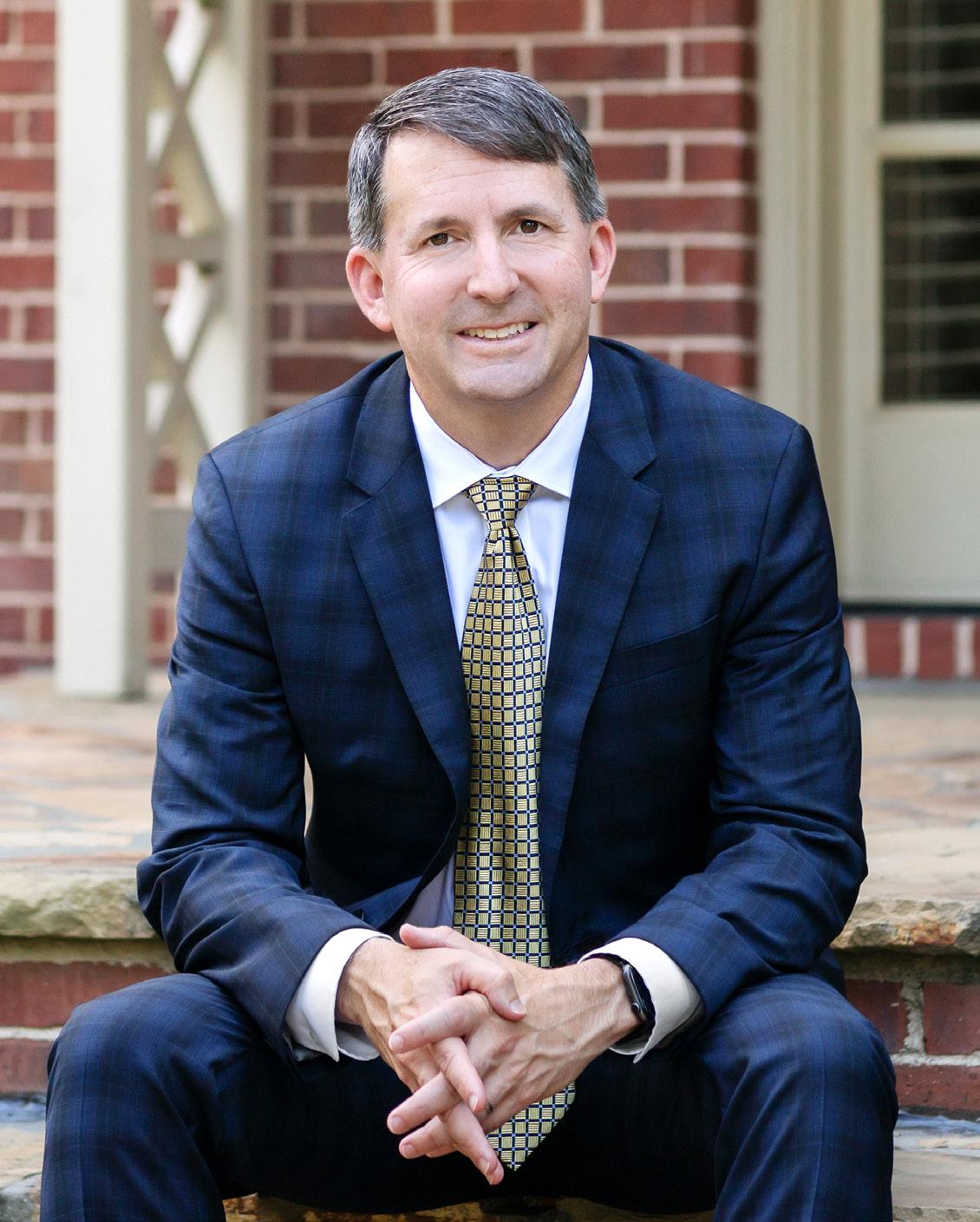
The Delta-LATAM partnership started from an extremely unlikely place: LATAM already had an existing US alliance partner in American Airlines. However, their proposed joint venture arrangement was rejected by the Supreme Court of Chile, where LATAM is headquartered. Seeking other options, LATAM approached
Director and Assistant General Counsel Delta Air
Delta to strike a deal—which came with its own complications for Delta, since they had a preexisting partnership with Brazil-based GOL Airlines. Normally, the Delta attorney who handled the legal work for the Alliances group would have been on point for this project; however, the highly sensitive nature of the negotiations meant anyone within Delta who regularly interacted with GOL couldn’t participate in the LATAM negotiations. This is where LaPorta came in, dusting off his Alliances experience to be a member of a “clean team” of fewer than forty Delta employees that engaged in very high-level, secretive talks with their LATAM counterparts to secure the deal.
Robert LaPorta
Lines
Implement 28
Tamara Gonzalez
“I was sworn to secrecy,” LaPorta confesses. “I couldn’t talk to my wife or even my boss about it.” But even with these rules of engagement, LaPorta and the rest of the team secured a deal with LATAM. In September 2019, they signed the strategic partnership agreement that laid the framework for a long-term alliance between the preeminent airlines of North and South America.
As someone who’s invested more than two decades in Delta, LaPorta sees opportunities to contribute to the company’s long-term strategy like this as particularly rewarding. “The past twenty-plus years have been exciting and ever changing,” notes LaPorta. “You can’t just sit still; we’re always looking at different ways to do business.” What’s more, he gets to work with an exceptional team of lawyers, many of whom who’ve been at Delta even longer than he has. He calls them the “history keepers of Delta.”
Before he got the job at Delta, LaPorta was interviewing for a company that made cardboard boxes and packing materials. Looking back now, he can’t imagine what his life would be like if he’d spent two decades there. After all, he wouldn’t get to deal with interesting challenges like the Delta–LATAM alliance.
“At Delta, we have the best problem solvers,” he says. “That’s what I’ve always loved best about the job: we Delta attorneys pride ourselves on actively collaborating with our business partners to solve their problems.” Luckily for LaPorta, Delta provides him with an exciting platform to face these challenges head-on.
Local Connections. Global Influence.

We are a full-service global law firm, giving our clients a voice, supporting their ambitions and achieving successful outcomes.
Our multidisciplinary team of more than 1,500 lawyers in 45 offices across 20 countries provides unrivalled access to expertise and invaluable connections on the ground. It is a seamless service that operates on any scale.
Wayne Bradley Partner, Atlanta
T +1 678 272 3209
E wayne.bradley@ squirepb.com
45 Offices in 20 Countries squirepattonboggs.com
Where
Business and
Providing Insight
Law,
Government Meet
29
“The past twenty-plus years have been exciting and ever changing. You can’t just sit still; we’re always looking at different ways to do business.”
The Leadership Learning Curve
At Hexcel Corporation, Gail Balcerzak is always finding new ways to evolve and excel in her position
By Keith Loria
Implement 30
WHEN GAIL BALCERZAK FIRST STEPPED INTO her role as deputy general counsel of the Americas for Hexcel Corporation, she worked with an executive coach whose words would shape her approach to her work: “Leaders never have a bad day.”
Balcerzak is quick to explain. “We all have bad days. We’re human. But I try to make sure that whatever I’m doing, what I’m going through on any given day, is not impacting the people around me.
“I’m learning how to take that step back and give people what they need, whatever my personal circumstances are,” she continues. “While I’m by no means an expert at it, I do think it has helped me frame the way I think about my job—how I approach other people and how I can be a leader whom people respect.”
Balcerzak started at Hexcel in 2008 as assistant general counsel. From the firm’s headquarters in Stamford, Connecticut, she supported all aspects of legal work, including corporate financing and public company reporting, tax reorganization, and customer and supplier contracts. She also led Hexcel’s compliance program for three years.

A reorganization led to the creation of her current position as well as a move to the company’s offices in Dublin, California, where she is responsible for legal support for Hexcel Corporation’s Americas aerospace and global fibers business units.
“I have evolved as a leader since taking this position,” Balcerzak shares. “I didn’t have an opportunity to manage people directly before I came here, so that has definitely changed the way that I look at things.” Taking on a managerial role has clarified her perspective on past events and management decisions she didn’t understand at the time. Now, she says, she gets the balance of priorities that leadership requires.
One of her key missions at Hexcel is determining how the legal department can add value to the business. That largely involves risk management, which entails negotiating effective contract terms and getting the most protection possible.
Gail Balcerzak
Deputy General Counsel, Americas Hexcel Corporation
Modern Counsel 31
“We all have bad days. We’re human. But I try to make sure that whatever I’m doing, what I’m going through on any given day, is not impacting the people around me.”
Glazier
Another important aspect of Balcerzak’s work is considering developments that could affect Hexcel in the future. Achieving better outcomes can require improving upon plans or processes. It can also involve asking people to change how they think.
“It’s really about trying to figure out where you can smooth the road, where you can help things become efficient and effective,” she explains.
Balcerzak first considered a law career in high school. An active member of her school’s mock trial team, she shone in competitions. People told her she should become a lawyer.
“I tucked that in the back of my brain and went to college,” she states. “When I started looking at things I excelled at, I was good at thinking on my feet, I was good at public speaking, and I was good at writing and analysis. I just kind of naturally gravitated to the law as something that fit those skill sets.”
After graduating from the New York University School of Law in 1995, she worked with firms in New York as a corporate and securities lawyer. Then one of her clients asked if she was interested in joining them-full time.
“That’s how I got my first in-house job: the client asked me to come on board,” Balcerzak says. “And that was the first time that I built my own job, because they didn’t have a general counsel when I joined the company.”
JOIN NUMEROUS COMPANIES THAT HAVE ACHIEVED UNMATCHED LITIGATION

SUCCESS THROUGH GLAZIER YEE PERFORMANCE.
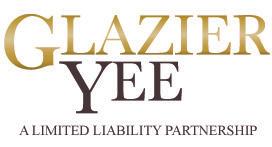
Since then, Balcerzak has enjoyed a string of career successes. Now, she is determined to support future women leaders. After attending a program held by Advancing Women Executives, an organization that helps women position themselves for the next steps of their careers, she brought what she learned to Hexcel’s mentoring program. Over the course of a year, she shared these lessons with her mentee, an engineer from the product management group.
“I’d like to see, particularly, more of our women leaders get more skills to help them in what is still a very male-dominated field,” Balcerzak says.
Coaching someone else reaped benefits for Balcerzak too. As she listened to her mentee recount experiences and ask questions—and thought through her responses—she realized something. “I was giving her advice and then thinking, ‘That’s good advice. You ought to try that yourself.’”

& Workers’
Law Products Liability
Estate & Premises Liability SAN FRANCISCO | LOS ANGELES ST. LOUIS | HOUSTON www.glazieryee.com
Aerospace & Aviation Business Counseling & Litigation Employment
Compensation Environmental
Real
Potential is interesting . . . Performance Counts.
32
Yee is proud to salute the extraordinary performance of Gail Balcerzak— Congratulations Gail!
A Competitive Spirit
Misty Lavender Foy brings her lifelong competitive drive to the strong litigation department at Delek US Holdings, where the emphasis is on resolution
By Keith Loria
Modern Counsel 33
AS A CHILD, MISTY LAVENDER FOY COMPETED fiercely in basketball, a sport she continued to play at the University of North Florida. “I’ve always had that competitive nature in me,” she notes. “In college, I was headed down a path of industrial organizational psychology when I decided to try law instead.”
Ultimately, Foy shares, it was her competitive spirit that attracted her to the law, particularly litigation.
“In law, there are a lot of gray areas and room to be creative when you need to be,” she says. “I like the negotiation part of it—and working a case to build leverage and be in a better position when in negotiation.”
Plus, with new cases every day and new precedents to work with because of the ever-changing nature of law, Foy enjoys the research behind a case as much as the litigation itself.
“There are no black-and-white answers a lot of times, which can be frustrating. Businesses want a sure route, but most of the time, our answers are more along the lines of ‘it depends,’” she explains. “I like that about it.” Besides, as the years go by, she says, you gain more experience and get to know the business. “You better understand what strategy works best and adds value.”
Foy started her legal career as a litigation associate before establishing her own firm. She managed the firm from 2008 until 2017, when she joined the City of Chattanooga office as assistant city attorney. She left in 2018 for the City of Franklin, Tennessee, where she held the same role.
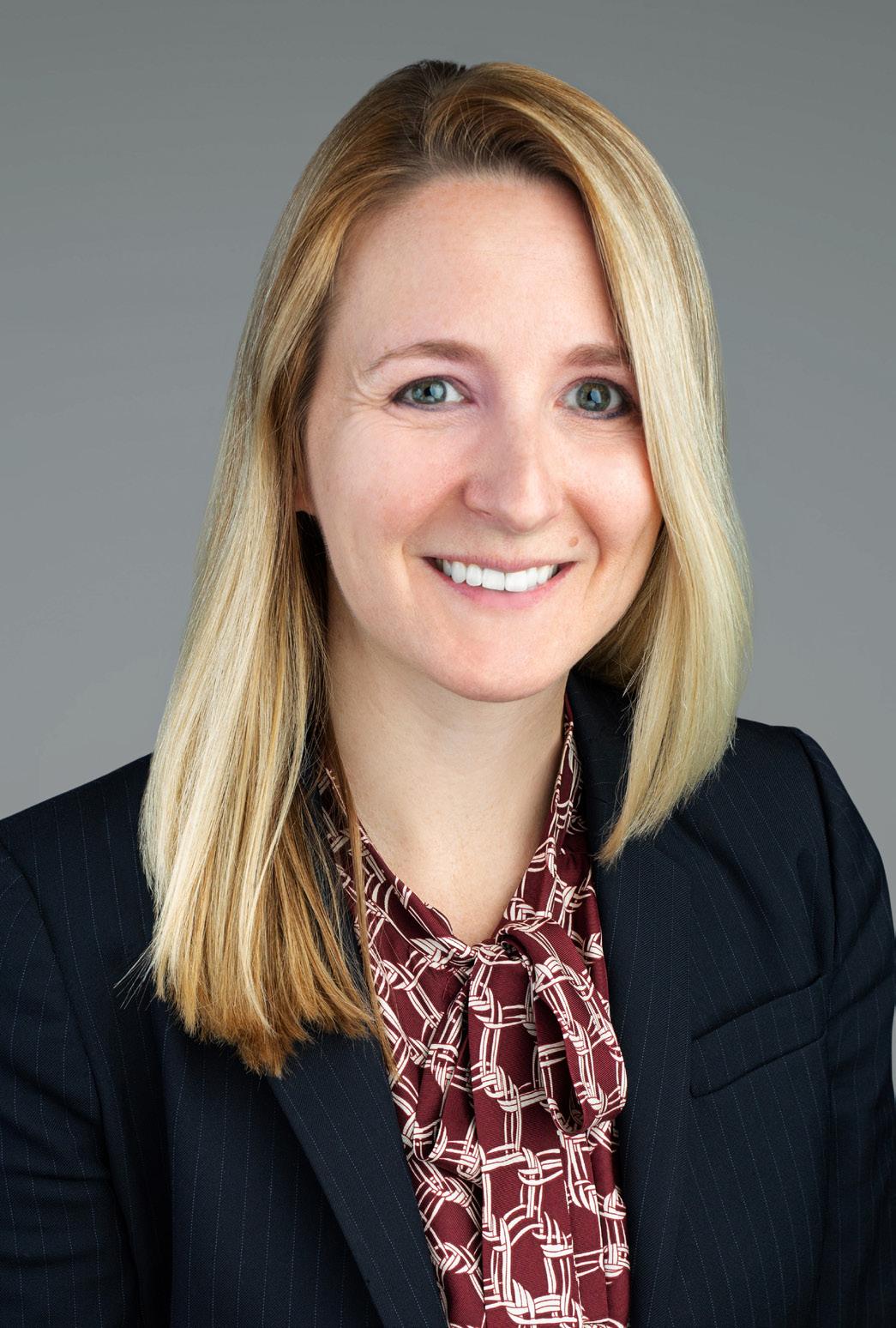
“I was doing all civil litigation in my own practice, and I had gotten to the point where I wanted to work on something bigger,” she explains.
After a few months, she decided to go in-house, becoming senior legal counsel of retail and litigation at Delek US Holdings. She was promoted to associate general counsel of operations and litigation in April 2019 and leads the litigation and claims department as of April 2020.
“That corporate in-house is just what I was looking for,” Foy says. “Working in-house, there’s something new on my desk every day, and I really like that because I am constantly building on my skill set.”
Nashville Corporate Photography Implement 34
Misty Lavender Foy
Associate General Counsel of Operations & Litigation Delek US Holdings
Since coming to the energy company, based in Brentwood, Tennessee, Foy has beefed up the litigation department. She genuinely enjoys litigation. “We like to resolve matters, not just litigate,” she says.
Aside from handling the organization’s portfolio of cases and prelitigation disputes, Foy and her team manage claims, as the claims department falls under the litigation department’s umbrella.

“In our current litigation portfolio, we can have cases ranging from the run-of-the-mill slip and fall at a retail store all the way up to potentially highexposure antitrust cases,” Foy says. “Something that we really try to focus on in my department is making an early assessment of a case and being as accurate as we can be. If we have a pretty good idea at the beginning, we can make really good decisions upfront on how to defend or prosecute the case.”
At Delek US Holdings, the legal department has been known to focus on diversity, both within the department and with outside counsel. Diversity was very important to Foy’s former general counsel, and it is just as highly valued by her current general counsel.
“I’ve asked specifically on cases that minorities be represented, both women and people of color, because that’s important to our group,” she says. “We have some huge cases that pose significant potential exposure, and it’s important for us that everyone has an opportunity to work on those cases.”
The accomplishment Foy is most proud of since starting at Delek US Holdings is consolidating litigation within a single department. Before she got there, litigation was very diffuse.
“We’ve done a really good job. Now, we’re a department of four people who work well together, with all our processes streamlined,” she says. “We’ve really tried to provide that value back to the business and brought a positive spin of resolution to the department.”
You’d expect nothing less from her.
35 More than 50 locations, including London, Houston, Minneapolis, New York, Toronto, Mexico City, Hong Kong, Sydney and Johannesburg. 1 866 385 2744 | Attorney Advertising Law around the world. nortonrosefulbright.com
We are proud to serve as counsel to Delek and congratulate Misty Lavender Foy on her well-deserved recognition.
Norton Rose Fulbright US LLP: “It is a pleasure to work with Misty. She is an innovative and strategic thinker who keeps the team focused on the big picture while at the same time sweating the details that so often matter in litigation.”
–Mark Oakes, Partner
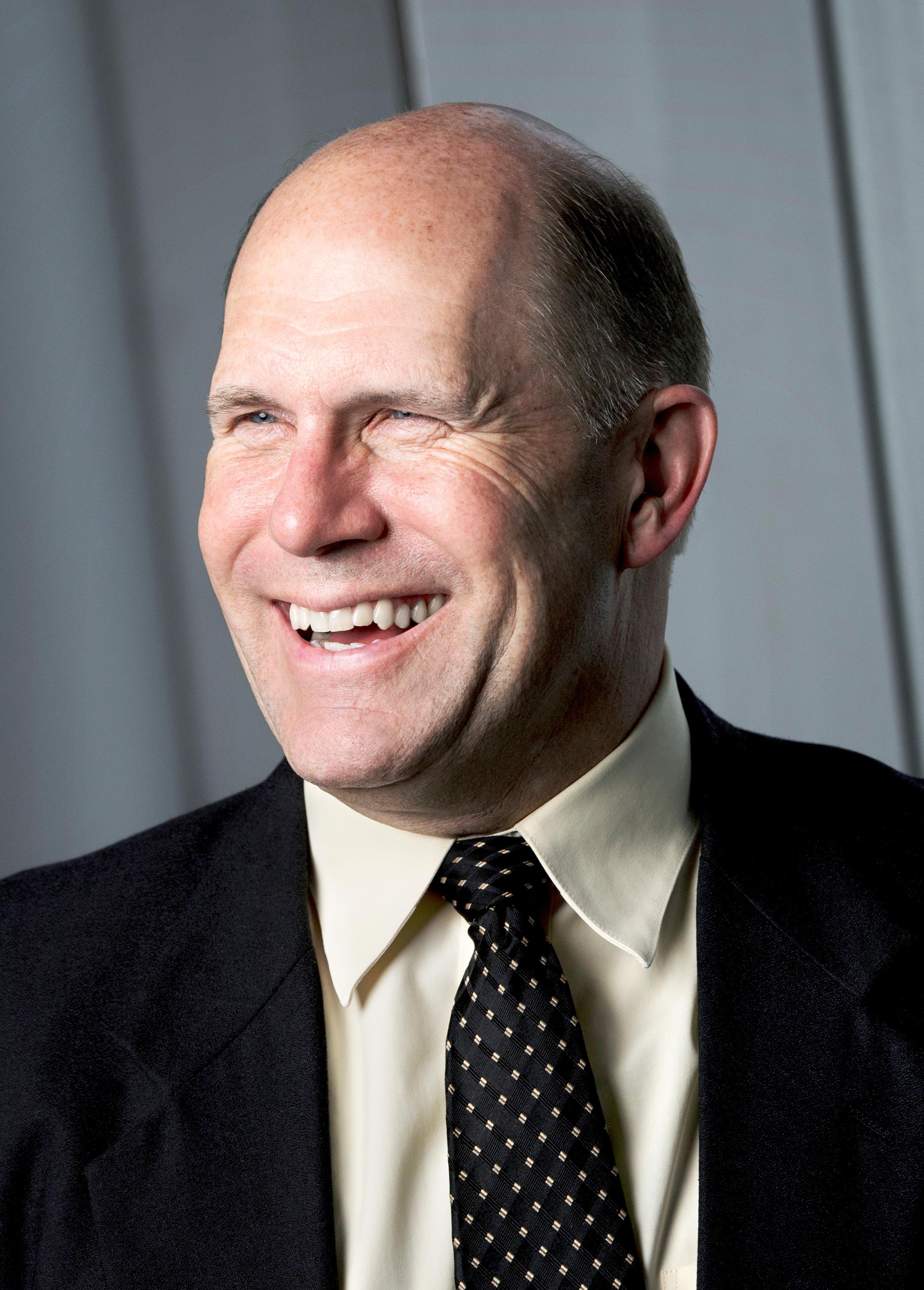
Implement 36
Andrew Hancock
Brent Bostrom VP and General Counsel Growmark
Farmers of the Future
Brent Bostrom on the strategies that farmer-owned cooperative Growmark has developed to support the fast-changing needs of the agriculture community
By Sara Deeter
FOR NEARLY ONE HUNDRED YEARS, FARMERS AND businesses across the United States have turned to Illinois-based cooperative Growmark for reliable, high-quality agricultural products and services. The organization is renowned for its ability to “execute extremely well,” explains Brent Bostrom, Growmark’s vice president and general counsel. And the company is creating strong, forward-looking strategies to ensure that Growmark continues operating at the forefront of the industry for years to come.
Growmark has been “on the lookout for growth opportunities and acquisitions for the past several years,” says Bostrom, who has been with the company since 2004. Growmark’s acquisitions have moved it into new geographies in the US, Mexico, and Canada. The cooperative also jointly owns a grain terminal on the Mississippi River with a global agriculture business.
“We’re a farmer-owned cooperative, but farmers are also our customers,” Bostrom continues. “We want to give our farmers access to the best possible markets for their corn, soybeans, wheat, and other products.”
Growmark needs to be “in touch and in tune” with customers’ needs, Bostrom says, whether that’s
expanded markets in which to sell their crops or resources for adapting to the various technologies increasingly dominating the agricultural industry. That has prompted the company to launch its current strategic planning effort.
That strategic effort centers on the following four-pillar GROW strategy, which applies to all Growmark employees.
Good Relationships
“This pillar is focused on customer service,” Bostrom explains. “We’re very good at that already, but we’ve set a goal to really up our game and become truly world-class.” There are three keys to providing outstanding customer service: employees’ knowledge of the company, employees’ understanding of customers’ needs and challenges, and a consistent set of service standards.
“We call them service excellence standards,” he says. “There are several values of customer service that are important to our organization, including trust and responsiveness. Agriculture is getting more complicated and sophisticated, and our members can’t
Modern Counsel 37
be experts on everything. We want to be that trusted source of expertise they turn to for answers.”
Resources of Unmatched Value
Recently, Growmark conducted a thorough evaluation of its different products and services—and “that is a long, long list,” the VP notes—to ensure that all of those products and services “align with exactly what the customer is looking for.”
That evaluation included a number of customer surveys, Bostrom says, but Growmark leaders also met with groups of customers from different segments of the business to talk about “what we’re offering, what we could do better, what we’re offering that they’d want us to continue to offer, and what we’re not offering that [they’d] like us to offer.”
Optimized Supply Chain
“We sell a wide range of products—seed, nutrients, crop protection products, various types of fuel—and those products are sourced from all over the US and the world. They go through a lot of different supply chains and transportation processes before they end up here and get distributed locally,” Bostrom explains. To minimize inefficiencies and waste within that complex supply chain network, Growmark has created a new position: director of supply chain.
“We’ve already realized substantial savings by optimizing the supply chain,” he says, “although of course we still have a lot more to tackle in that area in future.”
Winning Innovations
“We’re not one of the Microsofts or Googles of the world,” Bostrom acknowledges, “but there is a lot of room for innovation in our industry. We want to reach out to business partners that are involved in research and development, companies that are developing new technologies, and establish win-win business relationships with those innovators.”
Growmark has established a physical Center for Innovation, networked with more than one hundred other companies interested in innovation and agriculture, and held a tournament challenging employees to come up with new ideas.
“It was like the NCAAs, with brackets and everything,” Bostrom says of the tournament. “We had an
innovation committee that evaluated the merits of all ideas, and we are actually implementing a couple of the top ideas into our business.”
Putting It All Together
As leaders like Bostrom know, a strategy like GROW only works if employees across the organization adopt it in their everyday work and attitudes. To that end, Growmark has developed programs to help employees learn about and engage with the organization’s new approach, including a carnival day to familiarize employees with Growmark’s culture campaign and a yearlong onboarding program for new hires.
Bostrom has emphasized the importance of the GROW strategy in team meetings within the general counsel’s division (GCD), encouraging his team members to discuss the strategy “even before it was fully baked. I certainly believe in involving more people in the process,” he says. “It results in more ideas, better ideas, and a better finished product.”
Bostrom continues, “We want to get the whole team on the same page with this new strategy and develop what we call GCD guiding principles. Some of those principles have been in place for a while now; we just wrote down what we were already doing so
Implement 38
“Agriculture is getting more complicated and sophisticated, and our members can’t be experts on everything. We want to be that trusted source of expertise they turn to for answers.”
that we have some official rules of the road.”
Bostrom knows that he and his team have a long road ahead of them yet. Some people are resistant to change, he notes, even when that change is for the better. But he also knows that by consistently rolling out the GROW strategy and communicating with their business partners, the legal division will be more than prepared to help drive Growmark into the future.
“That is one of the most important lessons I’ve learned: the importance of being dependable and reliable,” Bostrom says. “I play pickle ball, tennis, ping pong—anything with a paddle or racket. I love all those sports, but my game is not a flashy one. I don’t have the hardest serve in the world. I don’t make the most spectacular shots in the world. But in the end, all I need to do to win is hit the ball back one more time than my opponent.”
Heyl Royster:
“Our firm has been fortunate to work with and learn from Brent, a true believer in farmers and their families. With those values in place, he has been successful in helping to lead Growmark and its member companies through both good and challenging times.”
 –Craig S. Young, Managing Partner
–Craig S. Young, Managing Partner

Steptoe congratulates Brent Bostrom for his many years of leadership and success at GROWMARK, Inc
BEIJING
BRUSSELS
CHICAGO
HONG KONG
LONDON
LOS ANGELES
NEW YORK
SAN FRANCISCO
WASHINGTON
www.steptoe.com

Modern Counsel 39
ATTORNEY ADVERTISING
Higher and Higher
When Southwire’s Tunisia Poole realized she had achieved her career goals, she set her sights on becoming a general counsel. Now, she’s putting in the hard work to reach the top.
TUNISIA POOLE WAS IN HER THIRTIES, AND LIFE WAS going exactly as planned. Personally, she was a new wife and mom. Professionally, she had received several promotions in her role as an in-house attorney for a Fortune 200 company.
But suddenly, the first-generation lawyer had an epiphany. She had already accomplished the goal she set while studying at the University of Maine School of Law. She was leading an effective labor and employment team at a large corporation. With several decades of her professional career still ahead of her, it was time to aim higher. That’s when Poole set her sights on a new goal: becoming a general counsel (GC).
Poole started her career as an employment law associate, working at large firms to gain the experience necessary to thrive as an in-house attorney. In 2013, she accepted a position with Aflac. A year later, she was promoted to lead the corporation’s employment law team, and in 2017, she was promoted again to become an officer of the company.
By Zach Baliva
When Aflac decided to eliminate 1099 roles in thirty-nine US states and then create new W2 roles, Poole worked tirelessly to achieve the company’s
Implement 40
objective in fewer than ninety days. She demonstrated the ability to multitask, spot issues, and manage a large project laden with compliance issues and other complexities.
As mentors, colleagues, and outside counsel observed Poole at work, they complimented her instincts and judgment. Several individuals encouraged her to consider becoming a general counsel, but for Poole, the idea was a new one. “I had developed expertise in one area of the law and assumed a GC had to know everything,” she explains. “I started to realize that I have good instincts and could become more of a generalist. Every general counsel relies on a great supporting cast.”
Poole’s newfound GC aspirations heavily influenced her next career choice. In 2018, after more than five years at Aflac, she left the lead supplemental health insurance provider to join Southwire—one of North America’s largest wire and cable producers—as senior counsel. While Aflac and Southwire employee headcounts were similar, Southwire’s lean legal department gave Poole the chance to broaden her skills.
“I came here because I knew there would be the opportunity to raise my hand and take on work outside of labor and employment. There is a lot of work to do, and if you’re willing to take on additional responsibilities, you get a shot,” she says. Poole also spent time getting to know Southwire’s current general counsel, Burt Fealing, who she says is committed to grooming aspiring leaders and providing essential professional development opportunities.
In 2019, Poole became a vice president and associate general counsel. In her current role, she’s responsible for labor and employment globally, commercial litigation, and leading legal
 Tunisia Poole VP and Associate General Counsel Southwire
Tunisia Poole VP and Associate General Counsel Southwire
operations, which focuses on processes, procedures, and technologies that improve the efficiency of Southwire’s legal function.
Poole manages two senior attorneys who handle commercial agreements and other legal matters. The strategic move to Southwire is helping expand her knowledge of various legal areas as she acquires the skills necessary to grow in pursuit of her career goals.
Poole has been active in her first few years at the Georgia-based company. She has served on the COVID-19 steering committee, advising on novel legal issues presented by the pandemic. She has also revised outside counsel guidelines, drafted engagement letters for preferred legal services providers, and worked with her supervisor to identify a matter management tool. All these projects have helped the legal department—and the overall business—increase efficiency and reduce costs.
In addition to improving legal operations performance, Poole says she’s focused on excellent customer service. “Legal provides a
Modern Counsel 41
Courtesy of Southwire
We proudly support a creative and dynamic leader, Tunisia Poole, for her many accomplishments at Southwire Company
Together, we are honored to provide legal solutions that help Southwire deliver power responsibly.




troutman.com
service, and if we don’t offer an excellent customer experience, our internal clients won’t engage legal on the front end, where we provide the most value,” she says.
For Poole, good customer service starts with responsiveness. She’s taken a few small steps to improve the legal function’s communication style. For example, she asks everyone on her team to simply let clients know when their workload increases and advise clients on the turnaround time for work product. Partners and colleagues know to mark important emails as “urgent” and provide a deadline when a response is required.
Poole encourages other attorneys with similar aspirations to raise their hand to take on new assignments, even if it results in an increased workload. “You have to be vocal and you have to step outside of your comfort zone. Acquiring the skill set to become a GC isn’t easy. I’m working a lot right now, but I’m willing to make sacrifices to get there. I’m not focused on the short term,” she says. “I’m focused on achieving my longterm career goal.”
42
Troutman Pepper Hamilton Sanders LLP
Celebrating excellence.
Tested, Proven, Shaped by Experience
Roger Assad, Sandvik’s first in-house legal counsel in North America, on how decades of experience prepared him to tackle the Swedish engineering and construction giant’s legal issues
By Jeremy Borden
Modern Counsel 43
ROGER ASSAD HAS BEEN IN AN ENVIABLE POSITION as in-house counsel at Sandvik over the last nearly six years. The Swedish-owned engineering and construction company has 158 years of experience to lean on and celebrated its one hundredth anniversary in the US in 2019. But hiring Assad as the company’s chief legal counsel meant putting a lawyer in-house in North America for the first time.
Assad knew that Sandvik had enjoyed a long run of steady success, and he wanted to ensure that he did nothing to impede that progress. “I never want to be the ‘Department of No’ or tell the sales guys ‘Forget this transaction.’ Instead, it’s my goal to say, ‘Let’s find a way to make it work,’” he explains.
For a company, there are real benefits to having an in-house lawyer who knows the business well, rather than an outside firm that can solve targeted problems but doesn’t have insight into overall strategy. “More than outside counsel, you can assess where there are potential pitfalls for a deal and where to pick your fights—and you don’t have to win every point,” he says.
Sandvik gained a fully formed litigator and legal mind when Assad came on board, and Assad can credit each step of his journey with helping prepare him for his current role.
Assad remembers his days as a summer associate and then as part of the team at the nationally recognized bankruptcy department of Weil, Gotshal & Manges. Weil was and remains an aggressive firm that demands perfection from its associates.
“It was a high-flying firm at the time and still is,” he says of Weil. “We routinely worked both days of the weekend, to the point where you’d have a free weekend and wouldn’t know what to do with yourself. I don’t think that experience was unique, and I know it continues to this day.”
In those stressful times, he was grateful for the team around him—especially the woman who would become his wife, Susan Larsen. They have been happily married for twenty-seven years and have four sons.
The grueling hours and scrutiny have served Assad well over the years. “It’s invaluable experience to have the discipline and attention to detail and expectation of being perfect that you try to have at a top-flight law firm.”
After he moved back to Boston and worked for a few years on the legal end of financing companies seeking to take advantage of the dot-com boom, Assad sharpened his negotiation skills in-house at GAF Materials Corporation. The large roofing materials company was a meticulous contract negotiator and enforcer, Assad says. The company’s executives knew the details of their contracts well and expected people to deliver on them.
Looking back, Assad laughs at how aggressive he had to be as a negotiator for GAF, a company that was spending more than $1 billion a year in procurement contracts. “Page one of the negotiating playbook was that the other side has to walk away from the table. Only then do you know you’ve gotten everything you can. You push to the point where you’ve broken the deal and you try to put it back together,” Assad says. “Anything less than that was not going to be accepted by ownership. It put me in a position to put a stake in the sand as far and as aggressively as possible.”
The work was challenging, Assad says, but tested him in a way that he appreciates now. “It was difficult, but it definitely made me a better in-house lawyer. I sometimes feel like I need to dial it back from those days.”
In 2009, while retail was “on the rocks,” as Assad put it, he joined Liz Claiborne, which later became Kate Spade and Company. With the marquee Kate Spade fashion brand, Assad worked on global contracts and deals and navigated a difficult marketplace.
After a few years, when the Sandvik opportunity became available, Assad knew it was the right move. “I learned to do joint ventures and licensing globally, and I felt like I had covered the field,” he says. He had worked for both privately held and publicly traded companies, for large law firms, and in industries as diverse as manufacturing and retail. It was time for a greater challenge.
As the company’s first in-house counsel, Assad says he encounters a daily juggling act attempting to solve, or at least triage, the daily issues he faces ranging from employment matters to corporate development to contracts. Assad finds himself thinking back to his early years working as outside counsel. He tries to be respectful of his outside counsel, because he knows there are associates working hard on his behalf.
Implement 44

Susan
“More than outside counsel, you can assess where there are potential pitfalls for a deal and where to pick your fights— and you don’t have to win every point.”
Assad
Modern Counsel 45
Roger Assad Chief Legal Counsel Sandvik
Assad is particularly proud of what Sandvik does and makes as the leading manufacturer of machining tools used in a wide variety of industries and highly engineered industrial materials. And the mining equipment “is the stuff right out of Total Recall,” Assad says. The company does it right too, he explains, and is continually ranked highly for its sustainable practices.

“It’s never a dull moment,” Assad says, “and it tests the skills I’ve acquired over thirty years.”
Edgcomb Law Group:
“Roger is smart and strategic in his thinking, as well as warm and collegial in his collaboration with us. Working with Roger, representing Sandvik, has been a pleasure and a privilege for us.”
–John Edgcomb and Tiffany Hedgpeth, Partners
McCarter & English, LLP:
“Roger understands the current and future drivers of Sandvik’s business and industry and effectively utilizes legal advisors to stay ahead of legal and regulatory challenges. We greatly value the opportunity to partner with him.”
 –John McAleese, Partner
–John McAleese, Partner
Nelson Mullins Riley & Scarborough LLP Attorneys and Counselors at Law Holly A. Hempel, Partner Jeffrey L. Mapen, Partner Atlantic Station | 201 17th Street NW Suite 1700 | Atlanta, GA 30363 404.322.6000 | nelsonmullins.com Our attorneys are proud to collaborate with Roger to achieve innovative and practical results. 25 Offices located in 11 states and Washington, D.C. 800+ Attorneys and Legal Professionals Practice Areas 100+ Strong commitment to leadership & service Congratulations
Roger Assad
www.mccarter.com 1600 Market St., Suite 3900 Philadelphia, PA 19103 215.979.3800
We applaud the significant accomplishments of Roger Assad and are proud to support his contributions to the Sandvik, Inc. North America team.
A Marketer in Disguise
The multitalented Gregory Frantz brings IP, trademark, and marketing mastery to Campbell Soup Company, the most famous name in soup
By Billy Yost
AT SOME POINT, “CHUNKY” BECAME
virtually synonymous with the most famous soup company in the world. It is startling, then, to find that Campbell Soup Company had not obtained a federal trademark registration for the name until the tail end of 2018.
Despite ads seen across the United States for years, Saturday Night Live parodies, and Top 40 hits dropping “chunky like Campbell’s” into verses, securing a trademark wasn’t ever seen as an easy victory by Campbell’s trademark team. The company assumed it was better to leave it alone. That is, until Gregory Frantz got involved.
Late-Night Lawyer
“I have kind of an obsessive streak to my personality once I know I want to
accomplish something,” says Frantz, who serves as senior marketing counsel and IP counsel at Campbell Soup Company. That personality quirk goes way back.
Growing up in the ’80s, Frantz was uniquely compelled by the often shady-seeming world of late-night infomercials. Low-quality productions boasting easy weight loss, vacuum haircuts, and borderline pyramid financial schemes ruled the airwaves after midnight. Frantz was particularly taken with the singularly memorable Tom Vu.
The Vietnamese immigrant and professional poker player, flanked by women in bikinis standing in front of a yacht, told his rags-to-riches story and promised that you didn’t have to be smart or talented to get rich. You simply had to follow his plan.
“I was just fascinated that this kind of thing was actually allowed on TV,” Frantz says, laughing. “But the other part of me wanted to change it, to fix something that I thought was preying on people who probably didn’t have the money to spend their last $500 on some seminar.”
That inclination pushed Frantz into law school—and later on the Federal Trade Commission. There, he learned the ropes from deceptive advertising and consumer fraud pro Lesley Fair, dubbed the “infomercial queen” for her successful prosecution of predatory advertisers.
Frantz eventually spent a decade building out IP and trademark expertise and participating in some of the most memorable IP cases in modern history. At Mayer Brown, Frantz worked
Modern Counsel 47
Gregory Frantz
Senior Marketing Counsel and IP Counsel Campbell Soup Company
on behalf of YouTube in a case brought by Viacom and a group of sports leagues and music publishers, otherwise known as the “copyright case of the century.” The massive suit alleged YouTube had willingly allowed copyrighted material to be shared on its site, but the court ruled in favor of YouTube. That suit still stands as one of the most influential cases of the internet video era.
M’m! M’m! Good!
Frantz would eventually leave the firm life to go in-house at Campbell. The soup company’s marketing lawyer, who had been there for thirty years, was preparing to retire and was looking to train his replacement. “I was just an IP lawyer who had done a little time at the Federal Trade Commission, so it seemed like a bit of a stretch,” Frantz says. “But this was something that I’d always wanted to do.”
The lawyer has spent the first half of his tenure thus far working strictly as a marketing lawyer. “People tell Ryan DeVera

Implement 48
“I have kind of an obsessive streak to my personality once I know I want to accomplish something.”
me a lot that I’m a marketer just disguised as a lawyer,” Frantz says. “I take it as such a compliment. I really try to figure out our marketing objectives, and I never just say no. Sometimes it just comes down to finding a different way to convey the same idea, and I help them get where they want to go.”
For a while, Frantz labored under the axiom “good fences make good neighbors.” It meant not getting involved in IP issues, even though the fact that Campbell hadn’t registered the “chunky” trademark was becoming a small obsession for the then strictly marketing lawyer.
“The conventional thinking was that it probably wasn’t worth filing,” Frantz explains. “It just seemed too messy and like a can of worms we didn’t want to get into.” But then both of the Campbell IP lawyers left in a matter of weeks. “And the inmates took over the asylum,” Frantz jokes.
Frantz was asked to start handling some IP issues, his old stomping grounds, before steeping himself in marketing law. “If you’re going to ask me to be a trademark lawyer, this was what I was going to do,” Frantz says.
He reached out to Aric Jacover, now a solo practitioner, whom he had previously worked with on the YouTube case. Jacover agreed they should go for it. Other members of the Campbell IP team jumped on board as well.
They began compiling evidence, eventually numbering more than five hundred pages, for the trademark application. Consumer surveys expressed off-the-chart brand recognition. Unsolicited media coverage, another benchmark, yielded a ripe harvest. The famous NFL tie-in “Mama’s Boy” campaign was covered by everyone from the New York Times to Saturday Night Live.




“I remember saying that if your trademark or brand is parodied on SNL , you should automatically get the trademark,” Frantz says. A week later, the Trademark Trial and Appeal Board published the exact same opinion. “It felt like divine providence,” Frantz jokes.
The legal team expected the usual trademark back-and-forth with the United States Patent and Trademark Office, especially for such a high-profile filing. But there wasn’t any. On Christmas Day, 2018, Campbell got “chunky” for Christmas.
“I hate to think of the poor lawyer who was in the office that day, but it was certainly memorable,” Frantz says. The soup that eats like a meal was brought home by the lawyer who acts like a marketer.
If intellectual property is the lifeblood of your business, then protecting it should be among your highest priorities. You need a law firm that understands the importance of intellectual property in today's digital age - one that will aggressively protect your assets while helping you avoid infringing the rights of others.

Jacover Law is an innovative firm that provides counseling in the areas of trademark, copyright, internet and media law. Our goal is to provide value and expertise without compromise for small and large companies alike. Jacover Law congratulates Greg Frantz


A unique brand, an original work of art, an innovative software platform.
on
Modern Counsel Jacover Law LLC 990 Grove St., Suite 402 Evanston, IL 60201 Aric S. Jacover, Principal 312-569-0434 aric@jacoverlaw.com
his recognition by
49
Creative Destruction
At fast-moving start-up CoreLogic, Ursula Guzman drives global D&I efforts, helps the company buy and sell businesses, and works to redefine the organization on all fronts across all departments
By Billy Yost
“ONE YEAR AT CORELOGIC IS LIKE FIVE years anywhere else,” says Ursula Guzman, associate general counsel at the provider of consumer, financial, and property data and analytics. Guzman has been at CoreLogic for a little more than five years (that’s twenty-five years anywhere else) and says the spin-off of well-established First American Financial Corporation operates much more as a decade-old start-up than its 131-year-old former parent company. “We’ve bought businesses, we’ve sold businesses, there’s been a lot of asking ourselves who we are and trying new things,” the AGC says. “It’s creative destruction, but you learn so much in a compact period of time. It’s been amazing.”
Implement 50
Guzman spent a decade litigating in private practice before moving in-house for Sun Healthcare Group. The lawyer spent a great deal of time in employment law, motivated by sexual harassment legislation that was becoming more widely introduced while she was in law school. She even considered moving into plaintiffs’ law, but her employment law professor ultimately persuaded her that she could do the same amount of good inside an organization. “I really took what she said to heart,” Guzman remembers. “While I have a tremendous amount of respect for the plaintiff bar, I feel like I’ve been able to drive a tremendous amount of change from the inside.”
Driving Change from the Inside
As the sole in-house employment lawyer for an organization that includes more than five thousand employees internationally, Guzman has had the chance to influence policies and practices. For instance, she has helped push diversity and inclusion measures forward in partnership with the HR and talent and recruiting organizations at CoreLogic. “When you form good partnerships, you can really influence what kind of employer you want to be,” the AGC explains. “Do we want to be on the front end of these movements, or do we want to always be playing catch-up?”
Guzman leads appropriate workplace behavior training for executives both in San Diego and in Dallas and partners with talent and recruiting to train regional recruiters. Still, she says there are much wider issues that demand focus.
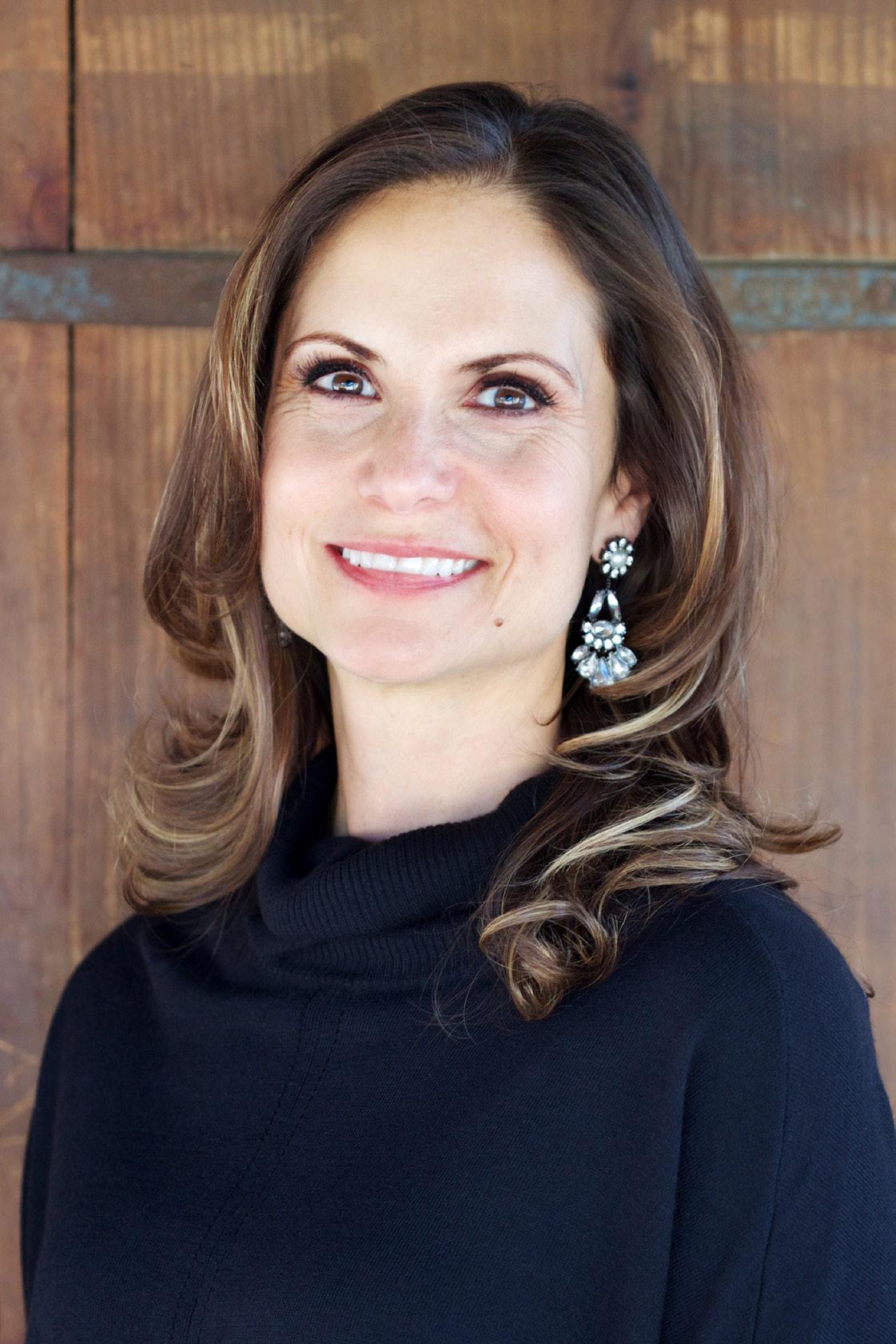
“With obvious exceptions, I’d like to think we’ve gotten past purposeful discrimination, but what we now need to focus on is unconscious bias,” Guzman explains. “The includes appreciating diversity and understanding perspectives and being mindful of the kind of language that we use.”
Ursula Guzman Associate General Counsel CoreLogic
Modern Counsel 51
Kinga Sarabia
Comfortable at Work and in Life
As a mother, Ursula Guzman has been called upon to help others at CoreLogic live and work more comfortably as both employees and parents. “I’m very upfront about the fact that I have children, and I don’t think anyone should be uncomfortable talking about their family responsibilities,” Guzman says. “I’m extremely lucky in the support that I get from my bosses, and I think everyone here should feel that same sort of support.”
Legal is working to partner with the learning and development department to build out its training modules so as to more actively reach employees where they are. “Training doesn’t just have to be one long webinar,” Guzman says. “There might be articles or podcasts; think smaller pieces that people are more apt to take on piece by piece.” The AGC says training after training can be handed down from HR, but she feels it’s her job to help figure out how to present it in a way that fits more palatably into the average workday.
The issue of diversity and inclusion goes much further at CoreLogic because of its international operations. “When we talk about unconscious bias and diversity, that means considering our whole global company,” Guzman says. “Our CEO was doing presentations that were occurring in the middle of the night in our Australian offices. Diversity means finding ways to make sure that the perspectives that our global community can provide are heard and respected.”
Guzman has since partnered with the Australian chief human resources officer to tackle these global diversity issues.
Digging Deeper
The CoreLogic Women’s Council was formed three years ago as a leadership development program for female executives. Guzman said the fantastic program was in need of a small but substantial tweak. “A lot of research shows that women in that first level of management are the ones who most often need support in rising in their organizations,” the AGC says. “We need to reach deeper into the organization to help build that next bench of female leaders.”
Implement 52
“A lot of research shows that women in that first level of management are the ones who most often need support in rising in their organizations.”
Another area that Guzman and her legal team are interested in exploring further involves environmental, social, and corporate governance and how legal can play a part in the build-out of these programs. “Shareholders want to see this, and it’s an area where all corporations should be looking to build and document these efforts.”
Finally, the AGC is excited by the prospect of taking wider D&I efforts to CoreLogic’s legal partners. “The legal team has talked about creating some guidelines and processes around getting more diversity from our law firms,” Guzman says. “If the clients demand it, the firms are going to provide it, and so what can we do to encourage that from the people who work for us?”




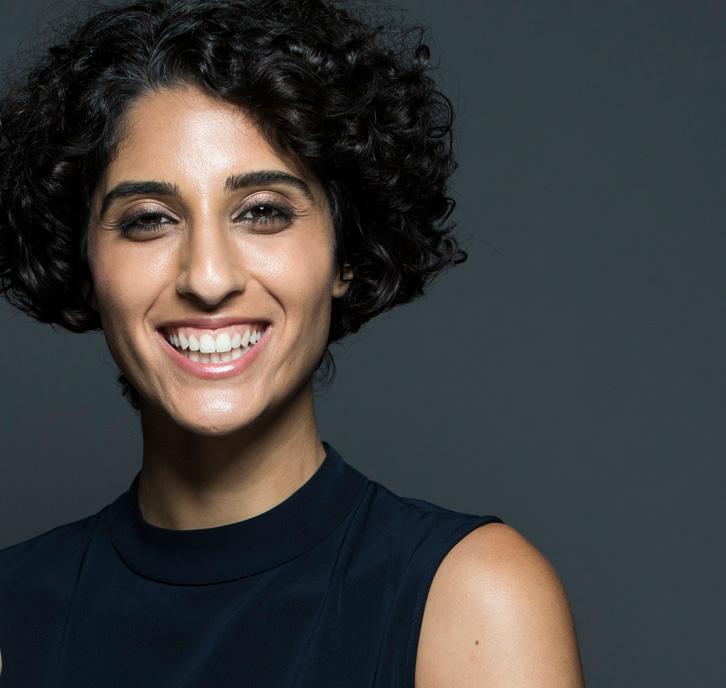
Guzman says there are successful models that can be followed, and she looks forward to legal’s continuing to help push for more voices and contributors to the conversation.


53 practices and industries offices globally Offices across continents Offices in countries, including the U.S. Fueled by Ingenuity. Inspired by you. 2050 Main Street | Suite 900 Irvine, CA 92614 | 949.705.3000 Licensed to practice in all U.S. states and Puerto Rico Littler attorneys Littler by the Numbers
Littler
Mendelson PC: “Ursula’s values-driven leadership epitomizes CoreLogic’s culture. We value our partnership with her and look forward to what we’ll accomplish together.”
–Fermin Llaguno, Shareholder
No Untapped Talent
Leela Mookerjee leads a lean, cohesive team at Life Storage, where she leverages the talents of team members and outside counsel alike
FOLLOWING A SUCCESSFUL RUN OF in-house positions at companies like GE and NBC, Leela Mookerjee has transitioned from being one of many lawyers to becoming one of six people in the legal department. Now vice president and corporate counsel of Life Storage, one of the world’s largest self-storage companies, Mookerjee knows the value of working closely with her team and outside counsel to unite a company stretched across North America.
By Sara Verdi
Mookerjee started her career in New York City. “After undergrad, a few of my friends and I moved to the city, where I had a job as a paralegal. This job cemented for me the fact that I wanted to be a lawyer,” Mookerjee says. So she returned to her hometown of Buffalo to pursue a law degree.
Implement 54
Leela Mookerjee VP and Corporate Counsel Life Storage

After completing law school and later collecting an LLM from Georgetown, Mookerjee returned to New York City. For a little while, she worked in international tax at Deloitte, but then she switched tracks to pick up some law firm experience. “I did the law firm thing for about five years, and it was like every other New York City law firm experience—late nights, screaming, all very transactional,” she jokes.
Following those five years, she knew it was time to move to an in-house position. At the time, her firm neighbored NBC within the Rockefeller Center buildings, which, for Mookerjee, was quite a fortuitous location. “NBC was right next door and I had always wanted to work there—and then suddenly, I had a job there. It was honestly a dream come true,” she recalls.
At the time, NBC, previously owned by GE, was acquired by Comcast, so her transition from performing hybrid tax and corporate work at NBC to becoming strictly a corporate lawyer at GE was relatively seamless.
“GE took me on, and at that point, I knew that I’d rather be a corporate lawyer than a tax lawyer, because as a tax lawyer, you can become pigeonholed within various sections of the code. You don’t end up seeing the bigger picture,” she explains.
Because of her tax experience, GE appointed Mookerjee as general counsel for the tax department, but following the 2008 financial crisis, GE underwent a colossal systemic restructuring. “They made the decision to get rid of their capital arm, and I worked on that unwind for about two years. At the end of the unwind, they decided to also unwind the tax department, and they subsequently sold the department to PwC,” she recounts.
Although Mookerjee did not necessarily have to leave GE and move to PwC with the tax department, she made the personal decision to do so to be close to her father, who was suffering from Parkinson’s disease at the time. “I wanted to be closer to my mom and dad, and because I could work from home with PwC, my family and I moved back to Buffalo,” she says.
Soon enough, Mookerjee was itching to be back in-house, which led to her current role at Life Storage as the first lawyer the company hired. The second lawyer was hired in spring 2020.
Mookerjee’s prior experiences varied dramatically, but none presented quite the challenges she now faces as the leader of a small legal team, composed of two lawyers and four paralegals.
“At NBC and GE, there are thousands of lawyers, paralegals, and systems in place, but at Life Storage it’s just a handful of us in the legal department. The main challenge that I have had to navigate is how to problem-solve with the team of paralegals or find the appropriate outside counsel,” she explains.
“Because Life Storage operates in twenty-nine different states and Canada, there are so many different legal codes to stay on top of. We have had to do a lot of reconnaissance and do a lot of things all by ourselves that I would normally outsource,” she says.
Steve Crainer
Modern Counsel 55
A MODERN SUCCESS STORY
Phillips Lytle congratulates Leela Mookerjee on her recognition by Modern Counsel. Our firm has firsthand experience with Ms. Mookerjee’s diverse talents, wealth of experience and visionary approach to projects. We’re proud to have her and Life Storage as part of our story, too.
While this seems like a huge undertaking, Mookerjee enjoys it, as she gets the opportunity to deal with new areas of law. “In self-storage, securing our tenants’ personal property stored in the units is our highest priority. That said, if the tenants become delinquent in their rent, that personal property is our only recourse for recovering past due rent. There are lien laws, which differ in all twenty-nine states and Canada, but that is a last resort. Our priority is to negotiate with the tenants to get them back their belongings,” Mookerjee says.
Additionally, Mookerjee says that she feels a unique sense of ownership in her role. “Here, the different jurisdictions feel cross-border, but it’s only two thousand employees versus three hundred thousand. You speak to people who are actually on the ground and at the facilities, and that feels more tangible,” she explains.
“There is more ownership here versus being on a deal with something like fifty other lawyers,” she continues. “Being on the Life Storage team has been amazing. It’s really wonderful to be working for an incredible organization and the head of its legal team, and I’m really proud of that.”
Prior results do not guarantee a future or similar outcome. © 2020 Phillips Lytle LLP PhillipsLytle.com ONE CANALSIDE, 125 MAIN STREET BUFFALO, NY 14203 (716) 847-8400 NEW YORK: ALBANY, BUFFALO, CHAUTAUQUA, GARDEN CITY, NEW YORK, ROCHESTER CLEVELAND, OH WASHINGTON, DC CANADA: WATERLOO REGION
PHL_08266 ModernCounsel_2-3x10-2Ad_mec.indd 1 5/15/20 3:30 PM
Phillips Lytle: “Problem solver. Visionary. Leader. Leela Mookerjee has risen to the top of her profession for good reason. She has an eye for pragmatic, effective solutions that make her the go-to person on every issue.”
–Frederick G. Attea, Senior Counsel
56
“You speak to people who are actually on the ground and at the facilities, and that feels more tangible.”
Feature
Taking a microscope to unique niches, specialties, regions, and regulations in the legal field and the high-profile lawyers who confidently and expertly navigate them
Introducing ten in-house attorneys who prove that effective leaders are driven by
Purpose
Purpose 58
Allison McDade, 7-Eleven, P60
Ryan Toteja, The Carlyle Group, P68
Theresa Conduah, dosist, P74
Eugene Kim, Webtoon, P78
Michael Dolce, Cohen Milstein Sellers & Toll, P84
Cristina de Dona, Hershey’s, P88
Steven Haber, Bloomberg, P92
Pooja Amin, CenterPoint Energy, P96
Adam Levitt, DiCello Levitt Gutzler, P100
Carolyn Greenwalt, Genstar Capital, P106
Modern Counsel 59
Oh, Thank Heaven . . .
As 7-Eleven’s first trademark counsel in more than twenty years, Allison McDade protects the company from people looking to cash in on a familiar name
By Paul Snyder
Photos by Gillian Fry
Purpose 60

Modern Counsel 61

Purpose 62
WHAT DRIVES ALLISON MCDADE
caption tktktktktktktkt
“What motivates me to keep moving forward, both professionally and personally, is to focus on what brings about progress and positive change. We are living through an unprecedented time where motivation for this kind of change seems high. As such, it’s a good time to revisit the advice that Sir Winston Churchill famously gave:
“‘We make a living by what we get. We make a life by what we give.’”
On Brand: Fast Facts about the 7-Eleven Enterprise
Although the 7-Eleven brand has been around for almost seventy-five years, the company itself is more than ninety years old. Its original name was Tote’m, and stores featured real Alaskan totem poles, which turned out to be the first-ever retail pole sign. The company invented that, along with coffee in to-go cups and 24/7 operations.
At any point in time, McDade notes, 7-Eleven averages five hundred active infringement cases that span the globe. Although the company does business in nineteen countries—it recently announced plans to open its first stores in India and Cambodia—and counts more than seventy thousand locations worldwide, she says the company’s trademark is protected in nearly one hundred countries. And 7-Eleven has about 2,500 pending applications and registrations for trademark protection.
Just because the company doesn’t do business in every country in the world doesn’t mean that there aren’t people in those other countries who will try to make a quick buck on such a recognizable name. One of McDade’s primary tasks—and challenges—is to decide which cases to pursue.
“There are all these different factors to consider when you decide which ones to pursue,” she says. “Do you operate in that country? How many locations are there? Is it the disco in Nepal or a 25-store chain in China that could easily explode to 125 next year? How similar are the goods being sold or services being offered?
“Each country is different, and our approach has to be tailored to that country,” she continues. “Is it a country where we operate or are planning to enter? How effective will a demand letter be? In India, for
Winnipeg is the Slurpee drink capital of the world, despite how cold it is.
The brand continues to grow: 7-Eleven is entering India and Cambodia, new countries for the company in 2020.
* More fun facts about 7-Eleven appear on page 222
63 Modern Couns el
Work-from-Home Chronicles As Told To Paul Snyder
I’ve been working from home for almost three years now. When I made the switch, it was a family decision—my husband works for Apple in field sales, so he can work anywhere. At the time, our three children were about to go into fifth grade, third grade, and kindergarten, respectively, and we thought it would be the only time we could make a voluntary move without sacrificing too much of their mental well-being. So we moved to a smaller town about four hours from Dallas, which is where 7-Eleven is headquartered.
With COVID-19, most of the work-from-home models that companies have been testing for the past few years are being proven—people are efficient, can get work done, and can be autonomous and productive. I was fortunate at the time that my boss already knew my work ethic and allowed me to work from home, even though it hadn’t really been done much in the company’s legal department.
With that said, I do think it’s important to check in, even if you’re not allowed to go to the office, as is the case under current shelter-inplace orders. Video calls are a fantastic way to stay in touch. Even just picking up the phone and talking to someone is helpful. In normal circumstances, I like to go into the office every couple of months to touch base with people and remind them that I’m still here and available for anything they might need.
You have to examine your own role, where you fit in the organization, and what kinds of responsibilities you have. Some employees may be better suited to working from home than others, but we have plenty of people in this world who are self-sufficient and driven. They will get their work done no matter what’s thrown at them. With almost everyone suddenly being thrown into a situation requiring them to work from home, we’ve seen companies can survive with this kind of working model.
example, we’ve had some good response to letters, but at the same time, people who are a little bit more savvy are aware that these cases can spend years in litigation if it gets to that.
“You have to investigate whether local law enforcement agencies might be able to intervene on your behalf. You don’t want to have the reputation as a brand owner of not following through with your threat or not taking action because then people figure it out, and word will spread.”
Interestingly, when McDade joined 7-Eleven in 2015, she was the first trademark lawyer to work at the company in more than twenty years. Prior to that, the company had retained an outside legal firm to handle trademark matters before establishing its own in-house position.
McDade had already done similar work protecting the products and brand name of Dell computers as its in-house counsel, and she says the transition into the 7-Eleven environment “couldn’t have been smoother.”

Purpose 64
Pull the lever on a Slurpee machine at a 7-Eleven anywhere in the world, and 7-Eleven’s iconic fizzy, frozen drink will pour out. Watch out for BrainFreeze (a term trademarked by 7-Eleven)!
“Because the company had used the same law firm the entire time, I didn’t have to go to multiple sources to get files or historical information,” McDade says. “A lot of people at our company have been there for decades because it’s a great place to work, so there was a lot of help if I had questions. But sometimes a legal issue—like a fifteen-yearold dispute in Georgia—is probably not something that will be in anybody’s memory except the lawyer who was handling it.”
McDade’s smooth transition to the in-house role at 7-Eleven comes as no surprise to her colleagues, who are familiar with her abilities. “Allison’s foresight, guidance, and hands-on approach has facilitated an efficient work environment for all. Her expertise and industriousness are unparalleled,” says Sanjay Chhabra, a senior partner and founding partner of Archer & Angel. “A consummate professional, her knowledge, sharp legal insights, and acumen are what make her 7-Eleven’s legal eagle.”
In the time since McDade joined the company, 7-Eleven’s footprint has grown by nearly twenty thousand stores, which gives her plenty of territory to protect. Nevertheless, she says it doesn’t seem like a tall order. If anything, it’s a task
Expertise Spotlight
Archer & Angel is proud of its long-standing relationship with Allison McDade and 7-Eleven. Archer & Angel is a full-service law firm advising on all aspects of law, including corporate commercial, intellectual property, labor and employment, M&A, insolvency, construction and real estate, litigation and arbitration, government policy and regulatory affairs, IT, franchising, retail and distribution, and anticorruption and compliance. Archer & Angel has offices in New Delhi, Bangalore, Mumbai, Hyderabad, and Pune, with Delhi being the principal office.
The firm’s intellectual property team advises on a range of legal issues involving trademarks, patents, domain disputes, copyrights, and industrial designs. The firm is capable of undertaking an entire spectrum of IP work, including prosecution, contentious, litigation, enforcement, dispute resolution, and customs/border protection.
Archer & Angel has been ranked continuously for the last two years by World Trademark Review in the WTR 1000 for its IP prosecution and strategy practice.
The firm assists clients, which include individuals and companies, both large and small, from India and around the world, in responding to constantly changing, increasingly complex domestic and international legal systems. The firm has a comprehensive legal base and an efficient team, which provides sound advice along with practical solutions in a time and cost-effective manner.
Modern Counsel 65
Congratulations to our friend Allison McDade of 7-Eleven, Inc. for this well-deserved recognition of her leadership and accomplishments.
Pirkey Barber is one of the largest firms in the United States exclusively practicing in the fields of trademark, copyright, and unfair competition law.


for which she feels a deep, longstanding connection. Some of her fondest childhood memories include her neighborhood 7-Eleven store. She would routinely ride her bike there with friends for a Slurpee drink and a treat. Once, she even posted a sign there for the family’s lost dog, which was found by neighbors who were rewarded with, you guessed it, a Slurpee drink.
“I grew up in the 1970s, and both my parents worked really hard,” McDade recalls. “They divorced when I was nine, and at that time, my mom had not had a job outside of the home. We moved and she began a career in advertising, which is how I became interested in trademark law—by osmosis. She was a copywriter on several different brands and would come home trying to think of ideas, slogans, and creative taglines. That was part of what I saw every day.”
She continues, “Of course, it was very difficult for her to be a thirty-five-year-old single parent with two children in a brand-new city. Looking back, I can appreciate how hard that must have been. I guess I was born with some of that natural resilience, stubbornness, and determination.”
That not only works to 7-Eleven’s advantage, but also provides fuel for McDade’s work ethic, as she says she now finds herself on the same team as some of the finest minds with whom she’s ever worked.
“As a big company, we are able to attract high-level talent, and I enjoy the fast-paced nature of working with my team and clients,” she says. “Everyone’s at the top of their game. Working in that kind of environment is really rewarding.”
AUSTIN | D.C. AREA
www.pirkeybarber.com
66
“As a big company, we are able to attract high-level talent, and I enjoy the fast-paced nature of working with my team and clients. Everyone’s at the top of their game.”











Advocates and Legal Consultants Archer & Angel congratulates Allison McDade on this well-deserved recognition. Allison, it is an honor and a pleasure to work with you in representing 7-Eleven, Inc. NEW DELHI | BANGALORE | MUMBAI | HYDERABAD | PUNE www.archerangel.com Freshfields Bruckhaus Deringer is a global law firm with a long-standing track record of successfully supporting the world's leading national and multinational corporations, financial institutions and governments on ground-breaking and business-critical mandates. www.freshfields.us The world’s
companies
on
Freshfields Bruckhaus Deringer US LLP
biggest
rely
us to help them make the right decisions in a fast-changing world.
A Different Point of View
Ryan Toteja grew up in three different cultures. His experiences sparked a passion for inclusion that he’s bringing to teams at the Carlyle Group and beyond.
By Zach Baliva
Purpose 68
With lavish garlands, bright saris, intricate henna patterns, extravagant canopies, and lively dances, South Asian weddings are memorable celebrations laden with elegance and beauty, even when they are held in the United States. In planning his own ceremony, Ryan Toteja fully capitalized on that fact. Knowing that the venue was interested in hosting more South Asian weddings, he allowed it to use photos of his wedding in its marketing materials in exchange for upgrades, price breaks, and other perks.
Toteja, who was born to Indian parents living in Nigeria, says negotiating is simply part of his culture. In fact, Indian shopkeepers are often disappointed if a client doesn’t attempt to apply a bit of charm in search of a better price. It’s not just a way to find a compromise. The process also helps form bonds and create relationships, as the two parties hash out a fair deal over a cup of tea.
Today, Toteja is principal and global head of fund formation at the Carlyle Group. He says his international background has given him a unique perspective—one he has leveraged in legal and business settings.
“Success in corporate America isn’t easy, and you can get a competitive edge
Ryan Toteja Principal and Global Head of Fund Formation The Carlyle Group
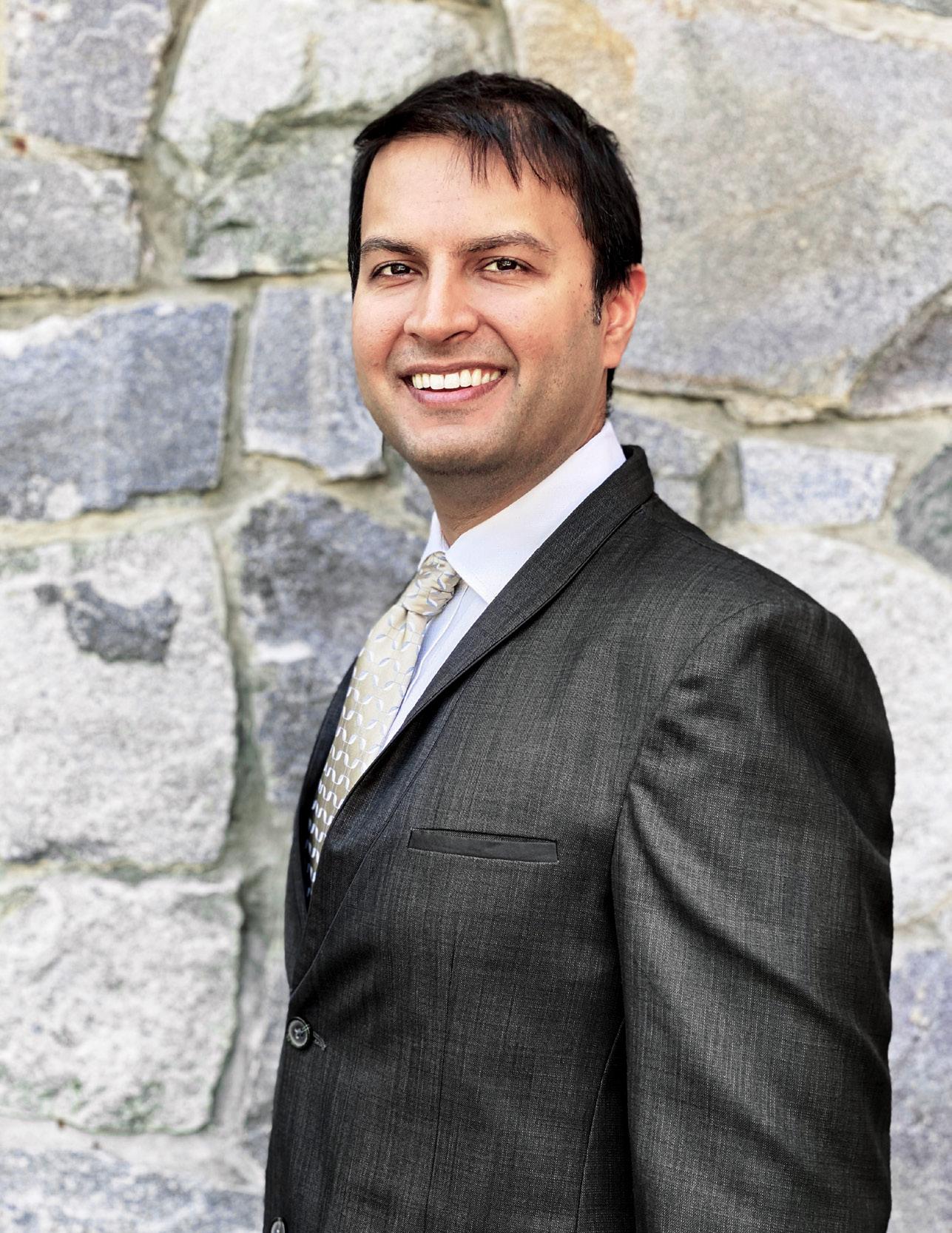
Modern Counsel 69
Monisha Toteja
Expertise Spotlight
Debevoise is a recognized leader in the private funds industry, having advised sponsors of, or investors in, more than 2,800 private investment funds with committed capital far exceeding $3 trillion. Guided by a driving commitment to client service, the firm’s investment management group advises a global roster of fund sponsors and institutional investors across all major investment strategies, covering organization and economic arrangements for sponsors, fund formation, downstream transactions, exits, firm and fund restructurings, buy-side work, secondaries, and wind downs. Clients choose Debevoise for its mastery of the private funds market, its exceptional service, and its focus on creative solutions. The team’s collaborative approach engages the firm’s entire range of talent and capabilities, creating a significant competitive advantage in anticipating and responding to market forces.
by properly observing subtle cultural nuances that often lead to communication problems or other misunderstandings,” he explains. A deep understanding of culture and different communication styles has helped Toteja excel at Carlyle, an investment company that is active in several countries worldwide.
Toteja grew up in a family of entrepreneurs whose businesses took them from Nigeria to India to the United States. He watched his parents sacrifice, capitalize on opportunities, and pursue their dreams. But the success came at a cost.
“I got made fun of for my Indian accent in America and my American accent in India,” Toteja recalls, adding that the experience taught him to overcome obstacles and adapt in all situations.
Although older Bollywood movies (in which lawyers wear uniformed robes) sparked an interest in the law, Toteja’s inherited entrepreneurial spirit also attracted him to business. He studied economics at the Wharton School of the University of Pennsylvania before enrolling at Columbia University School of Law. After starting off his career doing tax and real estate work at a New York law firm, Toteja joined the Carlyle Group in 2012.
As global head of fund formation, he oversees legal aspects of all funds for the international investment firm, which has more than $200 billion of assets managed in 392 asset vehicles. “I enjoy this hybrid role because I have to think about risk, how we should operate, and how to get to the right answer,” Toteja says. “It’s a great blend of law and business.”
The dynamic leader has not only made an indisputable contribution to Carlyle by applying his legal and business skills but has also made a permanent impact by advocating for diversity in hiring. In 2017, when Toteja transitioned to his current role, he had
Purpose 70
WHAT DRIVES RYAN TOTEJA
the opportunity to grow his department to its current size of seven individuals. Although he hoped to create a department of mixed races, ethnicities, and genders, he didn’t necessarily want to target diverse candidates.
“My goal was to make sure the pool we selected from was diverse and then pick the best person,” he explains. The process formed a department composed of three men and four women who cut across various ethnicities and countries of birth.
Toteja is happy with the results. “Introducing gender and ethnic diversity increases diversity of thought, and diversity of thought leads to better outcomes,” he says. “I’ve seen that play out many times in my personal life and in the workplace.”
Likewise, many of Carlyle’s outside counsel have seen the benefits of Toteja’s approach firsthand. “Ryan’s commitment to diversity shows up in our interactions with his team,” says Jonathan Adler, a partner at Debevoise & Plimpton. “He has created an environment where everyone’s ideas are valued and guided by a strong sense of purpose.”
A diverse legal team has helped Carlyle thrive, and now the firm is starting to export its value of diversity to its partners. In 2019, Toteja asked five external law firms
“I’m driven by both the type of work I do and the people I work with. I have a desire to excel, to be seen as a leader, and to have a hand in shaping the future of an organization. I am also motivated by working with smart, collegial, diverse, and fair people every day.”
Modern Counsel 71
“I enjoy this hybrid role because I have to think about risk, how we should operate, and how to get to the right answer. It’s a great blend of law and business.”
to complete the American Bar Association’s Model Diversity Survey. In 2020, Carlyle encouraged the participation of its twenty-five top external legal partners.

The practice has yielded some surprising results. Toteja discovered that more than half of one firm’s billings were attributed to female attorneys. Another firm asked Carlyle to assist in building a pipeline for attorneys of color who want to work in private equity. The request led to Toteja’s participation in an event through the Sponsors for Educational Opportunity Law Fellowship. This program, which offers talented incoming law school students of color the opportunity to work at a top law firm during the summer before law school, is designed to introduce these students to legal practice opportunities in the private equity industry.
Both Carlyle and Toteja’s legal team have grown since 2015. That’s when the company set a five-year fundraising goal of $100 billion, which it surpassed by the end of 2019. In the same era, Toteja built a highperforming and diverse team of in-house legal experts. The move has allowed him to get more involved in strategy and new product development. Carlyle is actively looking at new products, lines, and funds, and Toteja is free to do what he does best: negotiate.
clearygottlieb.com
We are proud to work with Ryan Toteja and congratulate him on his recognition by Modern Counsel
Cleary Gottlieb Steen & Hamilton LLP:
“Ryan is an exceptional lawyer and a leader in the private equity industry. We value our long-standing relationship with him, including as a Cleary alumnus, and are proud of his accomplishments.”
–Robert Raymond, Partner
72
“Introducing gender and ethnic diversity increases diversity of thought, and diversity of thought leads to better outcomes.”

We join in recognizing Ryan Toteja’s exceptional leadership and steadfast dedication to diversity and inclusion at Carlyle. debevoise.com
Stay Centered and Move Forward
The best advice IP specialist and innovation aficionado Theresa Conduah has ever received has shepherded her through adversity of all kinds
By Billy Yost
Purpose 74
It’s one thing to overcome adversity. That’s a job requirement routinely asked of all lawyers. But it’s something else entirely to be motivated by it.
“As an IP attorney, I frequently have access to the most technologically advanced products and services,” says IP specialist Theresa Conduah. “People are sometimes surprised to find out that growing up, I didn’t always have access to running water.”

Born in Ghana in West Africa, Conduah faced adversity merely by her place of birth. Growing up in primarily rural environments, Conduah’s family would eventually make their way to New York, but her passion for innovation and rising to every occasion was already burning inside her.
The IP lawyer’s latest challenge brought her to the burgeoning cannabis industry as VP of IP at dosist. “Someone already said it best, but I love the expression,” Conduah relates. “The current state of the cannabis industry is a lot like trying to fly a plane while building it at the same time. You have to build on what you know in the ‘normal IP world,’ but at the same time, this isn’t it. It’s kind of like the Wild West.”
Meeting Adversity Head-On
Prior to dosist, Conduah operated in a number of more traditional roles. Her initial firm work found her longing to be more than just a last-minute panicked call as outside counsel.
“It felt so much more natural for me to be part of a larger decision-making
Handal Murat Modern Counsel 75
Theresa Conduah VP of IP dosist
process,” Conduah explains. “I wanted to be part of the business team as opposed to the anxiety and fear that comes attached with the idea of ‘legal being called in.’” Conduah wanted to be part of the conversation from day one, not called in two years down the line to put out fires.
Unfortunately, Conduah’s early firm years would also include her greatest personal challenge. Not one, but both of her parents were diagnosed with cancer at the same time. Firm Alston Bird was supportive of the lawyer moving to North Carolina to attend to her family. Her mother’s treatment was unsuccessful, but her father managed to come out on the other side of his treatment journey.
Conduah’s mother, a holistic health and wellness nurse practitioner in Ghana, still passed on a strong legacy. Half of Conduah’s family are frontline healthcare workers. It’s a fitting tribute to a mother who sought more opportunities for her family.
Part of a Bigger Solution
It was also time for Conduah to answer her own professional call to be part of a team and go in-house. Conduah came to United Airlines to begin working for a single client for the first time. The lawyer was the first ever IP attorney at the airline and established the license and intellectual property program. In a move maybe just as important to her, Conduah widely expanded United’s pro bono program. She thus allowed attorneys to take on larger and more meaningful cases, including the countless number of undocumented workers facing expulsion from the United States.
“That was one of the things I truly loved about United,” Conduah says. “It was their support and commitment to community service—something I’m obviously passionate about, having emigrated to the United States myself.” The pro bono program would go on to receive the American Bar Association’s Pro Bono Publico Award.
Building a Different Plane
After departing from United and spending three years as managing counsel at Toyota, Conduah decided to try her hand at a much riskier proposition: the cannabis industry. “I like to say that my personality is comfortable feeling uncomfortable,” Conduah says, laughing.
WHAT DRIVES THERESA CONDUAH
“Feeding my curiosity is what drives me. I am curious by nature and am always seeking out opportunities to learn, grow, and become more capable. This holds true in my personal and professional life—whether it’s traveling and learning about different cultures or learning a new skill set. Connecting my natural curiosity to a career that allows me to continue to learn has been the perfect fit.”
“What keeps me excited and motivated is trying to solve a puzzle when you’re not sure if all the pieces are even there. You may have to find a new way to solve it because this industry just doesn’t have those cookie-cutter solutions yet.”
With the cannabis industry, it seems as though rules are being created as the industry rolls along. State and local regulations are often at odds with those at the federal level. “There are so few rules and guidelines that apply to this space, so it’s exciting to be here at this time, but it’s also scary as you go about your day-today,” Conduah says. It requires constant collaboration among the in-house legal team, as IP and compliance issues may fall squarely on opposite sides of the spectrum and need to be more uniformly addressed.
Purpose 76
“What keeps me excited and motivated is trying to solve a puzzle when you’re not sure if all the pieces are even there.”
Even at her most challenging moments, Conduah, a yoga practitioner, stays centered with a message from her teacher that pops in her mind almost daily. “I remember she said, ‘Don’t panic and use your core,’” Conduah recalls. “You can take that literally, but I really do just try to stay calm and use the skill sets I’ve developed to move through whatever challenge I’m facing. Nothing in the technological world is ever clear-cut, so I just stay centered and move forward.”
77
The Outsider in All of Us
Eugene Kim has been an outsider his entire life, but he has found a home among misfits as the general counsel at Webtoon
By Billy Yost
Purpose 78
General
Webtoon may be a name unfamiliar to most, but to its users, it’s absolutely everything. The publishing portal, launched by parent company Naver in South Korea in 2004, is the home for easily read, quickly digested, vertically scrolling webcomics (think comics made for smartphone storytelling).
Webtoon has become a cultural phenomenon, averaging more than ten million monthly users in the United States and more than sixty-five million monthly users globally. It serves as a platform both for creators to display their work and committed readers to find new stories of misfits, outsiders, and complex individuals encountering hardship. It’s a theme that’s present in virtually every series on the app.
The home for outsiders is, appropriately, also the home for General Counsel Eugene Kim, who is the definition of the word in every sense. Kim was born in the United States, raised in South Korea, and later moved back to the States, then back to Korea, then back to the States. Not to mention that he earned his law degree in Toronto.
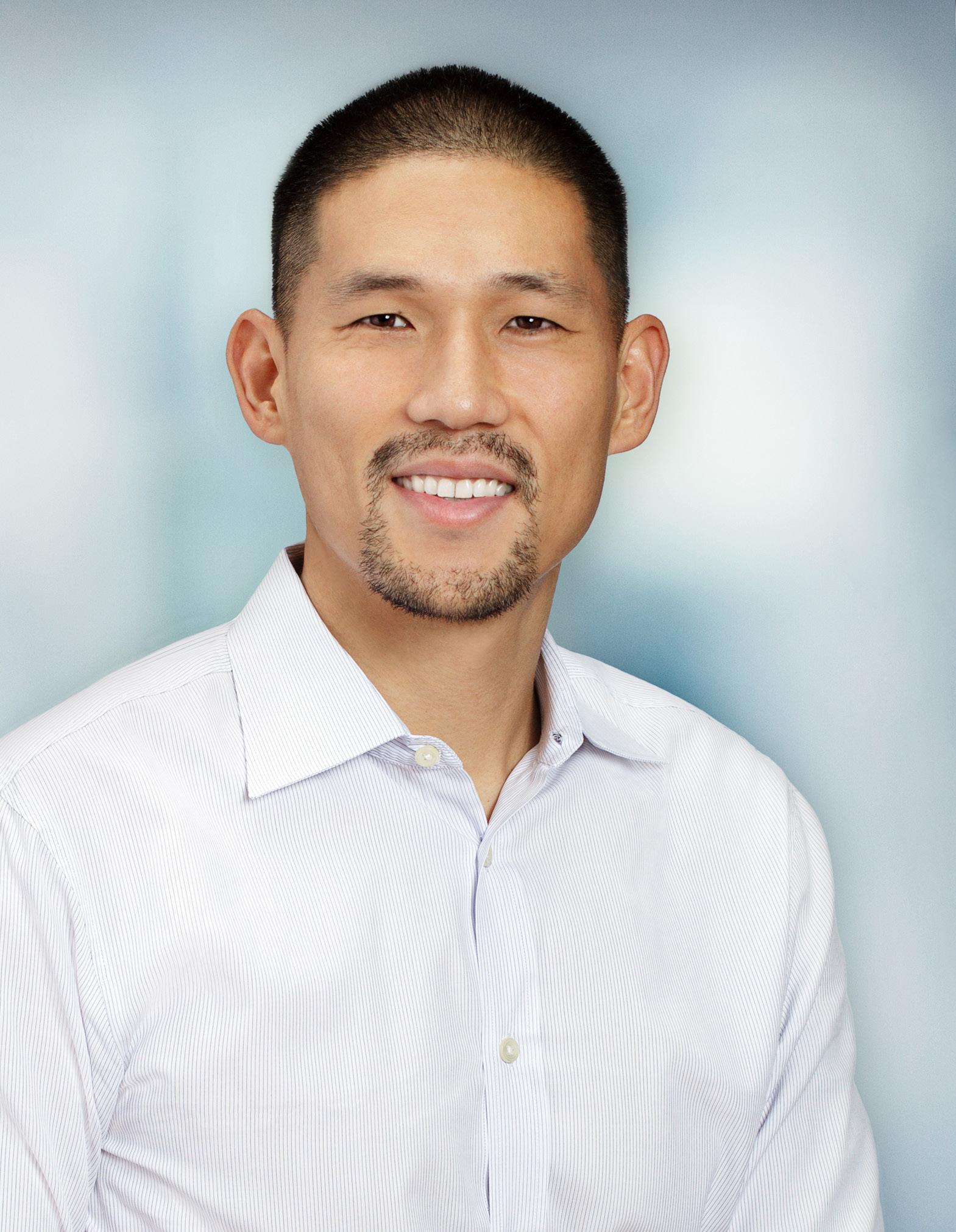
Modern Counsel 79
Eugene Kim
Counsel Webtoon Tashia R. Peterman
Expertise Spotlight
Thomson Reuters has been providing attorneys with the tools to thrive for more than one hundred years. More than 85 percent of the Am Law 200 and thousands of top corporate law departments rely on our industry-leading products and services every day. Our research platforms, editorial expertise, legal operations solutions, and reference materials provide the trusted answers you need in today’s rapidly evolving legal landscape. Thomson Reuters solutions for corporate legal departments of all sizes include Practical Law Connect, the most trusted know-how solution for working attorneys; Westlaw Edge, the AI-powered gold standard in legal research; and powerful legal operations platforms including HighQ and Legal Tracker.
“This may be a little hard to follow, so stay with me,” Kim says, laughing, as he attempts to explain his journey. He’s told the story again and again over the years. Everywhere Kim has lived, he’s been “from somewhere else.” But at Webtoon, so is everyone else.
There and Back Again
Kim spent his first six years in California before his parents moved back to South Korea. His schooling from kindergarten to fifth grade was entirely Korean based. He was then sent to live with an aunt in Orange County in the States for sixth grade, but because she was already taking care of three children of her own as well as Kim’s older brother, it was decided Kim should return to Korea.
“So after suddenly going from a purely Korean school in fifth grade to classes in English in the States, now I was returning to Korea to attend an international (English) school,” Kim remembers.
“It was mostly Korean Americans living in Korea, and it was such a weird dynamic. We were living in Korea but attending a US-based English school, and, to the larger society, we were considered foreigners.” By the time Kim was in eighth grade, the Kim family decided to move back to the States for good.
“In every one of those pockets, I didn’t quite fit in,” Kim says. “Moving back and forth and encountering all these different subcultures shaped me to be kind of a misfit. But it also allowed me to develop the skill set of being able to bridge cultures and quickly adapt to changing circumstances.”
Purpose 80
That adaptation would be further put to the test when, after completing school at UCLA, Kim moved with his soon-to-be wife back to her home country of Canada. Subsequently, he pursued his legal degree at Osgoode Hall Law School in Toronto. “When we moved back to the States after law school, I felt like an outsider yet again, because in the California legal community, my contacts, the school I went to, and the firm I worked in were off everyone’s radar,” Kim says.
A New Toon
Kim’s first in-house legal experience came at a Fortune 100 company, a massive information technology distributor where Kim was part of a large legal team. “I was extremely fortunate to land this opportunity where I got to work on high-stakes matters as a junior attorney, and I had great mentors who taught me how to do things the right way. It was truly the best of the best places to learn,” Kim says. “I learned so much, but there were also some things about working at such a large company that were challenging.”
For one, Kim would often be working on such large-scale global projects that it was difficult to see the full picture of what he was working on.
“As a junior lawyer, you’re often given a very small piece of the larger pie,” Kim explains. “You don’t always get to see how your work is contributing to the larger goals of the company, nor do you always get to see projects through to their completion.” For his next role, Kim
WHAT DRIVES EUGENE KIM
difficult to articulate one single source of what drives me, but I would say my kids are my primary source of motivation and drive. I want to make sure that when they’re older, they can be proud of their dad, in the way I’ve conducted myself professionally as well as personally. I want to be the same person in front of them as I am with everyone else. Integrity is key.”
hoped he could take on more responsibilities, such as managing deals from start to finish and interacting with opposing counsel.
What Kim wasn’t looking for was a company where he would lead with his Korean heritage. But then the Webtoon position came on Kim’s radar.
“I was looking to be part of a smaller company with maybe a single lawyer position, and this fit that opportunity,” Kim says. “I also thought that because of my experience living in Korea, I had a unique understanding of the culture and could understand the cultural nuances of communication that might otherwise be misinterpreted.” The position was Kim’s, but he didn’t know just how much of a new challenge he had bitten off.
Modern Counsel 81
“It’s
Sink or Swim
The characteristic that has made Kim a unique and ideally suited candidate for his role at Webtoon is not one someone might expect to hear from a successful GC. “I would generally describe myself as an easygoing, go-with-the-flow type of person,” Kim says. “I don’t tend to seek change, I think, because of having gone through so many changes and transitions for so long.”
The paradox, though, is that in change, Kim tends to thrive. His adaptation, well honed by years of constant nation hopping, relies on instincts that the GC may not love to employ but are there just the same. And they helped a first-time GC take on a job that, with reflection, he’s not sure he ever would have truly been ready for.
“I’ve learned more in the last two years than ever before,” Kim says. “I’ve just had to roll up my sleeves and make decisions, because I don’t have a legal boss to rely on or report to. I’ve had to learn to trust my instinct and provide the best possible advice, and it’s given me the confidence to rely on my skills from the past seven or eight years.”
“I am so thankful that Thomson Reuters has played a part in Eugene’s journey,” says Travis Nelson, an account executive at Thomson Reuters. “Eugene is a problem-solver and has worked to build strategic best practices to ease his day-to-day. We’re glad he’s found our legal solutions to be part of the necessary tools to make quick, confident decisions.”
Since Kim started with Webtoon in the fall of 2018, his legal team has grown from a team of one to a team of four. His responsibilities continue to expand, as Naver is currently in the process of reorganizing the global Webtoon business. The restructure will make Kim’s US office the new global headquarters as the company plans to expand into more countries throughout Europe and Latin America.
Kim says the culture at Webtoon has aided him in his approach and the steep learning curve he has experienced. “The people who work here find a unique culture and community that’s built into the DNA of the company,” Kim says. “On our platform, you’ll find so many stories that may not fit the traditional mainstream norms, and I think the same is true of our staff. Many of us have spent parts of our lives not really feeling like we fit in, and our company embraces that.”
Purpose 82
“The people who work here find a unique culture and community that’s built into the DNA of the company.”
Practical Law Connect™ Legal Tracker™ Westlaw Edge™ HighQ® Contract Express Innovation and technology that legal professionals depend on. Visit us at TR.com/ModernCounsel We honor Eugene Kim’s commitment to excellence Thomson Reuters recognizes solo GC, Eugene Kim of Webtoon, for his “roll up your sleeves” attitude and commitment to excellence in corporate law. We’re honored that he relies on Thomson Reuters Legal Solutions to help drive quick, confident answers. © 2020 Thomson Reuters TR1091513-5/20-DGM
Telling Their Stories
Michael Dolce of Cohen Milstein Sellers & Toll brings justice to sexual abuse survivors. To change Florida’s statute of limitations in abuse cases, he had to tell another story—his own.
By Zach Baliva
Purpose 84
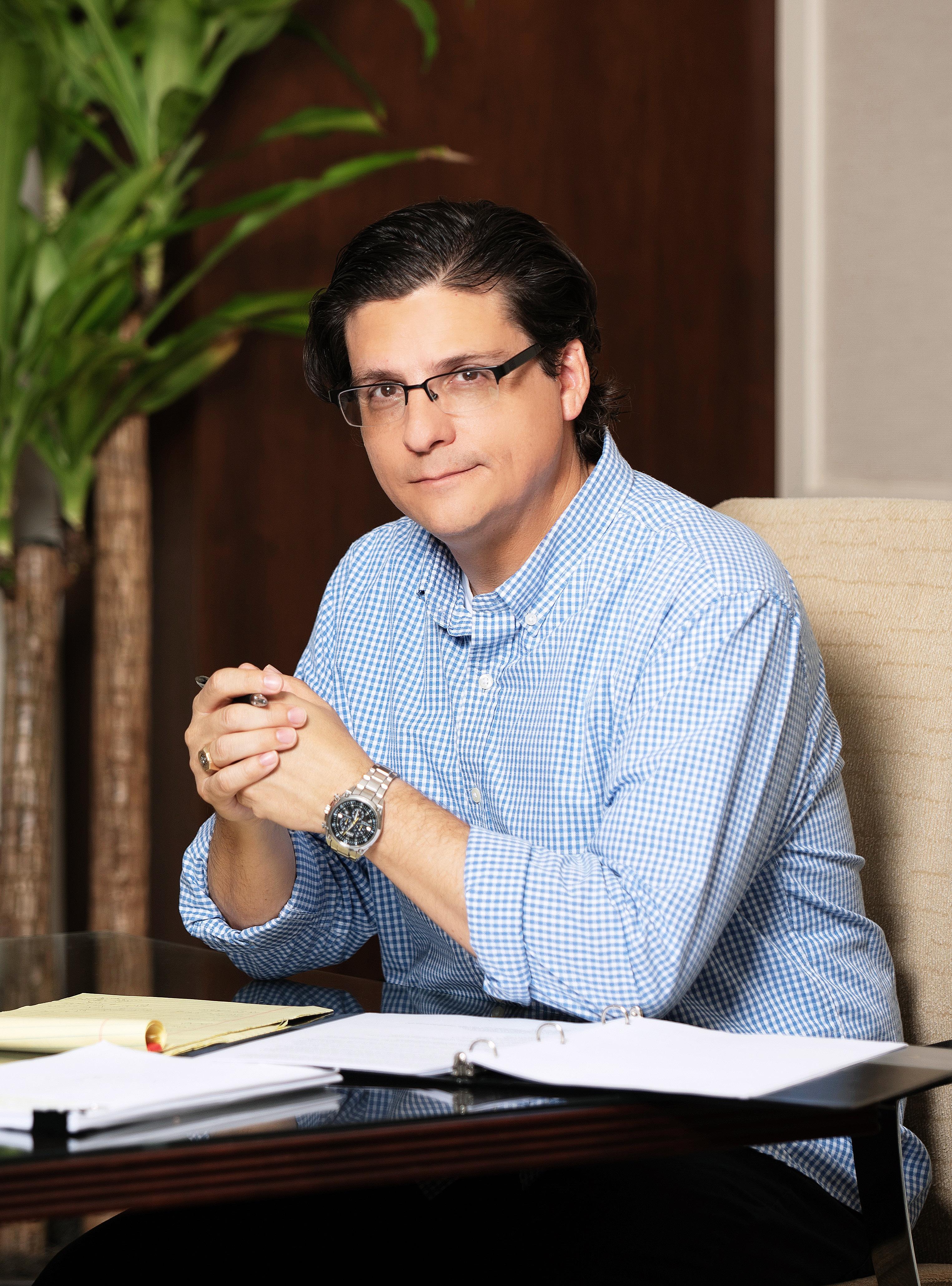 Michael Dolce Partner Cohen Milstein Sellers & Toll
Michael Dolce Partner Cohen Milstein Sellers & Toll
Modern Counsel 85
Tracey Benson
It’s a sunny day in Florida, and Michael Dolce is on his way to meet with a new client. He drives with the convertible top down and the radio volume up. For Dolce, this is therapy. A way to clear his head.
He knows what his first question to the client will be, and he knows the likely response. He’ll ask what the client hopes to get out of the case. And the client will say they want to prevent what they experienced from happening to anyone else.
Dolce, a partner at Cohen Milstein Sellers & Toll, has spent the last twentyfive-plus years representing adult and child survivors of sexual abuse. “This is hard work,” he says. “But we do it because we can achieve financial recovery so our clients can get the help they need.”
During his time at Stetson University College of Law, Dolce spent twenty hours a week in the legal aid office, where he interviewed domestic abuse survivors. He met dozens of victims, heard their stories, and developed increasing compassion for their experiences. Upon graduation, Dolce settled into private practice. While he took a variety of cases, his desire to help abuse survivors never dimmed.
A 2004 meeting with Patty Robinson changed Dolce’s life and career forever. Although Robinson’s son, Jeff, had been abused by a karate instructor, the boy didn’t immediately come forward. That’s not uncommon. Research shows the average delay in disclosure for child victims is fifteen years. Florida’s statute provided just four. By the time Jeff was
WHAT DRIVES MICHAEL DOLCE
“I want to forget being bound and raped before I was old enough to know what that word meant. But the memories don’t fade.
“Representing other survivors means facing the pain in their eyes that is mine too. It means enduring anger daily at politicians, family members, judges, police—so many who lack the empathy to help. But I persist to imprison abusers and punish their enablers. I persist to deliver my clients into healing care. I persist so my fellow survivors are not alone. I persist with the hope that I can spare at least one child this horror.”
ready to tell his story, it was too late. Distraught, Jeff took his own life.
“Patty asked me to make sure her son didn’t die in vain because the courthouse doors were locked,” Dolce recalls.
“I told her I would fight to change the law in Florida.” He set out to deliver on his word and convinced Senator Skip Campbell to sponsor a bill that would extend the time limit for filing charges.
To prevail, Dolce decided to disclose his own story of abuse. When Dolce was seven, he fell off his bicycle and sought help from a neighbor. He found a predator instead. That neighbor took Dolce into his basement, restrained him, and sexually abused him at gunpoint with the help of a teenage son. Under threat of death, Dolce returned several times. Like many of his clients, Dolce was too traumatized to report the experience to his parents or the police.
Dolce broke his lifelong silence before the Florida legislature in 2004. The rising lawyer, who had once worked in the statehouse, revealed his story to a room full of reporters, lobbyists, staffers, and lawmakers he knew well. He gripped the podium as he spoke.
What Dolce thought would be a quick process turned into a prolonged battle. He faced skepticism from lawmakers who thought the original statute was sufficient and
86 Purpos e
coordinated opposition from the Roman Catholic church, the insurance industry, and criminal defense lawyer associations. Undeterred, Dolce introduced bill after bill and formed a large grassroots political action committee. Finally, in 2010, after a six-year ordeal, the Florida House and Senate passed House Bill 525 (HB 525) to repeal the state’s statute of limitations for lawsuits regarding sexual abuse and criminal prosecution of those cases.
As Dolce fought for HB 525, he attracted and accepted more abuse cases. Today, he exclusively represents sex crime survivors and victims of domestic violence. Seventy-five percent of his clients are younger than eighteen. A growing number are very young children. Meeting criminal and civil burdens of proof is especially challenging because abuse cases often lack the DNA evidence or eyewitnesses that police and prosecutors expect.
“We fight a fight that can often lead to a disappointing end, but we still have to fight it because what happened to our clients cannot be allowed to continue,” Dolce says.
The support of a large firm helps. Dolce can take advantage of expertise from other partners as he builds a case. Usually, though, he works with his own small team, which includes a former prosecutor, two paralegals, an intake coordinator, and a legal assistant. Together, they advocate for hurting and vulnerable clients.
A few special rules help them cope with the dark nature of their work. “In our corner of the office, you’re likely to hear
profanity, yelling, or crying,” Dolce says. “We have to find healthy ways to express anger and disgust. A lawyer who wants to take something inhumane and sterilize it or make it academic won’t survive for very long.”
In addition to taking long drives in his convertible, Dolce sees a therapist at least once a week. He tries to focus his anger and energy on the positive outcomes he can achieve for his clients.
Those positive outcomes have been many. Dolce and his team win large financial returns and multimillion-dollar settlements that their clients use to access healthcare and mental health services. They help send predators to jail, reopen closed cases, influence state laws and public discourse, and target institutions that enable repeated cycles of abuse.
In 2017, Dolce settled an abuse lawsuit for $880,000 after an adult survivor recounted previously repressed memories of childhood abuse. The next year, he recovered $4.6 million for an adult survivor of sexual abuse whose father molested her over a ten-year period. The survivor’s mother was found negligent as well. He has also brought successful civil suits against group homes and other childcare facilities where chronic abuse occurred.
Anyone who talks to Dolce about his work will notice his sincerity. He’s straightforward but warm. He pauses to wipe away tears or quickly respond to a client’s text message. He’s poured every bit of himself into this work for more than twenty-five years—and he’s not about to stop.
Modern Counsel 87
“We fight a fight that can often lead to a disappointing end, but we still have to fight it because what happened to our clients cannot be allowed to continue.”
Sweetening the Deal
Cristina de Dona of Hershey’s discusses her substantive international experience and what she’s learned from working for two famous chocolatiers
By Sara Verdi
Purpose 88
From a very early age, Cristina de D ona had a strong sense of justice. She attributes that quality to her family. “My grandfather was a judge, and what he did was very important to me when I considered what I wanted to be when I grew up. It was clear to me from the start that I should be a lawyer,” de Dona says with a laugh.
Pursuing a career in law satisfied both de Dona’s sense of justice and her desire to help others. “As a lawyer, you can help people in many different ways—for example, sharing knowledge or giving people the opportunity to achieve the things that they want to achieve,” she says.
After completing her undergraduate degree in international law in her home country of Italy, de Dona moved to Germany to pursue her PhD in international law. Rounding off her international educational experience, de Dona completed an EMBA at London Business School.
Her multicultural experience didn’t end with her education; de Dona’s professional career is just as diverse. She began her legal career journey at Interpol, the international crime-fighting organization based out of Lyon, France. Following that, de Dona worked for the United Nations Interregional Crime and Justice Research Institute.

“I have always worked on a multinational team. Diversity in terms of industries, practices, roles, and people is the cornerstone of my vision for life and the recipe that has enabled me to achieve successful results in both my work and personal experience,” de Dona says.
In 2004, de Dona hit a turning point in her career when she met Michele Ferrero, whose company was looking for a special lawyer. “Working with a genius
Cristina de Dona Chief Counsel, International Hershey’s
The Pull of the Ocean
In addition to fulfilling her childhood dreams of practicing law, Cristina loves to maintain another childhood passion of hers: surfing. “I started surfing at the age of eleven. I used to go on holiday with my family in Sardinia, and my friends taught me how to surf there,” she says. “The ocean has always attracted me because of its unpredictability and simultaneous calming nature. It sparks something really spiritual inside me.”
Modern Counsel 89
Courtesy of The Hershey Company
like Michele Ferrero is not common, and I got the chance to work for him and a very complex company. This work experience provided an important opportunity to grow both professionally and personally,” de Dona says.
Ferrero served as a great influence in de Dona’s life, and she looks back at her time with him as incredibly special and formative. “Mr. Michele was not only a visionary and genius entrepreneur; he was a giver. He was widely regarded as a benevolent employer who granted his employees generous benefits, and he had a wonderful way of making you feel like the most important person in the world,” de Dona says of Ferrero.
In addition to his warm personality and generous tendencies, Ferrero’s work ethic left an impression on de Dona, serving as a benchmark for how she would approach strategy in her future roles. “I remember his professional and ethical discipline specifically. Every morning from 7 a.m. until 7 p.m., I would meet with him in Monte Carlo. We focused on testing and helping design new products, understanding consumer behaviors, and adapting legal strategies to the different products and markets. These were life lessons that I will never forget,” de Dona says.
Her current role, also with a world-famous chocolatier, is not too far off from her role at Ferrero. She now serves as chief counsel, international, for Hershey’s. She was drawn to Hershey’s because of its strong leadership team, including Hershey’s globally minded president and CEO; its family-based values and origins; its philanthropic arm; and its international presence.
“At Hershey’s, I am responsible for supporting all countries internationally except for the United States. In this position, it is more than just being a lawyer and dealing with contracts. There is the responsibility to support the legal staff, to build relationships that can leverage business or contacts for the company,” de Dona explains.
Challenges often arise in the course of de Dona’s work, as might be expected when dealing with legal matters across different countries and cultures as well as working with outside counsel. Thanks to her broad range of international experience and assistance from Venable, a business-savvy firm that is equipped to advise and consult in these types of legal matters, de Dona meets these challenges with agility and ingenuity.
WHAT DRIVES CRISTINA DE DONA
‘’A deep desire for learning. This really makes a big part of what drives me. When I am looking for opportunities to improve, to grow, and to become more capable, it all comes down to learning and seeking out new challenges for my professional and personal growth.
“Whenever life gives me a chance to learn something new, to experience something I never did, or to face new challenges, that is the moment I can fully express who I am: my curiosity is the essence of my personality. One of my most profound beliefs is that life is a constant learning process. Learning also implies being ready to fail and to start over again: when trying new things, failure is part of the game. As Michael Jordan used to say, the key to success is failure.’’
Alexei Cowett, a partner at Venable who works closely with Hershey’s on domestic and cross-border corporate transactions, notes how she rises to the challenge. “Cristina is extraordinarily knowledgeable about the food space and has an incredible ‘can do’ attitude. Her extensive global experience and business and legal acumen set her apart from others. She excels at helping Hershey’s create more ‘moments of goodness,’” he says.
“Managing outside counsel is difficult when you are managing issues across various jurisdictions,” de Dona notes. “No one counsel can generally assist you with every country, or indeed every possible legal issue, so a knowledge and record of the counsel’s strong points is critical. This way, you can reach out to the most appropriate counsel depending on the issue presented and the potential jurisdiction. In essence, you are respon-
Purpose 90
sible for triaging the problem and finding the most cost- and time-efficient resolution.
“Managing cross-cultural issues also means understanding the culture that the firm operates in,” de Dona continues. “There are language barriers and cultural differences, so making sure you understand these is important. Being very clear in all communications and picking up the phone to talk to each other is sometimes the best way to ensure there is no breakdown in communication.”
Modern Counsel in honoring Cristina de Dona and The Hershey Company.
WilmerHale provides legal representation across a comprehensive range of practice areas that are critical to the success of our clients.

We applaud Cristina de Dona’s leadership and vision and are proud to support her work on behalf of The Hershey Company.
wilmerhale.com
© 2020 Wilmer Cutler Pickering Hale and Dorr llp
Attorney Advertising
WilmerHale joins
91
“Being very clear in all communications and picking up the phone to talk to each other is sometimes the best way to ensure there is no breakdown in communication.”
The Art of the Deposition
Steven Haber’s keen eye for detail has been essential to his work as Bloomberg’s global litigation manager
By Keith Loria
Purpose 92
As the global litigation manager for Bloomberg, Steven Haber oversees the litigation docket for the renowned financial tech, data, and media company founded by Michael Bloomberg. But that’s only part of what his job entails. In addition to overseeing litigation matters, he offers his insights during prelitigation disputes and discussions with transactional lawyers.
His background includes working as managing director and head of litigation for the Americas at Deutsche Bank as well as a decade at the United States Attorney’s Office for the Southern District of New York. These experiences have provided him with exceptional skills in numerous areas, including depositions.
“The first time I took a deposition was actually the first time I ever saw a deposition,” Haber notes. “I had clerked for two years for a district court judge, and then I went to the US Attorney’s Office for the Southern District of New York in the Civil Division, where they handed you a bunch of cases and you went out and litigated them.”

Since then, Haber has done much more learning by doing, always building on his lawyerly skill set.
“You have to give some thought to, ‘What’s the order in which I want to ask the questions?’” Haber explains. “Sometimes you do that chronologically, starting at the beginning and going to the end.
Sometimes, if you have a particularly sensitive area, you may want to put that up front, before a witness gets comfortable with the process.”
BCFC/Shutterstock.com Modern Counsel 93
The Case of a Lifetime
Steven Haber has worked many cases throughout his career, but there is one that particularly stands out.
His parents were Holocaust survivors who came to the United States as displaced persons following World War II and met when they were both living in New York.
While at the US Attorney’s Office, Haber worked on a case that led to the denaturalization of a Nazi, Jakob (Jack) Reimer, who was found living in New York State by the Office of Special Investigations in Washington.
“When those people were found, the Department of Justice proceeded against them in the first instance, to denaturalize them,” Haber explains. “They had become naturalized citizens on the basis of these applications that omitted any reference to their wartime activities, which showed they had assisted in the persecution of Jews and other groups during the war. If the government could prove those misrepresentations, the individual would lose their naturalized status as a US citizen.”
The next step was a deportation proceeding, which today is known as a removal proceeding. Haber was assigned to the denaturalization case against Reimer, and it went to trial.
Ultimately, it was determined that Reimer had actively participated in the liquidation of three Jewish ghettos during the war and also assisted the SS by shooting at a Jewish prisoner. He was denaturalized and later ordered deported.
Years later, Haber expressed the influence that case had on him in an answer to a law school reunion survey question. “I said, ‘If the only thing I did in my legal career was this case, that would have been enough,’” he remembers. “‘The fact that I was able to participate in this case and help obtain this result is really my proudest moment as a lawyer.’”
Essential to Haber’s success is going through the record with a fine-tooth comb and knowing a case’s documents backward and forward.
“What really works for me is spending the time going through the record and making sure I understand it so well that, when I’m asking questions of a witness, I have a pretty good idea of what the answers are likely to be,” he remarks. That way, “I’ve also figured out what the soft spots are.”
For example, in one case at the US Attorney’s Office, he studied a permission slip that a federal employee produced in discovery that purportedly showed the person was authorized to be absent from work at a specific time.
“Looking closely at it and comparing it to other permission slips in the record, you could see it looked like he basically cut and pasted a signature block of his supervisor onto the permission slip,” Haber recalls. “That was an instance where I actually started off the deposition, after introducing myself, with that document— in preliminaries. The lawyer then dropped out of the case, and we ultimately ended up with a favorable resolution.”
Haber’s practiced approach to taking depositions stems in part from his time with the US Attorney’s Office, where he handled cases to completion.
“There’s nothing like working a case from beginning to end to teach you
Purpose 94
WHAT DRIVES STEVEN HABER
“I spent the first twelve years of my legal career working in the public sector. The events of the past few years (and even more so the events since March 2020) have heightened my desire to give back as I approach the tail end of my work as a litigator.
“After spending twenty years in the private sector, I will be devoting at least 50 percent of my time going forward to working on pro bono matters. Now, more than ever, I think the legal community should be doing all it can to help out those in need.”
the importance of taking a thorough deposition,” Haber shares.
At Bloomberg, Haber is active in the company’s pro bono program. In 2019, after winning awards from the City Bar Justice Center, the New York Law Journal, and the Lawyers Alliance for New York, Bloomberg’s legal pro bono program involved contributions from about two hundred people and more than five thousand hours of work.
“We’ve handled cases where veterans are seeking benefits from the VA, and we work with an outside firm to represent those veterans and seek those benefits,” he explains. “We’ve also done, again with outside counsel, transgender name change applications, so people who are transgender can have their name changed on their birth certificate and other official documents.”
Another pro bono area that Bloomberg’s legal team handles relates to asylum cases, when individuals apply
for asylum and have a hearing before an asylum officer. As the son of two Holocaust survivors, Haber finds that work holds a special meaning for him.
“It’s very moving to be representing someone who is facing the prospect of persecution if they are returned to their native country. You help them navigate the process, present their case to an asylum officer in the best light possible, and have them in a position where they can remain in this country safely,” he asserts. “It really gives you an appreciation for what this country means to people who come from places that don’t protect them the way people here are protected.”
Davis Wright Tremaine:
“It has been our good fortune at Davis Wright Tremaine to work with Steven Haber, whose litigation instincts, strategic thinking, and legal skills are invaluable.”
–Laura
Handman, Partner
Modern Counsel 95
“[Working on asylum cases] really gives you an appreciation for what this country means to people who come from places that don’t protect them the way people here are protected.”
A Good Advocate
Pooja Amin of CenterPoint Energy uses her expertise to help elevate the Houston legal community and the people it serves
By Courtney Ryan
“My dad always used his voice for the causes he was really interested in,” says Pooja Amin of her OB/GYN physician father, who fought to reduce high maternal mortality rates in India before moving to the United States.
Amin’s exposure to her father’s altruism inspired her to pursue a career where she too could make a difference, possibly as a lobbyist or government worker. But after graduating from the University of Baltimore School of Law and taking a clerkship with a federal judge in the Southern District of Texas, she realized there was greater potential for advocacy as a lawyer.
“I really didn’t care about making the rules,” she reflects. “I really cared more about advocating for people and issues through the law.”
Purpose 96
Amin Senior Counsel, Litigation CenterPoint Energy
 Pooja
Pooja
Modern Counsel 97
Debbie Wallace
Though CenterPoint Energy is a gas and electric utility services company, serving as its senior litigator hasn’t prevented Amin from pursuing advocacy work. “CenterPoint’s vision has always been to lead the nation in delivering safe and reliable energy,” she says, adding that this mission is extremely important during a pandemic such as the one caused by the rapid spread of the COVID-19 virus in early 2020. “We need to make sure that hospitals and others continue to have power and that gas and electrical services are working for those who are staying at home.”
The COVID-19 pandemic also presented new challenges and opportunities for Amin as the company’s counsel for labor and employment issues. In this field, ensuring the safety and protecting CenterPoint employees has always been critical, but it proved especially crucial during a pandemic.
“We have ‘essential employees’ who restore gas and electricity for residential and commercial customers,” she explains. “They’re at the frontline during this time when people need energy the most, so we’re making sure they have the right support. A lot of things have changed since the beginning of March [2020], so it’ll be interesting to see what the energy industry will look like in the future, but for right now we’re focusing on safety and reliability in responding to the pandemic.”
Despite concentrating in labor and employment, Amin has dabbled in many other areas of law, including being instrumental in integrating companies following large mergers. When CenterPoint merged with Vectren Corporation in early 2019, its general counsel had asked her to lead the legal, audit, and regulatory integration of both companies. In 2013, Amin was selected to lead the integration of legal, risk management, compliance, and records organizations for the merger of her previous employer, Service Corporation International, with Stewart Enterprises.
“Not only are you trying to integrate the two companies so that it’s seamless and everything goes well the first day following the merger, but you also have some synergies to plan for. Eventually, once you merge the two companies, there are obviously efficiencies to realize,” she explains of the process.
Beyond directing her attention to employment laws, integration planning, and general litigation for a utility, Amin has found satisfaction in using her legal
expertise to support a cause that’s close to her heart: elevating women by providing a clearer pathway for them to enter the legal profession. This has included serving on the board of the Association of Women Attorneys (AWA) Foundation, through which she and a few other attorneys created the AWA Foundation’s Pro Bono Fellowship Program.
“I’ve always been interested in education, so I found a couple of opportunities outside of my professional life to give back,” says Amin. “I’m sure you’ve heard stories that it’s hard to get a job sometimes right out of law school if you’re not number one in your class, even if you have the skills and want to be a lawyer.”
Through the AWA Foundation’s Pro Bono Fellowship Program, Amin has helped address this imbalance by raising half a million dollars to pay the salaries and provide benefits for emerging female law school graduates in Houston.
“We saw it as a win-win,” she says. “We had women who needed a job and had the skills they learned during law school, and we paired them with pro bono agencies. So they’re helping the Houston legal community by giving back and
Purpose 98
“When I’m using my legal skills for something that matters, when I’m advocating for people who don’t have power, when I’m giving back like that, it makes achieving a work/life balance easier.”
WHAT DRIVES POOJA AMIN
“One of my top motivators for a career in law is to ensure that disempowered perspectives are heard and represented in what still feels like a mostly nonminority and male-dominated field. In fighting these stereotypes, I continue to teach my young sons about my advocacy work so they are empowered to know that if you’re passionate about making a change, you can—no matter what obstacles may be in your path.”
dedicating their first year of practice to these organizations while gaining experience.”
By partnering with the pro bono organizations, the pro bono fellowship program has represented unaccompanied immigrant children who are in need of defense and families in Houston who need legal assistance with estate planning, child custody, divorce, landlord-tenant disputes, and bankruptcy.
Amin herself takes on pro bono cases when she can and also serves on the board of directors for Avance-Houston, a nonprofit organization that approaches deficits in childhood education by working holistically to educate the entire family living in an at-risk community. “I’ve always found a way to give back through education because I feel like that’s the greatest equalizer,” says Amin. “It’s also what gets me through the challenging parts of my day job.”
Those work challenges and her community service involvement are accompanied by another major obstacle: Amin is also raising six-year-old twin boys. “Work/life balance can be tough, especially during the pandemic,” she says. “But when I’m using my legal skills for something that matters, when I’m advocating for people who don’t have power, when I’m giving back like that, it makes achieving a work/life balance easier. That’s important for all lawyers because we do have influence, and we can persuade and advocate for those who can’t.”
Consilio:
“Pooja Amin is not only an excellent attorney, but gives freely of her time to women’s issues and organizations in her community. Consilio is proud to be a longtime partner to her and her team.”

–Cathy Rascoe, Director
99
Creating a Winning Team from Day One
Adam Levitt discusses how every DiCello Levitt Gutzler team member spares no effort to obtain justice for individuals and organizations
By Courtney Ryan
Purpose 100
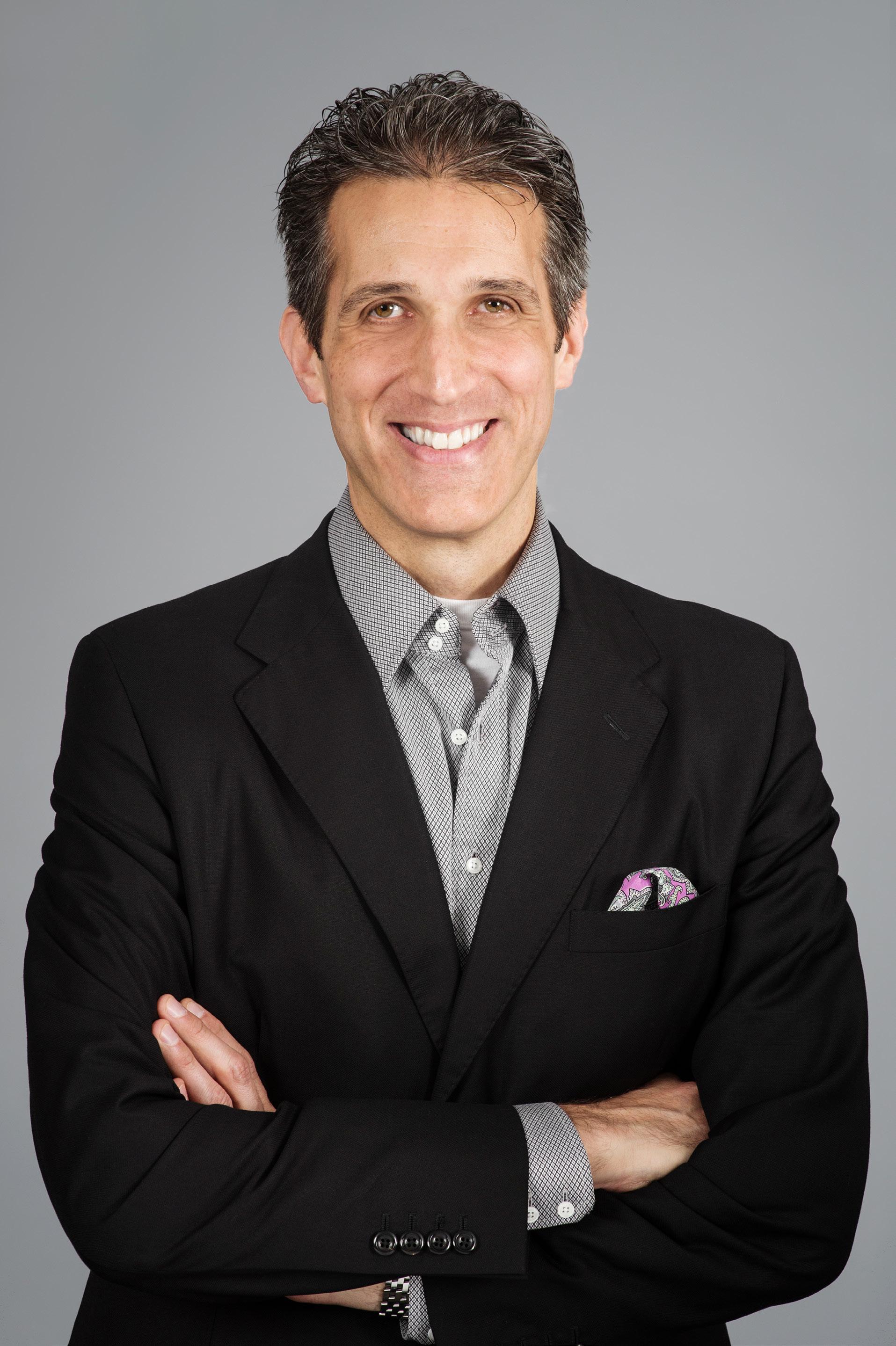 Adam Levitt Attorney and Cofounding Partner
Adam Levitt Attorney and Cofounding Partner
Modern Counsel 101
DiCello Levitt Gutzler Romy Modlin
“I knew very early on in my legal career that I was never going to be professionally satisfied until I had my own firm,” states Adam Levitt, who made good on that goal when he cofounded DiCello Levitt Gutzler in April 2017.
Creating the firm that he wanted to lead came from observing what he emphatically knew he didn’t want. “When I was a paralegal before law school, I worked at a firm where the senior partner and I were the only two people in the office at six thirty in the morning, but he refused to even make eye contact with me because I wasn’t an attorney,” Levitt recalls. “I just didn’t matter to him, and I knew way back then that when I became an attorney, I was never going to want to work at a firm, or run a firm, anything remotely like that.”
Such principles guided the founding of DiCello Levitt Gutzler, which is decidedly dissimilar to Levitt’s previous situations. What started in early 2017 with eleven attorneys in Chicago and Cleveland has already ballooned to nineteen lawyers in Chicago, Cleveland, New York, and St. Louis.
“I never wanted to create a firm where anyone, whether a paralegal, an associate, or a younger partner, felt a need to reflexively defer to a senior partner,” Levitt explains. “That’s just unworkable. My partners and I hire the most talented people, pay them what they’re worth, and put them in settings where they can thrive. We want them to add value, and we want them to know that their opinions matter.”
Levitt says that he has assembled his team carefully. “We have a group of people who genuinely like each other. They look out for each other,” he notes. “In the heat of a trial or complicated issue, those are the people you want to work with, because in those high-intensity situations, you need to know that you can trust and depend on everyone.”
Described by Levitt as a “top-tier litigation firm,” DiCello Levitt Gutzler has led numerous nationwide class action, commercial litigation, product liability, public client, and civil rights cases, resulting in groundbreaking results. “The key thing that links all of our practice groups, other than a constant push for excellence in everything that we do, is that we view law as a means of using the civil justice system to protect and
Purpose 102
“I never wanted to create a firm where anyone, whether a paralegal, an associate, or a younger partner, felt a need to reflexively defer to a senior partner.”
WHAT DRIVES ADAM LEVITT
“Throughout my years in practice, I’ve always driven myself to be the best at what I did and to do so with the highest level of diligence and ethics. That motivation increased exponentially when my law partner, Mark DiCello, and I decided to open up the firm that is now DiCello Levitt Gutzler.
“From the excitement and opportunity of the ‘blank slate’ that is the hallmark of every new venture, we focused, almost obsessively, some would say, on building the best team out there and making sure that that team was achieving excellence on the most cutting-edge and paradigm-shifting cases as often as possible.”
help people and companies, whether through trial, pretrial resolution, or otherwise,” he says.
Levitt’s commitment to excellence has not gone unnoticed by those who have worked with him. “You will never out-prepare Adam,” says Steven Weisbrot, Esquire, partner and chief innovation officer at Angeion Group (page 194). “He knows his cases and the law better than most people know their own spouse.”
Among the most personally rewarding cases where Levitt has served as lead counsel was In Re Genetically Modified Rice Litigation, a multidistrict litigation in which he represented United States rice farmers who sued Bayer Crop Science for introducing an unauthorized, genetically modified rice seed into the US rice supply. The contamination of the US long grain rice supply arising from that incident caused widespread rejection of US rice around the world, costing US rice farmers billions of dollars and putting their farms and livelihoods at risk.
“The ability to use the litigation process against excellent and well-funded opposing counsel to advance that case to a place where, to date, the aggregate settlements exceed $1.1 billion and the farmers’ farms were actually saved was very meaningful,” says Levitt.
“To use the justice system to accomplish a righteous
Expertise Spotlight
Tapped by leading law firms around the globe to manage the most complex class actions, Angeion Group is setting a new standard for innovation in settlement administration and legal notice. Led by a proven executive team that has supported more than 2,000 class action administrations and the distribution of more than $10 billion to class members, Angeion has become one of the most trusted service providers in the legal industry, supporting a prestigious array of clients worldwide.
Since its founding in 2013, the company has changed the status quo in class action notice, harnessing the power of digital media in novel ways. Through its deep media experience, substantial legal expertise, and the ability to think outside the box, Angeion is helping its clients reach millions— even billions—of class members more effectively than ever before. Through its dedicated infrastructure, flexible use of technology, and dedicated employees, the company has also raised the bar for customer service excellence in complex claims review and administration, giving counsel and the court peace of mind. In 2019, Angeion Group was recognized as part of the Inc. 5000 as one of fastest growing companies in the United States.
103 Modern Counsel
outcome and change lives—it’s why we do what we do.”
In addition to recently settling the Equifax data breach lawsuit for more than $1.4 billion and a long-running class action lawsuit against Navistar for $135 million, DiCello Levitt is currently leading cases that include a products liability lawsuit seeking justice for victims of the high-profile Grenfell Tower tragedy in London: the deadliest residential fire in the United Kingdom since the Second World War.
Due to air gaps in the building’s external insulation system, a fire spread rapidly, engulfing the residential tower in a bonfire that resulted in seventy-two deaths and hundreds of serious injuries. DiCello Levitt Gutzler, along with its cocounsel, represents all of the deceased’s families and more than 130 of the injured victims. DiCello Levitt Gutzler also presently represents the state of Michigan in its PFAS-related litigation, one of the largest environmental pollution cases in US history with estimated damages in the billions of dollars.
“We’re trying to do the right thing for as many people as possible,” Levitt says. He quickly adds, “Saying that you want to do the right thing and actually doing the right thing are two completely different things. Say whatever you want, but it’s what you actually do, from the results you achieve to the path that you take to get there, that’s really important.”
Levitt also emphasizes that DiCello Levitt’s devotion to securing justice for individuals extends to its commercial practice. “You could say that a commercial practice can’t be interested in helping people when it’s just the reallocation of money, but that would be a naive way of looking at it because reallocating money is a tangible means of achieving justice,” Levitt says.
“If there’s a way to place a monetary value on a civil wrong, that is justice. And that’s something that we do work on in terms of our minority shareholder oppression cases, or what we work on in our whistleblower practice. We take steps to ensure that companies are doing the right thing and that the businesses, public clients, and people we
Purpose 104
“Say whatever you want, but it’s what you actually do, from the results you achieve to the path that you take to get there, that’s really important.”
represent are protected and their interests aggressively pursued,” the attorney emphasizes.
As far as the horizon is concerned, Levitt expects DiCello Levitt Gutzler to expand over the next few years, particularly in its environmental, securities, and international practices. “We like to be involved in hard cases and get strong results by drawing on our lawyers’ combined expertise and working our cases as comprehensively, creatively, and aggressively as possible,” he says. “We’re comfortable advocating for ourselves and our clients in a manner that I think very few other firms do.”
Core competencies include:
Advisory & Consulting Services
Bankruptcy & Restructuring
Forensic Accounting & Litigation Support
Transaction Support Services
Valuation Services
Healthcare Consulting
Capital Management
Investment Banking

Principal Investments
Real Estate Solutions
Retail Solutions
Wealth Management
B. Riley Financial (NASDAQ:RILY) has approximately 1,000 professionals in over 50 offices nationwide, and provides collaborative financial services tailored to fit the capital raising and business advisory needs of public and private companies and high-net-worth individuals through its several wholly-owned subsidiaries. www.brileyfin.com NASDAQ:RILY
The National Settlement Team at The Huntington National Bank proudly congratulates Adam Levitt on his career achievements and recognition by Modern Counsel.
www.huntington.com
105
Green Investments
Carolyn Greenwalt explains how private equity firm Genstar Capital considers environmental, social, and corporate governance factors to mitigate risk and enhance long-term financial performance
by Zach Baliva
Purpose 106
Carolyn Greenwalt Chief Compliance Officer Genstar Capital

Aron
Modern Counsel 107
Drayer
Everyone has seen the ad campaigns and marketing blitzes featuring cuddly animals and crystal-clear streams, just as everyone’s heard buzzwords and phrases like “low carbon footprint” and “fair trade.” All too often, corporations attempt to atone for past environmental sins by promoting small and disingenuous sustainability measures. While many companies feel the pressure to greenwash—to exaggerate environmental claims— organizations that implement an honest and effective sustainability program can create a significant competitive advantage.
Genstar Capital believes a robust environmental, social, and corporate governance (ESG) policy is increasingly important in today’s marketplace. Based in San Francisco and founded in 1988, Genstar is a private equity firm with approximately $19 billion in assets under management in four primary verticals: financial services, industrials, software, and healthcare. A strong ESG helps Genstar mitigate risk while maximizing longterm financial returns.
Carolyn Greenwalt, Genstar’s chief compliance officer, joined the company in 2019 after working as an attorney adviser at the US Securities and Exchange Commission (SEC). She says the policy has been good for Genstar’s bottom line. “We buy companies that are doing well, create more value, and then sell them. When we can deliver a business with a strong ESG profile, everyone involved wins,” she explains.
The ESG was born when Genstar made itself a signatory of the United Nations–backed Principles of Responsible Investment in 2015. The company’s commitment to responsible investment has changed the way its employees scrutinize potential deals.
Greenwalt and her colleagues take every prospective investment through a diligence phase with a third-party ESG consultant who helps look at tailored factors, including data privacy and security, worker health and safety, and environmental management. Genstar’s deal team works with the consultants to review the target company’s policies, public presence, social media, contracts, and other factors before generating an ESG risk profile.
Next, individuals armed with the report interview the target company’s management team to get more nuanced details and to identify relevant risks and
Purpose 108
“We buy companies that are doing well, create more value, and then sell them. When we can deliver a business with a strong ESG profile, everyone involved wins.”
WHAT DRIVES CAROLYN GREENWALT
“I’m driven by a belief in doing the right thing. Accountability and honesty are of paramount importance to me in my personal and professional lives.
“At the SEC, I helped protect retail investors from a wide range of fraud and investigated violators to hold them responsible for their actions. My role as CCO is to be an oversight mechanism for our investors to ensure we’re acting responsibly, protecting our clients’ positions, and adhering to their restrictions.
“As much as we expect public servants to be held accountable, there is a similar expectation for the private industry to work collaboratively, be transparent, and be held accountable for the decisions you make.”
governance, litigation, and all other legal matters. To find success, she must stay on top of numerous regulatory, financial, and legal factors. Fortunately, as her colleagues attest, juggling her duties poses no problem for the gifted attorney.
“Carolyn’s talent, dedication to excellence, and diverse background make her uniquely equipped to tackle Genstar’s most important legal, regulatory, and business issues,” says Marian Fowler, partner in the investment funds group of Kirkland & Ellis. “Carolyn is a superstar and an absolute joy for Kirkland to work with.”
Greenwalt constantly monitors headlines, SEC maneuvers, global markets, industry trends, and competitor activities to keep Genstar protected. When she read headlines about insider trading, she combed through internal disclosures and documents regarding investment decisions and double-checked the firm’s restricted list. When the COVID-19 pandemic hit, she ensured Genstar’s business continuity plan was ready to go as mandated by the SEC before pivoting to strengthen an informal work-at-home policy.
opportunities. Finally, the team makes recommendations to improve the company’s performance related to ESG matters.
A negative ESG finding uncovered in diligence isn’t an automatic disqualifier. “Sometimes we find things that we can address and remedy. Improving a company’s ESG profile is one way Genstar can add value before the sale,” Greenwalt says.
Recently, Genstar’s third-party ESG partner returned a report with several red flags concerning ethics and compliance. After identifying the risk prior to signing, Genstar asked the company to prioritize several remedies, which included an ethics and compliance program with robust training, an anonymous reporting hotline, and data privacy improvements. Genstar later sold the company for a profit.
ESG is just one of many areas Greenwalt handles at Genstar. As the firm’s sole in-house attorney, she’s also involved in compliance, employment, corporate
Of course, Greenwalt’s time working inside the SEC taught her many lessons that she’s using at Genstar, but she says her biggest takeaway from the agency was something more personal. “My wonderful colleagues and impressive leaders at the SEC taught me that strength and compassion go hand in hand.” There, Greenwalt learned from honest and kind leaders who were willing to teach, equip, and empower her as she advanced in her career.
In some ways, the experience contrasts with several discouraging events from earlier in Greenwalt’s academic and professional career. The first-generation college student and daughter of a Korean immigrant often felt dismissed, unappreciated, unseen, or undervalued. But simple advice from US Magistrate Judge Maria-Elena James set her on a new path. “Be yourself,” Greenwalt recalls hearing. “That was her advice. And those two words are important. It’s the best advice I’ve ever received.”
That advice, together with her experience at the SEC, gave Greenwalt the permission she needed to conduct herself with excellence, integrity, and kindness. “I like to do good work and be nice to people along the way,” she says. She looks for others who share her approach and says she was drawn to Genstar because
109 Modern Counsel
the firm promotes collaboration and authenticity.
Since joining Genstar in 2019, Greenwalt has not only excelled in her role but also contributed to a positive company culture. For instance, she has started an annual women’s affinity event and promoted regular “coffee chats” with the finance team. By spearheading social activities, she’s helping others, including fellow women in the workplace, thrive as they do good work together. At Genstar Capital, Greenwalt has found success by simply being herself.

110
“My wonderful colleagues and impressive leaders at the SEC taught me that strength and compassion go hand in hand.”
Lead
Portraits of today’s top legal executives, the remarkable careers they have cultivated, and the management strategies and best practices they employ to succeed both individually and collaboratively
Making Every Move the Best Move
Karissa Cottom meets the high expectations she sets for herself and strives to make her actions count, both as a seasoned litigator at the Williams Companies and in her community
By Courtney Ryan
Lead 112
It’s rare that a parent will feel like their child is too driven, but that’s exactly what Karissa Cottom’s mom would sometimes worry about while her daughter was growing up in a small town in southwest Kansas. “It would drive [my mom] crazy when I was little because I was always a perfectionist in everything I did,” says Cottom. “I think I’ve loosened up a little bit, but my drive is still there.”
Cottom’s drive has helped her achieve success as the managing attorney of corporate litigation and IT for the Williams Companies in Tulsa, Oklahoma, where she has built a robust in-house team for the energy company since joining five years ago. But it has taken a lot more than mere drive to carve out her path. Rather, it’s her compassion and team-player intensity that have come to dominate Cottom’s career.
Modern Counsel 113
Expertise Spotlight
Davis Polk is an elite global law firm with world-class practices across the board. Industryleading companies and global financial institutions know they can rely on us for their most challenging legal and business matters. Our top-flight capabilities are grounded in a distinguished history of 170 years, and our global, forwardlooking focus is supported by ten offices strategically located in the world’s key financial centers and political capitals. With approximately one thousand lawyers worldwide, we collaborate seamlessly across practice groups and geographies to provide clients with exceptional service, sophisticated advice, and creative, practical solutions.
Davis Polk’s litigators view matters through the lens of our clients’ business objectives, drawing on the substantial experience of our firm across all major industry sectors. Our approach has created a long track record of success for our clients, at trial and on appeal, through motions, verdicts, and strategic settlements. Our broad-based litigation practice encompasses complex commercial, securities, and other civil litigation; whitecollar criminal defense and government investigations; antitrust and competition; and intellectual property litigation.
“Karissa is an accomplished litigator who honed her strategic skills in the trenches,” says Tristan Duncan, a partner at Shook, Hardy & Bacon. “As a result, her leadership has proven remarkably efficient, ensuring a high degree of success and collaboration among her teams.”
Cottom first sensed that she had an affinity for law after she flourished in a college logics class. “It really piqued my interest, and someone said, ‘If you’re good at logic, law school is really something you ought to think about.’” As soon as she began considering a legal career, she immediately recognized that litigation was where she would shine.
“I liked public speaking, and I liked getting in front of people and developing strategies and putting the pieces of the puzzle together on a case,” she reflects. “And so I knew even before I went to law school that litigation was what I wanted to do.”
She chose Baylor Law School for its hands-on trial program and, upon graduation, landed an associate gig at the Dallas firm Hughes & Luce (now K&L Gates), where she embraced a strong comradeship with her fellow attorneys. “It was a close-knit group of almost two hundred attorneys,” she says, laughing.
Karissa Cottom Managing Attorney, Corporate Litigation & IT The Williams Companies
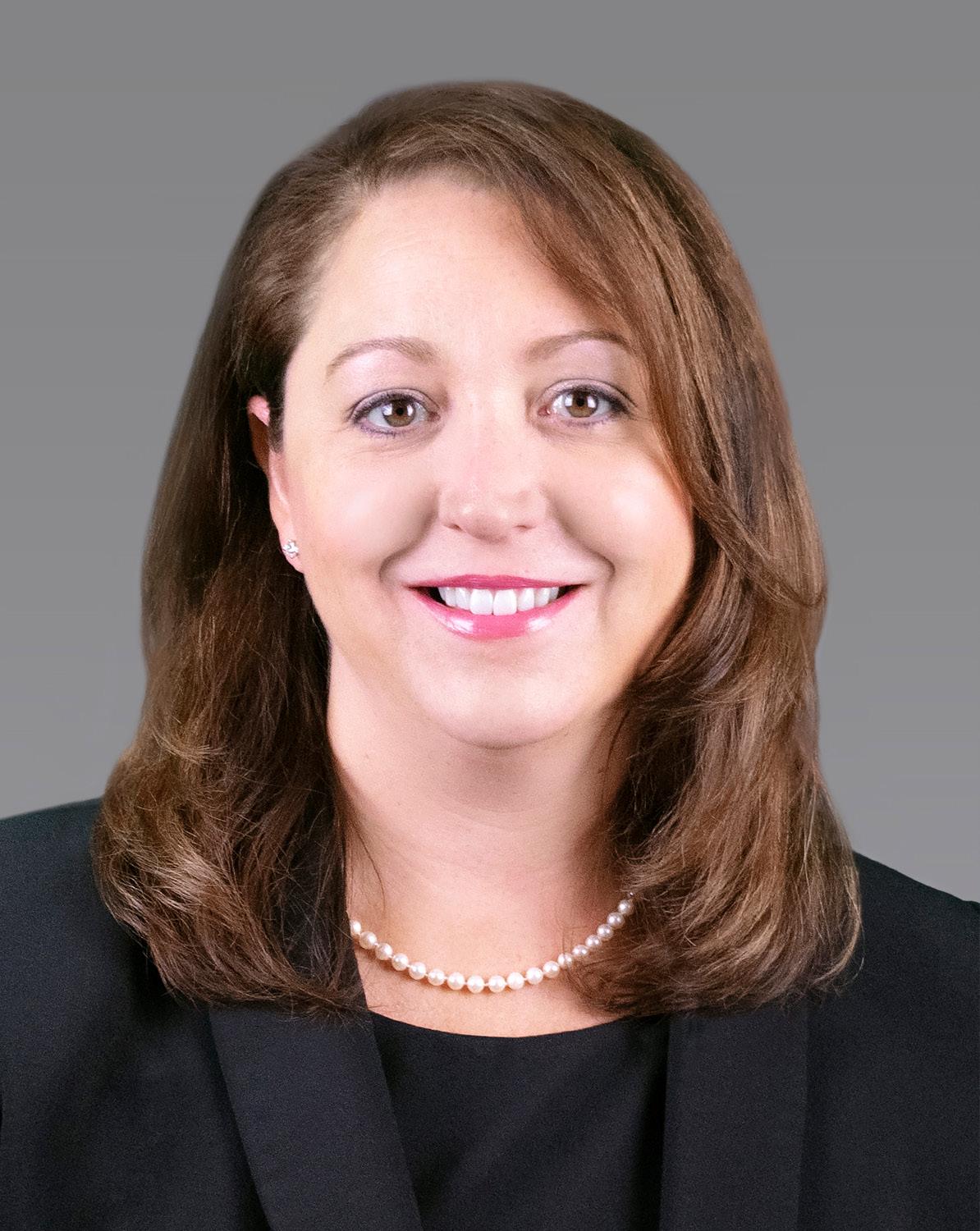
Lead 114
Kelly Cook
But her desire for community shifted closer to home within six months of joining the firm, when 9/11 rattled the entire country. She realized that she longed to be near family and friends in Tulsa. “It just put a new perspective on my life,” she says.

Finally settled in the spot where she wanted to launch the rest of her life, Cottom’s career really took off when she joined Hall Estill and began working on outside litigation for a firm client: the Williams Companies. She tried several cases for Williams, including a successful bench trial and another case with a $9 million jury verdict. This made her a natural fit when the company later had a need for an in-house commercial litigator.
However, shortly after Cottom joined the Williams Companies, the two other litigation attorneys departed, and she was left alone to build a team from the ground up. Quickly promoted to managing attorney, Cottom hired two attorneys to join her team of three paralegals. Recently, she welcomed a third attorney to her team, who specializes in cybersecurity and information technology.
“My paralegals have actually been with me all along, and I will give them the credit, because without them, I couldn’t do the job that I do,” she says. “They have been invaluable. They each have different expertise, whether it be legal hold, ediscovery, or just finding the needle in the haystack. They have made our team outstanding.”
What has also no doubt made the team outstanding is Cottom’s synergistic approach to tackling the work. “I’m not only the coach. I’m also a player,” she says, explaining that when a high-stakes litigation matter comes in, it’s assigned based on what is most logical and who is capable and available at that time—not on hierarchy or status.
“So I handle the litigation just like [the other attorneys] do, and that can be challenging at times—but I wouldn’t want it any other way,” Cottom says. “Because if you don’t stay active and get down deep in the weeds with these cases, you can lose touch with reality. I’ve become a much better attorney and a much better leader by doing the groundwork.”
That approach extends to every aspect of her work, including how she collaborates within Williams and with outside counsel. “I always tell outside counsel whom we haven’t used before that we’re not your typical in-house litigation counsel,” says Cottom. “We are part of the team, part of the strategy, and we actually review and edit the briefing.”
Cottom’s outside counsel affirm her dual role as managing attorney and an integral part of the crew, ready to pitch
115
Expertise Spotlight
At LSL, we believe that our success during the past twenty years is due, in large part, to our strong commitment to achieving results for our clients in as efficient and effective a manner as possible. If early resolution is in the best interest of our client, that is our objective. Resolution is not always an option or even possible, however, but with more than two hundred jury trials under our belts and experienced appellate attorneys, we are prepared to see any case to its ultimate conclusion.
In addition to our longstanding focus on effective and efficient representation, LSL firmly believes that its commitment to client service and its strong client relationships are key factors in its success and ultimately in the success of its clients as well.
in wherever she is needed. “Karissa exemplifies what it means to be a team player,” says Andrew Ditchfield, a partner in the litigation department at Davis Polk & Wardwell. “She is a leader on strategy, but she also rolls up her sleeves and gets into the details.”
Scott F. Lehman and Mark Steele, both shareholders at Latham, Steele, Lehman, Keele, Ratcliff, Freije & Carter, echo these sentiments. “Karissa is not just the coach but a member of the team,” they emphasize. “Her ability to effortlessly wear both hats is an asset to Williams and makes collaborating with her enjoyable as outside counsel.”
To further the company’s ease with legal matters, Cottom is developing a litigation boot camp for those who aren’t as familiar with the courtroom. “It’s really for those folks who don’t do litigation on a daily basis so that they can refresh every year, if they need to, or maybe every other year,” she explains. “It’s to help remind them of best practices that we’ve adopted around different concepts of litigation hold, discovery, strategy, and settlement—or even taking the case all the way.”
Outside of her litigation work at Williams, Cottom’s drive and predilection for teamwork has found her a home at a number of nonprofits and community organizations over the years, including Youth Services of Tulsa. Back in 2011, her eyes really opened to the plight of homeless youth in Tulsa. She herself had young kids at the time and was startled by what she encountered in the community. She wanted to find an immediate way to help.
“It’s something that I didn’t see a lot of growing up because I was in such a small town,” she says. “We didn’t have homeless youth, so we didn’t have places we could reach out to and support.” After getting in touch with Youth Services, Cottom immediately got involved in the executive committee before rising to president of the board for two years. Volunteering there grew into a deeply meaningful experience. Seeing the youth whom the organization helped left her feeling useful and inspired.
“Being involved with Youth Services will always be a highlight for me,” she says. “I loved every single board meeting I went to with that organization. I never felt like it was a waste of time.”
Lead 116
Cottom has since taken a break from Youth Services to pursue new community work, this time with her daughter in tow. The two recently signed on with the Greater Tulsa National Charity League, a mother-daughter philanthropic organization that serves agencies ranging from Ronald McDonald House Charities to the Tulsa SPCA.
“I’d heard about the organization from some other moms and thought it would be a great way to introduce my daughter to community service,” Cottom says. “It’s important to have her see me make time to do this on top of working full-time and being a wife and mom, along with all the other demands that I have. I want to be a good role model for her, and I hope to create a passion in her for charity work.”
Cottom admits that balancing work with family priorities and community service can be tough at times, but she credits her husband and friends with helping to make it all come together. Of course, there’s also her relentless drive.
“I expect the best of myself every single day,” she says. “I want to be the best mother, the best wife, the best lawyer, the best teammate. And I’ve learned being the best doesn’t mean you have to be number one. It just means being the best at whatever is needed at that point in time.”
117
Davis Polk joins Modern Counsel in recognizing

the insightful
achievements
the Williams
davispolk.com © 2020 Davis Polk & Wardwell LLP New York Northern California Washington DC São Paulo London Paris Madrid Hong Kong Beijing Tokyo
legal work and
of Karissa Cottom of
Companies.
YOU

profi lem ag a zine c om F or e ditor ia l c onsi der ati on , c ont ac t info @ profi lem ag a zine c om THAT
S h a r e yo u r s to r y of exc e pt i on a l l e a de r s h i p w i t h o u r n et wo rk of p owe r f u l bu s i n e s s l e a de r s . P ro fi l e s h a r e s th e s to r i e s of th e m o d e r n exe c u ti ve .
ME ANS
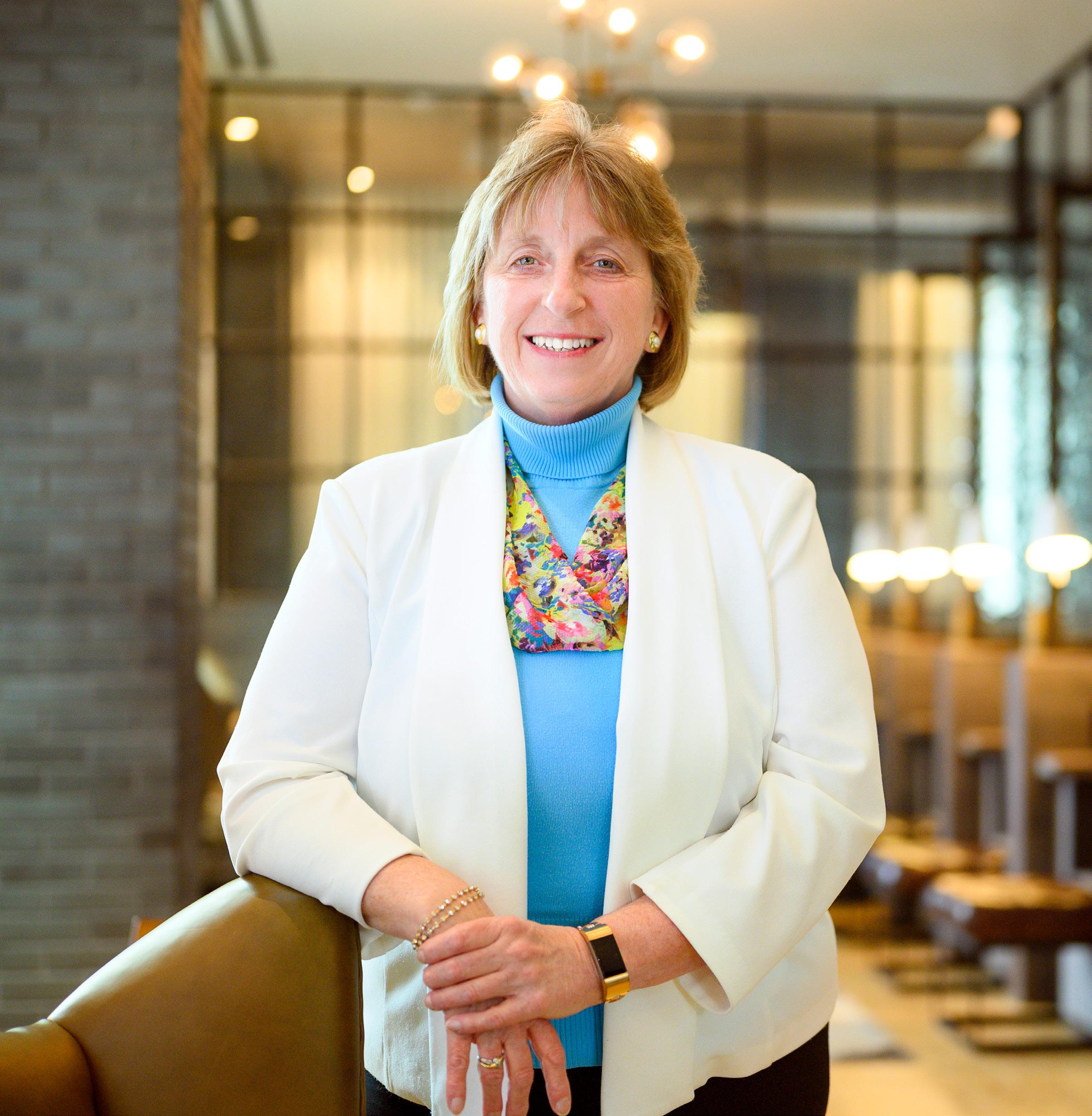 Dawn Becker
EVP, General Counsel, and Secretary
Federal Realty Investment Trust
Dawn Becker
EVP, General Counsel, and Secretary
Federal Realty Investment Trust
Lead 120
Courtesy of Federal Realty Investment Trust
Burning Down the House
Dawn Becker walked into a worst-case scenario as a newly appointed general counsel at Federal Realty Investment Trust. Her victory then was the first in a long line.
 By Billy Yost
By Billy Yost
Modern Counsel 121
THE FIRE BURNED. AND DAWN BECKER WAS TOLD that she, as the newly appointed general counsel at retail-based REIT Federal Realty Investment Trust, would have to handle it.
“I had started getting involved in more of the business side of things,” says Becker, who became general counsel at Federal Realty in 2002. She had joined the company five years prior. “Our current CEO was taking over and asked me to take on the general counsel role, and I knew it was a great opportunity to learn much more about things I hadn’t learned before.”
She continues, “Four months into the job, a project on which we had spent the equivalent value of a quarter of our company caught fire. We were a month from opening.”
The project still managed to set a record, though. “It still holds the record as the largest fire in the history of the city of San Jose,” Becker says, able to laugh a little nearly two decades removed from the incident. “That’s not quite the claim to fame you want.”
Meaning Business
Becker was faced with a former CEO who had stepped down after twenty years of service, a new incoming leader, a new job, and the company’s largest project literally up in flames. The new GC didn’t back down. “That entire ordeal flipped a lot of switches in me,” Becker remembers. The GC was responsible for dealing with the insurance claim, which would recoup $129 million.
“It was no longer just a legal exercise of reviewing insurance contracts,” Becker explains. “It was the business. How does this relate to our financing documents? How does this work from an accounting standpoint? How do we make sure we have the capital to run our business? How do we address this with the board? It just brought everything together, and I think our CEO would tell you that I handled it pretty well.”
The experience only further whetted Becker’s appetite to align more with the business of the company. “At the end of it all, we were very happy with the result,” Becker says. “I really had the business juices flowing.” So much so that Becker was tasked with helping Federal Realty become a bicoastal company. She was heavily involved with setting up and running the West Coast office.
Lead 122
“My job now is to understand who the people are, what the needs are, and how those needs will evolve going forward.”
“We had a full-service office we were trying to run from the East Coast,” Becker says. “But it wasn’t just running the office. It was making sure our West Coast business was successful and contributing to the company.” While she never had to ditch the legal aspects of her job, the GC was now in charge of a business that was generating between 15 and 20 percent of Federal Realty’s entire income at the time.
The problem with continuing to rack up victories is that the challenges only seem to increase. “Then came 2008,” Becker says with a long exhale. “While the market at the moment [Becker spoke with Modern Counsel in April 2020] may be shaping up to compare, no one had seen anything like 2008 for decades.”
Federal Realty CEO Don Wood was looking for someone who could operate the company’s portfolio during this time, and again, he turned to his trusted general counsel. “I was given the opportunity to run the entire portfolio,” Becker says.



It went so well that Becker ultimately took on the chief operating officer role and stayed in that position until 2015. “That was just way too much in addition to the GC role,” Becker confesses. “And, frankly, I think we needed to change how we were doing things.”
Passing the Torch Becker is admittedly closer to the end of her career than the beginning. But she still seems uniquely candid about the need to help prepare for those who will take over when she’s gone. Becker has made an obvious investment in the company where she’s spent nearly a quarter century, and that has bred a strong loyalty. She wants Federal Realty to be just as successful when she leaves as when she was there.
Her legacy is clearly felt both at Federal Realty and among the external partners who have worked with her over the years. “Dawn is a consummate professional who never
123
Willis Towers Watson is proud to support Dawn Becker in her commitment to the continued success of Federal Realty Investment Trust. Dawn is an inspirational leader that serves with passion and dedication to excellence.
Expertise Spotlight
Goulston & Storrs is an Am Law 200 firm with offices in Boston, New York, and Washington, DC. With nearly two hundred lawyers across multiple disciplines, we are a real estate powerhouse with leading-edge development, land use, zoning, and planning practices. We are organized as a professional corporation, wholly owned by 115 partners, and led by 2 managing partners plus an executive committee. Our lawyers employ a proven team approach that values client outcomes over individual recognition. The firm’s dedication to providing prompt, practical legal advice, efficient and tailored to our clients’ business needs, has resulted in Goulston & Storrs being acknowledged for excellence by Chambers and Partners, Thomson Reuters, US News & World Report and other leading industry rankings. Goulston & Storrs counsels major regional and national developers, entrepreneurs, investment funds, REITS, property owners, and commercial tenants who regularly seek the advice, counsel, and assistance of members of our real estate practice to further their business objectives locally, nationally, and internationally. Regional and national real estate lenders and investors consistently look to Goulston & Storrs as counsel for their sophisticated debt and equity real estate investments, including the structuring of syndicated and capital market transactions.
ceases to impress me,” says Debbie Horwitz, a director at Goulston & Storrs. “She is a strategic and creative problem-solver with a knack for finding practical solutions and getting things done. It is my true privilege to work with Dawn.”
“Our EVP team has an average of sixteen years at the company, and that’s including one member who’s only been here four years,” Becker says, laughing. “Things have progressed well with us at the helm, but it’s time to start thinking about turning it over.”
That’s why Becker has taken a hands-on approach to succession planning at Federal Realty. “Having gone from a legal advisor to a businessperson with a real expertise in legal matters has put me in a unique position to be able to make sure that we are getting the company set up for that next generation,” Becker says.
“We’re a company that was formed in 1962 and has only had three CEOs in its entire history. There’s a lot of history here,” Becker notes, “not to mention our shareholders, who have enjoyed increases in their dividends every year for fifty-two straight years. No other real estate company can say that, but that does create a lot of pressure to make sure you’re turning it over in a way that ensures that the success will continue.”
It’s forced the admitted “control freak” to lay off the micromanaging and, instead, help shepherd others along. “I’ve learned how to give guidance but let the team solve problems using their own expertise,” Becker says of her team. “My job now is to understand who the people are, what the needs are, and how those needs will evolve going forward.” She adds, “I want to make sure we’ve got the right skills, the right people, and that we’re training them in the right way.”
Becker’s nearly twenty-five-year reign at Federal Realty may be slowing down, but there’s no way she is. She came to the general counsel role with a burning building, and no one has been able to throw cold water on her since.
Lead 124



Dawn Becker goulstonstorrs.com We Salute for her professional excellence and outstanding leadership at Federal Realty Investment Trust. Dawn is a consummate professional, who embodies true creative problem solving, consistently develops practical solutions, and gets things done. Boston | New York | Washington, D.C.
Bringing the World Together
Krista Sweigart facilitates relationships at AES Corporation that energize the entire globe
By Courtney Ryan
Lead 126
GROWING UP IN A RURAL
AMERICAN community, Krista Sweigart often dreamed of international travel. Now at the legal helm of commercial transactions for AES Corporation, one of the world’s leading renewable power companies, it’s safe to say she’s probably crossed off more than a few destinations on her bucket list.
With assets located in fifteen different countries around the world, AES Corporation’s day begins in Vietnam and ends in Hawaii, and Sweigart relishes the opportunity to work closely with people in just about every time zone.
“One of the reasons I love my job is that it has given me the opportunity to create very deep relationships with a diverse group of people I would have never met [otherwise],” she says. “I’ve worked closely with very talented colleagues from places like Brazil, Amsterdam, and Kazakhstan, and I’ve gotten to really understand their day-to-day lives and how that affects their viewpoints.”
In fact, she spent more than a year living in Vietnam after it became clear that a $2.1 billion electric generation project there needed on-theground attention.
“I was advising from my office in Arlington, Virginia, when that development ran into quite a few snags,” Sweigart recalls. “Initially, it was suggested I go for a week or two, and then it was three weeks, four weeks. It became
clear that there was a lot of work to be done, so I essentially relocated to Vietnam and jumped in headfirst to work on all aspects of that particular project: permitting, construction, raising equity, project financing, and so on.” AES has a culture that prizes agility, and for Sweigart, that translated into an opportunity for exponential personal and professional growth.
Though it sounds like a substantial move to make, immersing herself in the projects she advises on has been Sweigart’s calling card since the beginning of her career. While practicing law at a large firm in the years directly after law school, she realized she didn’t want to stay on the sidelines.
“I found I didn’t like the idea of just advising on projects. I wanted to be deeply involved in ensuring their success.” She also wanted to contribute to something greater than herself, and AES Corporation’s mission of improving lives by accelerating a safer and greener energy future was exactly what she was looking for.
The unique culture of AES, which encourages people to take on different challenges throughout one’s career, has also been a key to Sweigart’s success. In addition to being a senior member of the legal team, she’s a member of the Board of Directors of AES Tietê, a public company in Brazil focused on renewable energy generation. She has also had roles
Modern Counsel 127

“AES doesn’t shy away from challenges, and there is always something unexpected. But I come in every day with a mindset of making things better than they were when we started.”
Lead 128
Terrell Edmonds
Krista Sweigart VP and Chief Counsel—Commercial Transactions & Global Businesses AES Corporation
in the company’s finance, project development, and operations teams that have given her a chance to build a strategic, action-oriented mindset.
“Those experiences helped me look at challenges from different business perspectives. I don’t just take a legal view—I also have insight into how the issue might be viewed by other parts of the organization and our stakeholders,” she says. “When people bring problems to me, I don’t want to just give them a sterile legal answer. Instead, I’m trying to imagine with them how this is going to play out, what the motivating factors are, and how to get to a win-win resolution as quickly as possible.”
While tackling a wide array of challenges and building deep, constructive relationships has certainly helped Sweigart grow into a role that is as broad in scope as it is influential, she says it has also taught her to focus on the big picture and act with empathy.
“It’s very easy to say, ‘You must do X, Y, or Z since this is the policy,’ but when you can understand the cultural context and that something like electricity is a fundamental need, then you can start to imagine ways to meet people in the middle and maybe even bring them over to your side,” she says. “Having worked with so many different situations in the past has given me insight that helps me get to the right resolution for everyone involved a lot more quickly.”
As AES Corporation continues to lead the global transition toward a more sustainable energy future, Sweigart
looks forward to continuing to play a key role in improving the way AES meets the needs of its customers with technologies such as AI and machine learning. One recent example is the company’s strategic alliance with Google, where the two companies will work together to develop new solutions to accelerate the adoption of renewables and energy storage, and to improve the customer experience. Though it’s exciting to work on such projects, she says her greatest motivator is that the work she does directly contributes to improving people’s lives across the globe through greener, smarter energy solutions.
“AES doesn’t shy away from challenges, and there is always something unexpected,” Sweigart says. “But I come in every day with a mindset of making things better than they were when we started. Ultimately, the work each of us does at AES fundamentally contributes to improving people’s lives, and that’s incredibly satisfying.”
Baker Botts L.L.P:
“Krista excels at managing complex transactions while coordinating with a large team of innovative dealmakers. With her combined legal and commercial experience, she knows what is a priority. It’s a joy to work with her.”
–Michael Didriksen, Partner
Clifford Chance:
“Krista is an incredibly smart and dedicated lawyer. Her ability to find solutions to complex problems (often without a playbook) has been a key secret to her success. She also happens to be a strong role model for women working in the renewable energy field.”
–Jessica Springsteen,
Associate
Modern Counsel 129
Hogan Lovells congratulates Krista Sweigart of The AES Corporation for inspiring women leaders in the legal field.
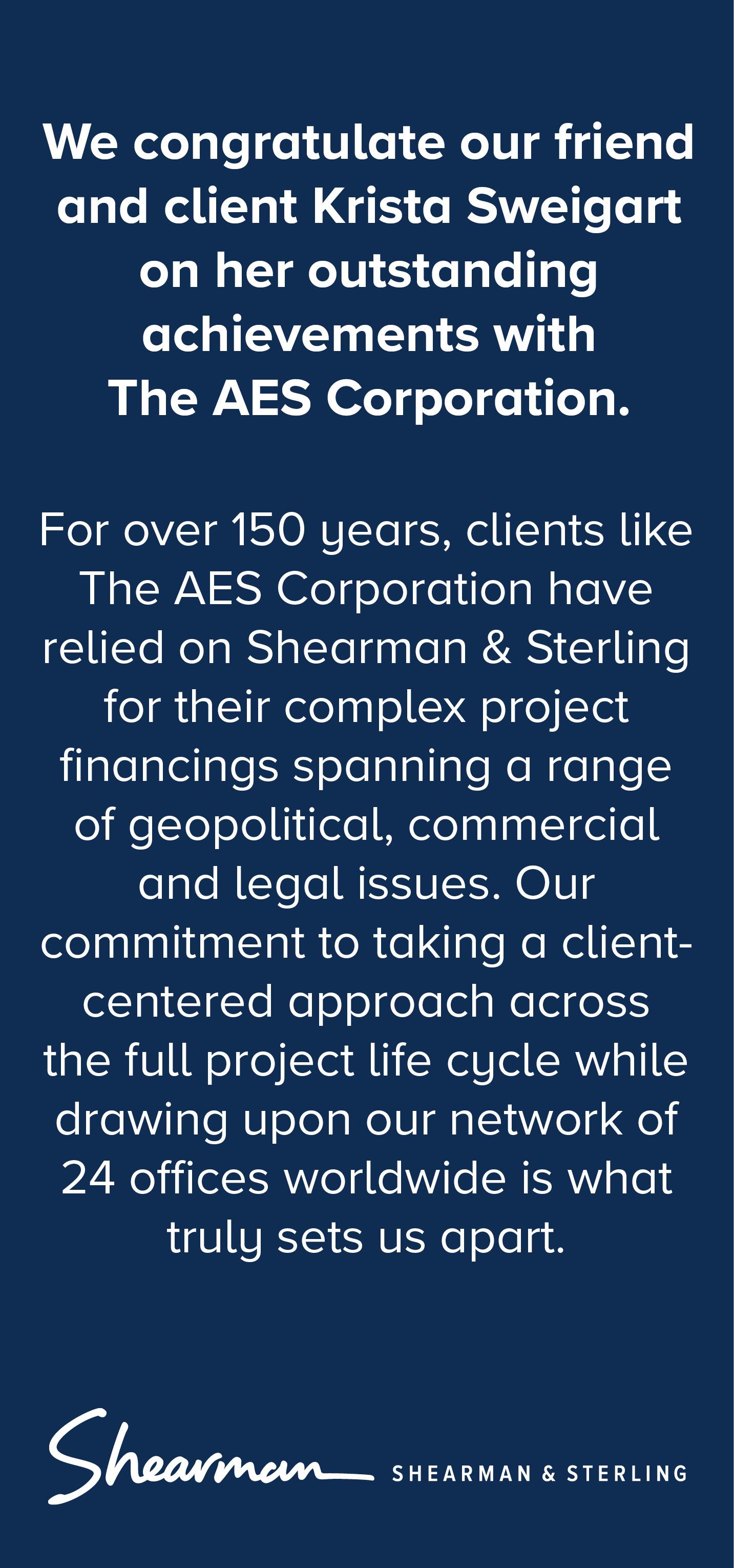
©
Lovells
All rights reserved. 05919
www.hoganlovells.com
Hogan
2020.
Realistic Optimism
Terry Roberts recognizes American Eagle Outfitters’ potential to be more diverse and inclusive, even if it’s going to take hard work to get there
By Courtney Ryan
TERRY ROBERTS BELIEVES SUCCESS IS BUILT ON intellectual curiosity, creativity, and individuality. It’s part of what led him to an in-house position at American Eagle Outfitters (AEO) and part of why he has thrived working within such a casual and eclectic corporate culture.
“The culture is really born out of the customers we serve. They’re mainly young people who are about individualism. The whole notion is about wanting people to feel comfortable in their own skin,” explains Roberts, adding that it’s a rare pleasure for an attorney to wear sneakers and T-shirts to work every day.
“There is a sort of energy of excitement and hope at AEO. We’re future oriented because that’s our focus for our American Eagle and Aerie brands, and our customers and people here genuinely care about each other.”
Roberts has an especially sweeping view of the retailer’s company culture, since he serves as the global brand’s vice president of employment law and chief inclusion and diversity officer.
“We are trying to do our best to make sure that our internal culture matches what we believe in as a company, but it’s still aspirational,” he says.
Modern Counsel 131
Terry Roberts VP of Employment Law and Chief Inclusion & Diversity Officer American Eagle Outfitters
In 2018, Roberts launched the company’s Inclusion and Diversity Alliance. At the same time, the AE and Aerie brands have continued to become more inclusive and diverse in their connections with customers. Roberts says the company still has a ways to go.

The road to delivering on AEO’s mission, though, may have gotten shorter, as the distinction between brands’ aspirations and practices has possibly never been as clear as it became in 2020—first due to the COVID-19 pandemic and then later due to the global Black Lives Matter antiracism movement.
“The first half of 2020—I’ll say, ‘Are you kidding me?” Roberts says, laughing. “It’s been the most challenging year I’ve ever had as a professional, let alone as a person.”
The pandemic itself rattled every industry in unprecedented ways, though retail was especially hard hit, and many major companies declared bankruptcy within weeks of many states’ imposed quarantines. “You can’t take for granted how tenuous [the beginning of the pandemic] was,” says Roberts. “I thought it was incredible how we not only survived but positioned ourselves for the future very well. We’re a benchmark-type retailer in our space.”
Just as AEO was, as Roberts puts it, “getting its sea legs” following the first wave of COVID-19, the murders of Black Americans such as Ahmaud Arbery, Breonna Taylor, and George Floyd set off a new wave of civil unrest and quickly exposed how and where brands fail to meet the aspirations of their inclusive missions.
“COVID had the chance to cripple almost all retailers from a business
Lead 132
Alexandra Albeck
standpoint,” says Roberts. “But the deaths of those Black individuals, and obviously I’m a Black man—I would say that hopefully when we look back, this moment will be a real transformational event for us as a country and company. Because we are typical of many companies that have less diversity the higher up you go.
“We have a great culture, but it’s not a perfect culture. We have people who want to do the right thing. But that is not enough. You have to actually get it done. Having good intentions and not being racist are not the standards.”

Roberts acknowledges the standard line that building diversity must come from the top, but he believes it also has to be built from the bottom up. “That’s how you create a real community of people who are committed and can help put in the work,” he says. “We all have to play a role, and one of the great things that has happened is the Alliance has gotten bigger since recent events. We have this community of people who now understand that they not only have a platform to speak their truth but also a mechanism to try to drive meaningful change.”
Even as Roberts concedes that 2020 has been tough and it’s not going to get easier any time soon, he is still optimistic about the future.
“I’m hoping, whether it be through selfreflection or otherwise, that people realize that things don’t just happen. Change only happens through hard work and deliberate focus,” he says. “And it’s very clear inclusion and diversity actually amplify things. They don’t take away from what people have and what they’re doing already. I’m incredibly confident in AEO. This is a company that, like all others, is flawed and has so much work to do. But more than any other company I’ve worked for, I feel like we have the most potential to be truly great.”
Proskauer Rose LLP | Attorney Advertising Eleven Times Square, New York, NY 10036-8299 212.969.3000 Proskauer is a leading law firm, providing a wide range of legal services to clients worldwide. To learn more about the firm, visit Proskauer.com. joins in recognizing Terry Roberts Vice PresidentEmployment Law, Chief Inclusion & Diversity Officer American Eagle Outfitters, Inc. (AEO) as a leader in labor and employment law, and a champion for diversity and inclusion. KAG_Modern_Counsel_2020_2.3x10.2_V3.indd 1 6/9/2020 5:10:24 PM
133
“We have this community of people who now understand that they not only have a platform to speak their truth but also a mechanism to try to drive meaningful change.”
The Supporting Cast
Legal trio Jaye Campbell, Jeannette Koonce, and Stefanee Handon enable business at CoStar Group with collaboration, communication, and one simple question
By Billy Yost
Lead 134
Law Stefanee Handon all found their way to the commercial real estate information and analytics giant after successful private practice careers as fee earners. The in-house proposition doesn’t just turn that idea on its head. It can often create the illusion that legal teams aren’t there to facilitate business; they’re there with a separate agenda or to get in the way. At CoStar, this is a laughable presumption.
Even amid a national pandemic, Campbell and Koonce were part of a team that helped CoStar successfully initiate a public offering of $1.5 billion of equity and a debut debt offering of $1 billion of senior unsecured notes, as well as close to a $190 million acquisition of Ten-X, a platform for online auctions and negotiated bids. With the company’s online commercial real estate audience of eleven million monthly website visits, it’s poised to expand Ten-X’s audience by something like forty times its current usage. If that’s not a gold standard for the in-house legal function enabling the business, the standard is flawed.
Campbell and Koonce have spent the past seven years working together. With Handon joining on the employment law side in 2018, the three female lawyers have helped amass a culture of business-minded advice at CoStar by staying in constant communication, valuing collaboration, and taking the time to provide counsel with a few simple words: “Tell me more.”
Diverging Paths Unite
The paths of the senior attorneys at CoStar share significant time spent in private practice prior to coming to CoStar, but the routes taken vary in notable ways.
Fourteen-year CoStar veteran Jeannette Koonce made straight for the East Coast after high school. The Omaha native lost her mother to breast cancer when Koonce was just sixteen. “While my father stepped up into that dual role, I think I became much more independent and a stronger-willed person,” Koonce says. “I was just determined to succeed.”
Koonce’s first firm job was dynamic from the start—not always the first word
Three of the most senior attorneys at CoStar Group have had to evolve in their in-house roles and, in some cases, learn how to be inhouse lawyers. General Counsel and Secretary Jaye Campbell, Chief Compliance Officer Jeannette Koonce, and Associate General Counsel and Head of Employment
Modern Counsel 135
one considers when describing the usual work of young associates, marked by grueling hours and a focus on tiny details. “I was exposed to a lot of different kinds of clients: anywhere from entrepreneurial businesses trying to raise angel financing up to public companies or companies that wanted to go public,” Koonce explains. “Anything and everything were kind of thrown at me, which is a bit unusual at a big law firm, but that really served me well coming in-house.”
As for Campbell, she likes to think her introduction to client services came from the bartending and waitress jobs she took on in her younger years. “You have to perfect the role of listener and counselor and cultivate that trust with your coworkers and customer,” Campbell says. It would also serve her well when working with massive blue-chip and Fortune 10 companies on their IP matters.
It wasn’t always the easiest of times. “I was young, and taking on risk against the status quo is sort of foreign in the legal departments of those big companies,” Campbell says. “There were times that I dusted up pretty significantly at my old firm because I was trying to

Jaye Campbell General Counsel and Secretary CoStar Group
“You have to be patient. Rather than telling someone that they can’t do something or that an idea is bad, I will most often say, ‘Tell me more.’”
Lead 136
—Jaye Campbell
Courtesy of CoStar Group
be more practical and business minded.” It didn’t help that her employer’s clients often came to her directly, in opposition to the hierarchical preferences of the firm world.
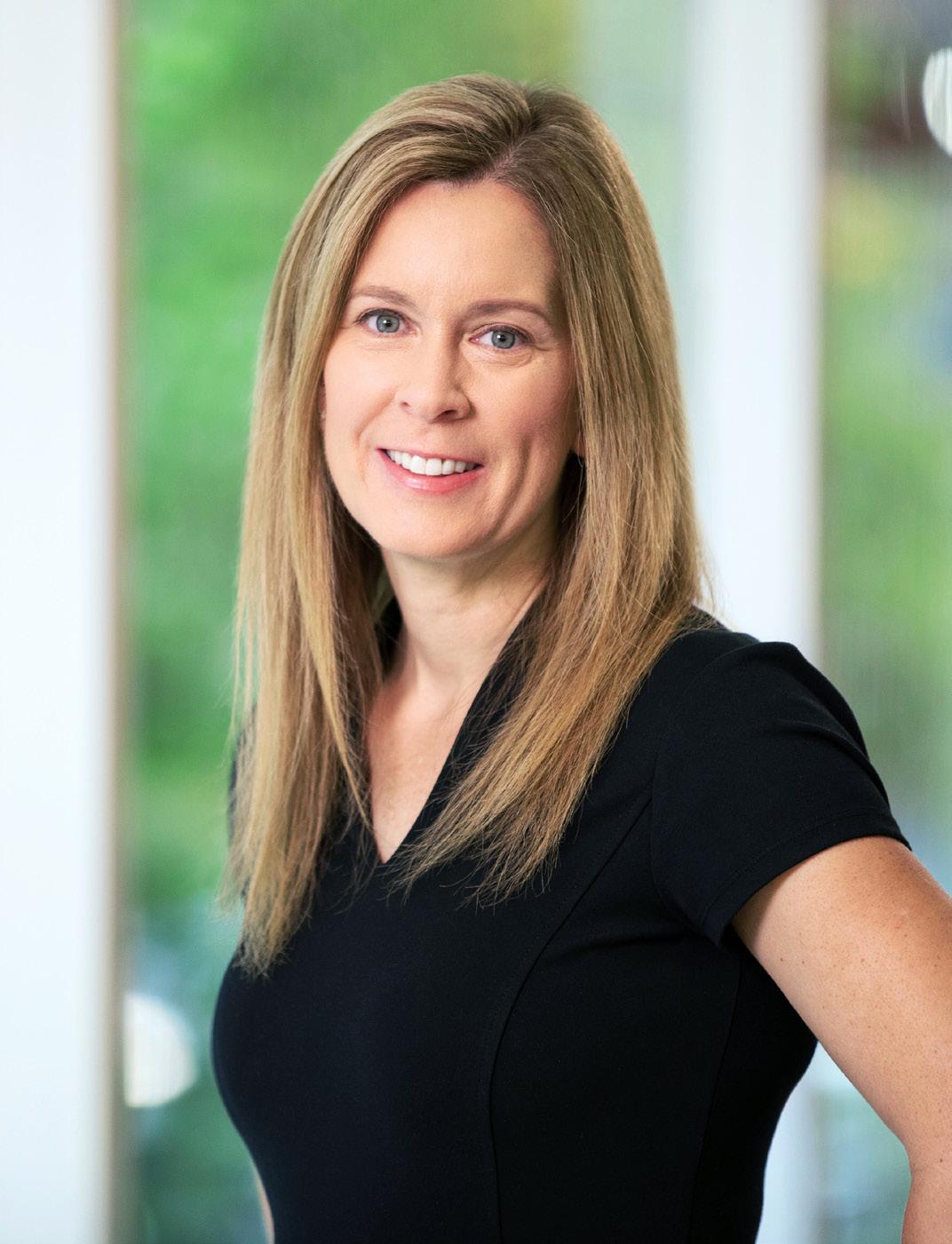
And Handon, who at the time of speaking was celebrating her two-year anniversary at CoStar, learned quickly that the criminal law career she wanted wasn’t all it was cut out to be. “I found employment law, which really married everything that I wanted to do,” the AGC says. She spent seven and a half years at one of the leading employment law firms in the country.
“We had a variety of clients with a variety of sophistication levels when it came to the issues we were working on, so there were times when I would be working with someone who had no idea about employment law,” Handon says. “That variety really helped me; sometimes I had to really break down complex issues for people.”
Supporting CoStars
The accumulated experiences, both legal and personal, of the three attorneys have had a critical role in establishing the CoStar legal group as a business-positive collaborator. “The collaboration here is easy because you’ve done a lot of the work already to put the right people in the right jobs,” Campbell says. “You know what people are good at, and you value their opinion and the diversity that comes to the table when you’re trying to solve something complex.”
“It’s been easy for us to learn to work well together because our company has grown so fast and continues to develop and grow quickly,” Koonce says. “We’re continually taking on new issues that are outside of our realm, and so we are able to add colleagues who have valuable expertise. It wasn’t like we had to learn to work together; it felt more like Jaye and Stefanee were the missing pieces of a puzzle that just naturally fit together.”
Handon concurs, even though the employment work she does can often seem like a whole different side of the legal department. “I felt like I went from a two-lane road to a six-lane highway, coming here,” Handon says, laughing. “Sometimes there’s a difference between the business strategy and the human
Jeannette Koonce
Chief Compliance Officer CoStar Group
“It wasn’t like we had to learn to work together; it felt more like Jaye and Stefanee were the missing pieces of a puzzle that just naturally fit together.”
Modern Counsel 137
—Jeannette Koonce
Stefanee Handon Associate General Counsel and Head of Employment Law CoStar Group
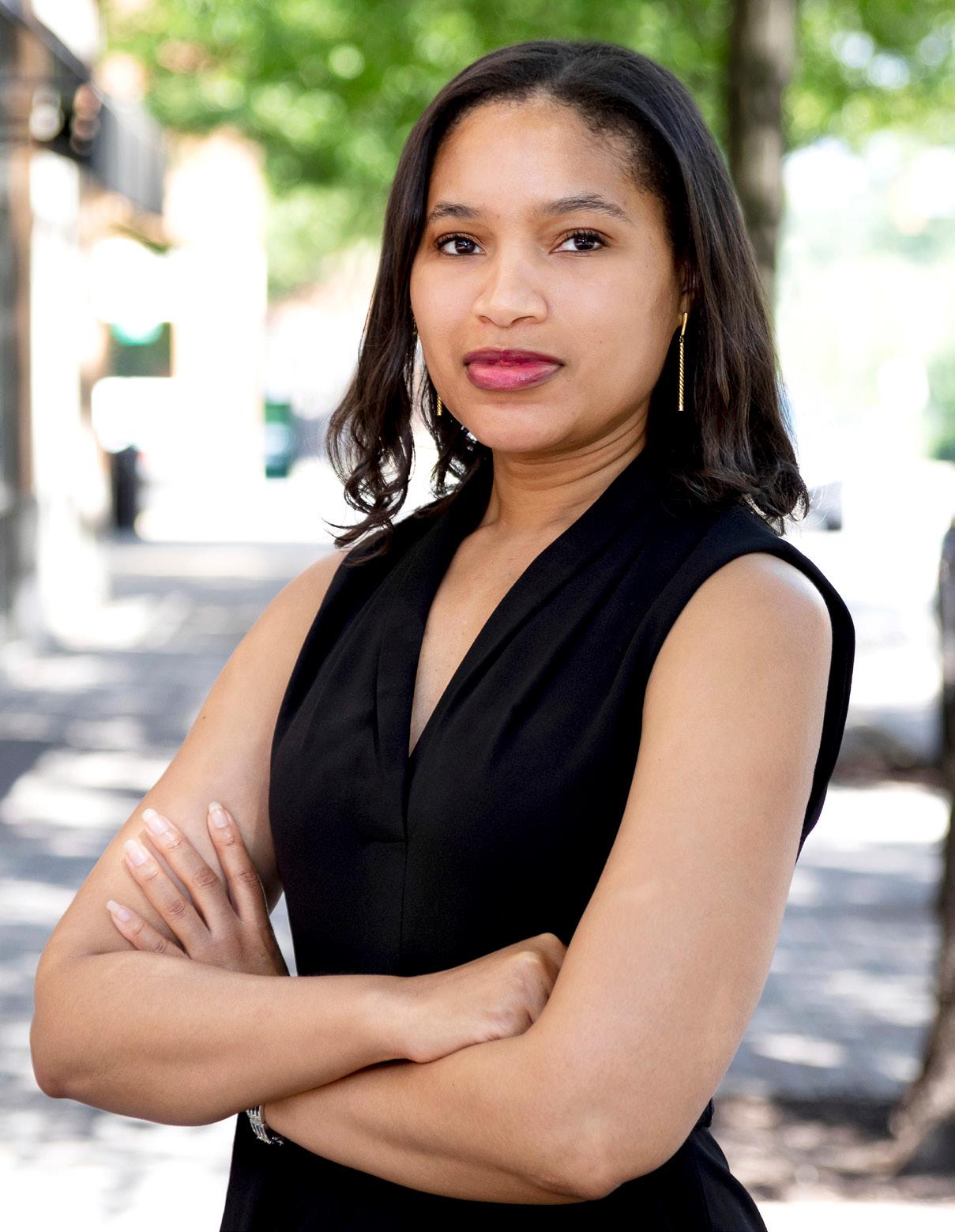
capital strategy. Communication is so important in understanding how to marry these two.”
Humility is also a word that comes up a lot, especially with regard to moving from private practice into more business-supporting roles. “Our goal isn’t to highlight the fantastic things that legal can do and all the new approaches that we can take,” Koonce explains. “It’s about the business and moving it forward. As the business grows, we examine new issues that arise and get creative however we need to.”
“In some situations, legal is doing its absolute best work when you don’t notice us,” Campbell says. “When everything is going as it should, the business is charging forward with its objectives and the lawyers are making sure that we’re all on track. It’s like you don’t notice the good referees in a game. You have to lead with humility.”
That humility can also be crucial when serving in-house clients. “I always try to start conversations by thanking the person for contacting me with their
“I went from a two-lane road to a six-lane highway, coming here. Sometimes there’s a difference between the business strategy and the human capital strategy. Communication is so important in understanding how to marry these two.”
—Stefanee Handon
Lead 138
Courtesy of CoStar Group
question,” Campbell says. “There are simple things you can do, things I do with my kids, where you just need to sit and actively listen. You have to be patient. Rather than telling someone that they can’t do something or that an idea is bad, I will most often say, ‘Tell me more.’”
With a successful acquisition and billion-dollar equity offering, followed by a billion-dollar bond offering, all in six weeks’ time, it seems like humility should be the last emotion in the minds of CoStar’s legal team. But the former private practice attorneys have truly made that unique in-house evolution in all the most important ways.




139
Weil congratulates the CoStar Group Legal team on their well-deserved recognition in Modern Counsel
Weil, Gotshal & Manges LLP
Talk to Me
David Morris helps Weatherford navigate—and often avoid—litigation by stressing early communication and transparency
By Courtney Ryan
Lead 140
David Morris Associate General Counsel and Global Head of Litigation Weatherford
IF THERE’S ONE THING THAT DAVID MORRIS IS CERTAIN OF, it’s that communication is critical to performing his duties. “The number one thing that I’ve learned over the years is to communicate early and often, particularly when it comes to bad news,” says Morris.
As the global head of litigation and associate general counsel for Weatherford, one of the world’s leading oil field service companies, Morris finds that communicating thorny news can sometimes come with the territory. But he says that is one of his most important responsibilities: to get in front of any issues and act quickly and objectively to find a solution.
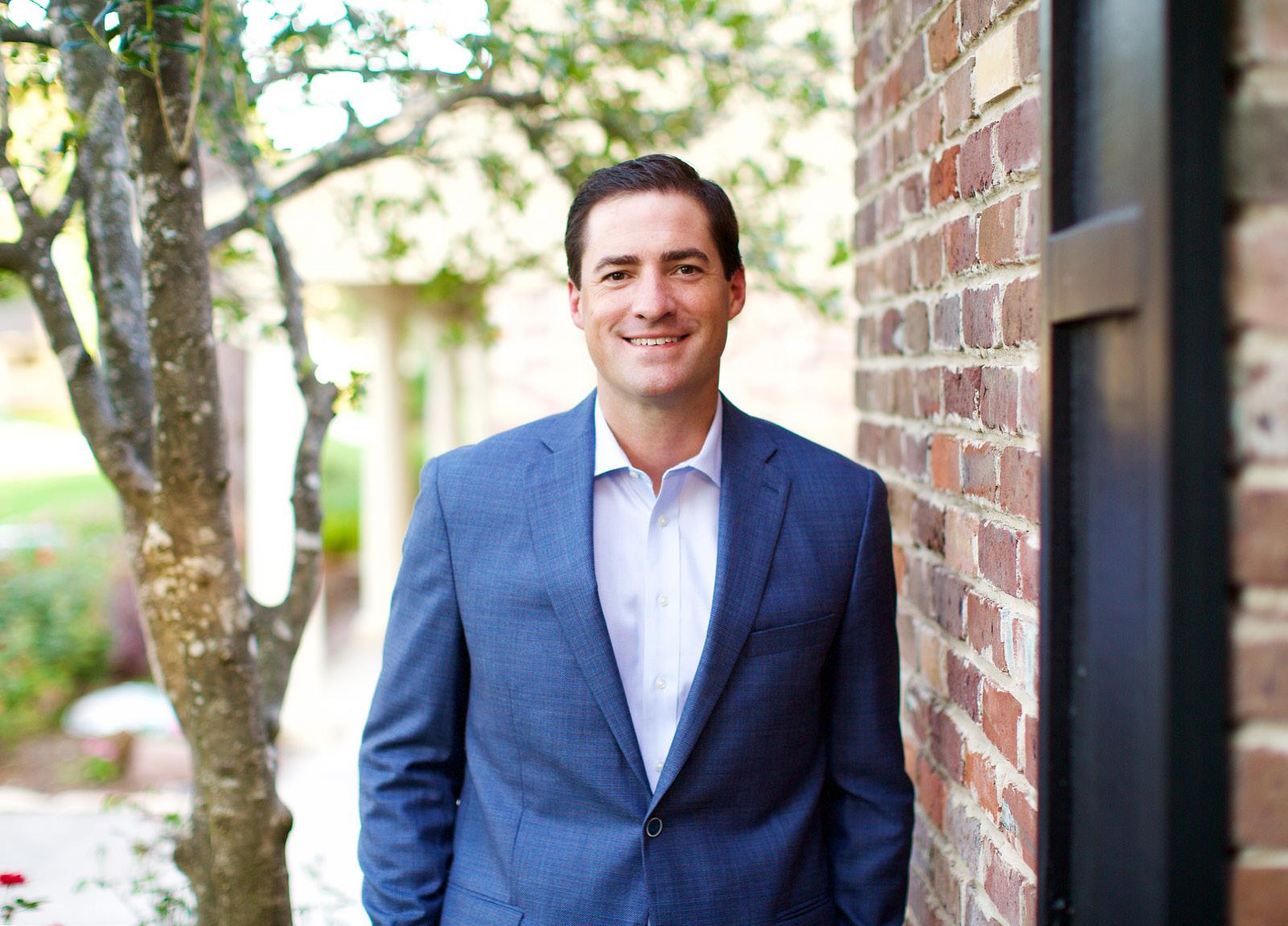
“I like working with my internal clients on big picture issues and making the difficult decisions,” he says. “When there is risk or potential exposure, you have to communicate that immediately, and you can’t sugarcoat anything. Also, it is so important to learn the personalities of the executives and other decision-makers to know how they want to receive information.”
Morris continues, “As much as it’s my job to navigate the company through litigation, I find it to be just as important to avoid it, if possible. Many times, there’s a dispute because the principals have dug in their heels. I find it is helpful to
take that emotion out and search for business solutions to resolve the dispute.”
He adds that managing internal communication is crucial to avoiding risk down the line, whether he’s handling an incident in the field or a commercial matter where many people need to be in the loop.
“Sometimes people start making assumptions about our potential exposure or liability before they know all of the facts, or before they have thoroughly reviewed the relevant contract. It is also possible that there are aspects of the law that they are not familiar with. In those instances, it is not helpful to make those types of assumptions or make statements in writing that just aren’t true and can open us up to exposure later,” he says.
“Getting involved early, I’m able to assist with proper communications, provide a quick analysis of our risk, and work with our internal clients to develop a strategy to move forward,” Morris notes. “Obviously, it is also important to invoke the attorney-client privilege or work-product privilege for our communications as quickly as possible so that we can talk openly about all aspects of the matter without creating evidence for a trial or arbitration.”
Modern Counsel 141
Ashley Patranella
We specialize in patent litigation relating to technologically complex cases, and we also have vast Inter Partes Review experience. In addition, HPC maintains an active docket in class action antitrust cases with underlying patent issues in the pharmaceutical sector.



Morris’s background as a trial lawyer and partner at Bracewell in Houston also prepared him for Weatherford by giving him an in-depth primer on commercial litigation. “They had a good practice of getting young attorneys involved with real experience,” Morris explains. “From the start, I was in meeting with clients and was involved with every aspect of the litigation process, including taking part in many trials and arbitrations. That early experience taught me the type of information clients want to hear and the arguments that judges and juries want to hear.”
However, transitioning from a large law firm to serving as senior counsel for a large oil field service company had its challenges. “When I went in-house, I realized quickly that there was a lot to learn about the oil and gas industry, as well as about working in a large organization. It also took some time to learn the best approach to managing outside counsel. There are a lot of different styles, and there were a lot of people who didn’t do things the way I liked,” he recalls. “I spent time observing the outside counsel we were using and then making decisions about maybe moving on from some of those folks and tightening up our roster.”
In addition, Morris immediately needed to learn to be deliberate when working cross-departmentally, particularly with finance. “I started off fairly early working with finance to prepare for potential litigation exposure so that they could book liabilities, and we’ve had a great relationship ever since,” he says, adding that it took time to appreciate all the information finance needed and why it was so important to them.
Heim, Payne & Chorush LLP

1111 Bagby, Suite 2100
Houston, TX 77002
713-221-2000
www.hpcllp.com
“Learning just through our communication and experience helped a great deal, so now I can anticipate what information other departments will need, and I can get it to them very quickly,” he continues. “I’ve increased the communication between litigation and other groups because I understand how important it is. Over the years, I believe my colleagues have become more comfortable with the information we’re providing and know that it’s accurate and complete.”
 Heim, Payne & Chorush has worked with David on several high-stakes patent cases and trials. His support has always been remarkable. Even in the most pressured situations, David is a steady hand and valuable strategist.
Heim, Payne & Chorush has worked with David on several high-stakes patent cases and trials. His support has always been remarkable. Even in the most pressured situations, David is a steady hand and valuable strategist.
142
HPC is a boutique patent law rm based in Houston, Texas, representing innovators from small startups to multinational companies in courts throughout the country.
At the Heart of Litigation
Heather Lohman helps Insperity bring hope to small- and medium-sized businesses during difficult times
By Billy Yost
Modern Counsel 143
IT HAS BEEN THE BUSIEST SEASON OF HEATHER
Lohman’s entire career. The managing counsel of employment law and litigation at professional employer organization Insperity—who spent nearly fifteen years litigating at renowned firm Skadden, Arps, Slate, Meagher & Flom (and jokes that her sleep cycle has never recovered)—just hasn’t seen anything like this before.
The COVID-19 pandemic resulted in new federal and state laws that, given Insperity’s business is providing HR, payroll, and employee benefits solutions, managed to affect virtually every part of the company’s operation. The economic downturn and huge spike in unemployment also meant that Insperity was flooded with questions about benefits, terminations and rehiring, and paycheck protection issues for its clients.
“It has been the busiest season, but it has also been the most rewarding,” Lohman says. “This legal department has worked harder than maybe it ever has. We’ve dedicated ourselves night and day in our own roles to understanding these new laws and thinking ahead about what Insperity’s clients—small- to medium-sized businesses—are going to be facing. Not to mention the overall business community.”
Lohman’s pride in her all-female legal team is evident, as is her clear dedication to making sure Insperity’s clients receive all the support they need in one of the most challenging economic conditions in modern history.
From the 68th Floor Lohman admits that the human resources industry has provided the lifelong litigator challenges she wasn’t entirely ready for coming from Skadden Arps. “Coming from financial, securities, and complex business litigation, which can feel very impersonal, to the HR and employment litigation world, which is inevitably extraordinarily personal, really introduces a new dynamic to my job,” the attorney says. “I underestimated how difficult the human resources world and employment litigation would be.”
Lead 144
“My team understands that, while we may all be in the same ocean, we want Insperity’s clients to be lucky to be in Insperity’s boat.”
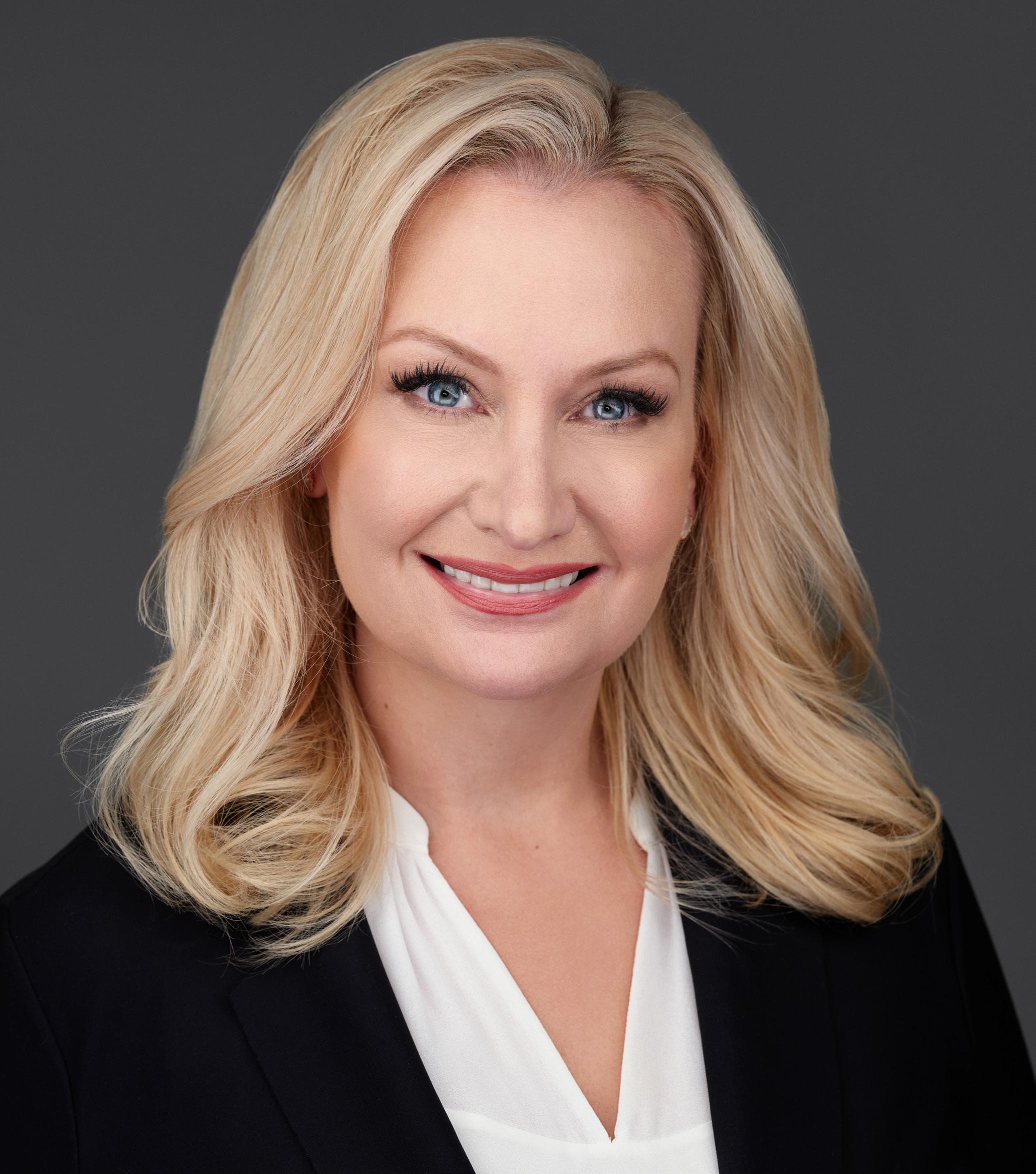 Heather Lohman Managing Counsel of Employment
Heather Lohman Managing Counsel of Employment
Modern Counsel 145
Law & Litigation Insperity Chris Gillett
Expertise Spotlight
Fisher Phillips is a national labor and employment law firm. The firm operates thirty-six offices throughout the United States. The firm has attorneys admitted to practice in forty-three states and the District of Columbia.
Fisher Phillips is ranked as one of the top labor and employment law firms in the United States by Chambers USA 2019. The firm also earned forty individual attorney rankings. Fifteen offices were ranked among the top labor and employment law firms in their respective states.
Fisher Phillips was named to the 2019 Best Law Firms by US News— Best Lawyers. The firm was named 2019 Law Firm of the Year for Labor and Employment Litigation. The firm received National Tier 1 Rankings for its employment and labor law practices and its labor and employment litigation practice.
The firm’s professional employer organization (PEO) practice group represents PEOs throughout the country, leveraging many years of experience in the industry. We support PEOs in claims oversight, litigation, tax, benefits, insurance, immigration, start-up consulting, mergers and acquisitions, contracts, compliance, and government relations.
Lohman says her confidence in distilling the cold, hard facts of a business transaction didn’t translate as readily to the complicated and often emotional aspects that her job now entails.
The transition from private practice to in-house is most readily illustrated in the view from Lohman’s office. “I went from a downtown Houston high-rise on the sixty-eighth floor to the fourth floor of a wooded, suburban office building forty-five minutes north of the city,” Lohman says, chuckling.
“My job changed so much. Just given how wide-ranging it is: from benefits to workers’ compensation to human resources support to payroll processing to more general aspects of advising a publicly traded company with fiduciary duties and reporting requirements. There are a lot of pockets of knowledge that I had to learn swiftly.”
Lohman has readily absorbed this knowledge since joining Insperity, and today, her external partners offer high praise for her handling of any legal issue that comes her way. “Heather is an outstanding litigation strategist,” says John M. Polson, a partner at Fisher Phillips. “She always has a clear vision of the big picture while tackling the most intricate details that can make the difference in complex cases.”
Insperity’s culture, Lohman says, has been a vitally important cornerstone of building out her knowledge base. “It’s hard for me to adequately state how important the culture at Insperity is,” Lohman says. “Our CEO has written the book on it. I realize that ‘doing the right thing’ is such a catchphrase, but it’s genuinely something we discuss all the time; I see it play out every day.”
Strong internal culture, the attorney says, is imperative because Insperity takes an active interest in helping its clients develop their own tailored culture. “You have to practice what you preach,” Lohman says.
Lead 146

ON THE FRONT LINES OF WORKPLACE LAW.TM H E AT H E R LO H M A N Fisher Phillips LLP is a national law firm committed to providing practical business solutions for employers’ workplace legal problems. Labor and employment law is all the firm does, offering deep and broad knowledge and experience in the area of the law the attorneys know best. Fisher Phillips attorneys help clients avoid legal problems, are dedicated to providing exceptional client service, and are there when you need them. The firm has over 400 attorneys in 36 offices. Learn more at www.fisherphillips.com. FISHER PHILLIPS IS PROUD TO JOIN IN RECOGNIZING OUR FRIEND AND CLIENT FOR HER ONGOING CONTRIBUTION TO INSPERITY’S SUCCESS. fisherphillips.com | 2050 Main Street, Suite 1000 • Irvine, CA 92614 • 949 851 2424 Atlanta Baltimore Boston Charlotte Chicago Cleveland Columbia Colu mbus Dallas Denver Detroit Fort Lauderdale Gulfport Houston Ir vine Kansas City Las Vegas Los Angeles Louisville Memphis Nashville New Jersey New Orleans New York O r l a n d o P h i l a d e l p h i a P h o e n i x Pittsburgh P o r t l a n d S a c r a m e n t o S a n D i e g o S a n Fr a n c i s co S e a t t l e Ta m p a Wa s h i n g t o n , D C M e t ro Wo o d l a n d H i l l s
Weathering the Storm
The culture of Lohman’s team is an extension of the core values built into Insperity’s corporate DNA. But the lawyer’s competitive streak relays a hope and belief that her team, one whose makeup is far outside the legal norm, is the best Insperity has to offer.
“My team isn’t just primarily female,” Lohman gently corrects. “We’re entirely female.” Lohman leads a team of three board-certified female labor and employment lawyers, a female paralegal, and two female legal assistants.
Lohman’s belief that her team is truly the best has faced its hardest challenge to date with the COVID-19 crisis. “Insperity has small- and medium-sized clients in all fifty states, and we want to put them in the best possible position to weather this storm,” Lohman explains. “We’ve all heard that we’re in the same boat, but I don’t really think that’s true for Insperity’s clients. My team understands that, while we may all be in the same ocean, we want Insperity’s clients to be lucky to be in Insperity’s boat.”
At the time of speaking, the real economic impacts of the COVID crisis had yet to unfold, and no one is more aware of that fact than Lohman. “We’re bracing for the financial impacts of this crisis for our clients,” the attorney says. “We’re keeping a chart of all the reopening requirements in every city in which we operate and helping our clients establish best practices for that process. It’s been a massive, massive effort. We have to adapt to changes every day, and sometimes, every hour.”
In spite of the crises, or perhaps because of it, Lohman says Insperity has had the opportunity to demonstrate its worth to its clients. The legal team continues to provide Insperity with the resources to help inform clients about new laws and regulations that could dramatically affect their businesses— demonstrating in these unprecedented times the value that Insperity can provide.
“We’ll continue to anticipate issues and position our clients to be in the best possible position during this really difficult time,” Lohman says. “I’m so proud of this department under the leadership of our general counsel. When we all look back on this, it’s going to be one of the most rewarding times of our careers.”
Lead 148
“When we all look back on this, it’s going to be one of the most rewarding times of our careers.”
The Generalist
Assistant General Counsel Deanna Cook brings a multifaceted view of the law to Blue Cross Blue Shield of Michigan
By Jeremy Borden
WHEN DEANNA COOK WALKED INTO an interview with Blue Cross Blue Shield of Michigan, she thought a job as in-house counsel at the large health insurance company would be tough to land.
Up to that point, she had been something of a generalist, accumulating a wealth of experience as an attorney at a large law firm in Washington, DC, after graduating from Georgetown University.
For Cook, the law served as both a practical entry point to a fascinating career and a way to follow in her mother’s footsteps. Growing up in Detroit and then around Ann Arbor, her mother was also a generalist, honing skills in family, municipal, and business law.
“She has always served as a wonderful role model, not only as a working mother but also as an attorney,” Cook
Modern Counsel 149
says. “I grew up with a view of her experience as a female lawyer in the 1980s to 1990s, when women were significantly outnumbered in law schools and in the legal profession.”
But it was the person who would become her husband, Cass, who gave Cook a final push toward the law. “I was debating between getting a master’s degree, not sure in what subject, or going to law school,” she says, reflecting on the time after she finished college. “He convinced me law school was the way to go. He still jokes that he is single-handedly responsible for me becoming a lawyer.”
Her time at the firm was valuable, she says, giving her exposure to a range of work in areas including litigation, antitrust, contracts, and corporate internal investigations.
But she knew that she wanted to move back to her home state of Michigan and to go in-house. Working closely with a company’s core business and addressing clients’ needs appealed to her. So when she saw that a position had opened up at Blue Cross in her home state, she took a shot.
She was surprised and elated when she got the job. Later, she learned that she and the attorney who hired her had something in common: they both came from larger firms. He saw in her an agile thinker and practitioner who could think on her feet in a variety of settings and use her broad experience to adjust to situations as necessary.
Her adaptability is a skill that has served her well. “I thought litigation would be a good place to start and would give me exposure to all kinds of practices—and it did,” she says. “I got a good general background in legal practice. It
Lead 150
“I got a good general background in legal practice. It helped me focus, in the long term, on what I wanted to do in my career.”
helped me focus, in the long term, on what I wanted to do in my career.”

Her time at the law firm was shaped by diligent professionals who showed her the ropes. Mentors like Kathryn Gainey took the time to explain the ins and outs of cases to her, and former SEC enforcement attorney Philip Khinda “made me a better lawyer by teaching me that even the smallest details matter. He also had a knack for crafting an impactful letter—an important skill for any good lawyer.”
Working as an in-house attorney in the healthcare space aligns, in part, with standard business practice: assessing contracts and disputes. But because healthcare is a highly regulated industry, it also means understanding what changes in regulations and law mean for insurers like Blue Cross. “I enjoy it,” she says. “Every day is a little bit different.”
The passage of the Affordable Care Act has meant continuing changes to requirements for insurers and health plans that come from the US Centers for Medicare & Medicaid Services (CMS). Staying on top of that changing landscape is a key part of her job, Cook explains.

Keeping abreast of regulatory changes and opportunities at Blue Cross has pushed Cook to help oversee some new initiatives. And these new possibilities in healthcare mean Cook is again relying on her past experience as a generalist to navigate a constantly changing industry. Undaunted, she is learning quickly, adapting, and overcoming hurdles as they arise.
“I’m not coming to work and doing the same thing every day,” she says. “It’s always a new challenge.”
Cook aspires to conquer these challenges as well as to become well versed in other areas of health law and lead a legal department within a corporation down the road. Just as her mother did for her, she hopes to pass on what she’s learned to younger attorneys.
As Cook puts it, “By her example, I came to view the law as an honorable, admirable, ethical, and intelligent line of work.”
www.bodmanlaw.com Bodman PLC congratulates Deanna Cook on this
well-deserved recognition.
It is an honor and pleasure to work with Deanna and BCBSM.
For three decades, we have been proud to provide strategic legal solutions to Blue Cross Blue Shield of Michigan. Part of our expertise is knowing your business. Bodman PLC is Michigan’s top law firm for the Blues.
151
Healthcare for the Twenty-First Century
Amy Papsun, Oscar Health’s associate general counsel and senior director, is passionate about making healthcare more effective and convenient for clients
By Keith Loria
Lead 152
Amy Papsun Associate General Counsel and Senior Director Oscar Health
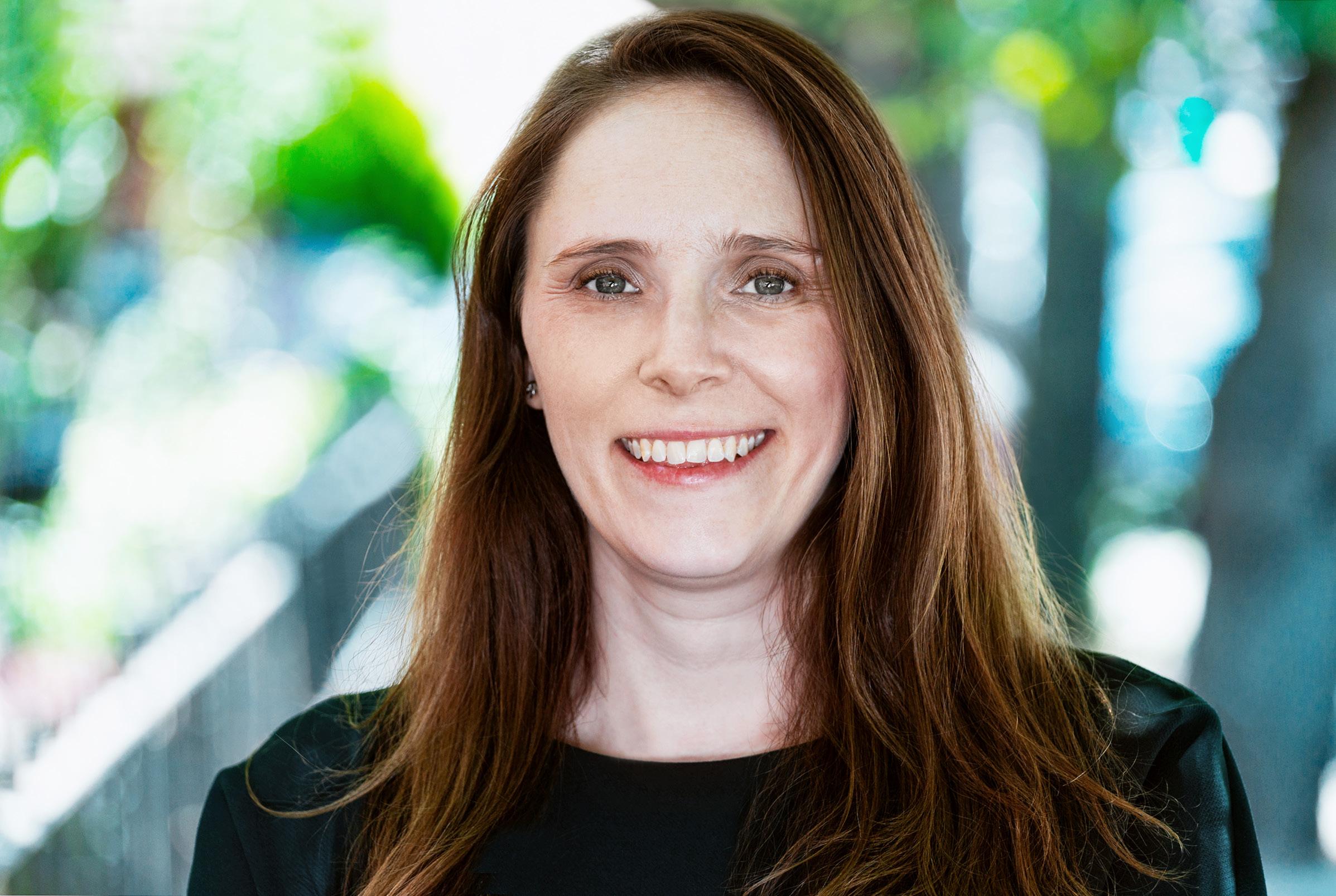
WHEN AMY PAPSUN TOOK HER FIRST JOB IN THE healthcare field, she had no idea it was the first step in a career she would become so passionate about.
“I was a senior in college who needed a job. I randomly found a job at a health law boutique firm,” Papsun explains. “It was totally by happenstance, and that random thing has proven to be really influential in my life. I found that the work was just super interesting.”
Papsun started out at that firm as a paralegal after graduating from American University. She was good at the job and found the work fascinating, so she returned to school at the University of Wisconsin. There, she earned her law degree and a master’s in public health.
Papsun’s career has culminated in her position as associate general counsel and senior director at Oscar Health, a tech-driven health insurance company. She leads a team of attorneys and nonat-
torney professionals in providing legal advice and identifying statutory and regulatory requirements for business operations teams.
She describes Oscar as “a mission-driven company” whose founders include CEO Mario Schlosser. He was inspired to establish the firm after he and his wife dealt with some typical insurance hassles—such as trying to understand why they were being charged for certain services and receiving paperwork that looked like bills but weren’t—when they were expecting their first child.
“The company was founded by people who were not entrenched in the healthcare system and called out some issues that we have all seen,” Papsun says. “It really defines our work and the employee culture, in terms of working for that common goal to help people live healthier lives and do it in a way that’s easier.”
Modern Counsel 153
Greg Hernandez
That has led to numerous innovations. For instance, Oscar created technology platforms that allow clients to access information, such as what they owe or how to get involved in a wellness program, via their smartphones.
“It’s more in line with the twenty-first-century life that we’re all experiencing,” Papsun notes.
She also enjoys working at Oscar because of its company values. Two of her favorites are “seek the truth” and “inspire and provoke.”
“The first one is pretty self-explanatory,” Papsun remarks. In terms of the second, she says, “As attorneys, we’re always looking for what our requirements are. Working at Oscar has been super interesting because our legal team is consulted for a variety of interesting and innovative business initiatives.”
Sometimes, when her team is offering guidance on something and they don’t see that it can be done the way it’s being proposed, that then opens new doors for discussions about alternative options.
“In talking about those options, sometimes we come to other ideas or new ways to do something,” Papsun says. “That way, we’re inspiring our business partners to think through things that they can try out.”
In her two and a half years at Oscar, Papsun has grown from an individual contributor to someone who manages a team that works on various initiatives to help the company grow. Among the projects keeping her team busy is Oscar’s new partnership with Cigna, which Papsun says will allow Oscar to bring its experience-focused approach to healthcare to more people.
“It’s such a joy to continue to work with them on this project,” she says.
Oscar is also committed to another issue that Papsun is passionate about: encouraging women to pursue and attain leadership roles.
Lead 154
“I love it because it’s never static. There’s always something new going on, and everyone always has thoughts and opinions, which is just so interesting.”
“In the legal industry in particular, we have an issue where the entry rate for law school between men and women is about equal. But then, as you work your way up the ranks in a firm or in private industry, you see the number of women just dwindle,” she explains. “I find it very important to support women and support paths to leadership so that we have a more diverse company and a more diverse industry.”
Oscar’s initiatives that support women include employee resource groups and policies related to time off, parental leave, and flexible schedules that give employees work/life balance.
Papsun also appreciates that Oscar is a place where employees can freely share ideas and develop innovations. And even though her career in healthcare wasn’t part of a grand plan, it has turned out to be the perfect fit.
“It’s been so interesting, since the passage of the Affordable Care Act, and recently with COVID, to be there at the cutting edge,” she notes. “I love it because it’s never static. There’s always something new going on, and everyone always has thoughts and opinions, which is just so interesting.”
Our seasoned healthcare team is here to protect your business and legal interests.
REGULATORY COMPLIANCE

Our attorneys have years of practical, public and private sector experience working for government regulators and commercial businesses. We know your industry and we know your business.
ADMINISTRATIVE LAW
Our team brings a wealth of experience successfully litigating in administrative forums and applying in-depth knowledge of the application of administrative rules governing agency conduct.
MANAGED CARE LITIGATION
Our litigators have appeared in state, federal and appellate courts and bring extensive health care knowledge and litigation experience to every case.
Kennaday

Meenan PA:

“Because Oscar is an innovative technology company, rapidly entering new health insurance markets utilizing its online portal to support Exchange or Medicare Advantage plans, Amy always asked cuttingedge compliance questions in need of rapid solutions. It’s always a pleasure assisting Amy in advising her internal clients.”
–Joy Moore Ryan, Shareholder
 Leavitt PC: Amy excels in a demanding, highly regulated area of law—healthcare—and works for an innovative, fast-growing company, Oscar. She more than meets those challenges with creative solutions for Oscar and regulators.
Leavitt PC: Amy excels in a demanding, highly regulated area of law—healthcare—and works for an innovative, fast-growing company, Oscar. She more than meets those challenges with creative solutions for Oscar and regulators.
CONTACT US Jim F. Novello (916) 732-3062 jnovello@kennadayleavitt.com Troy R. Szabo (916) 732-3065 tszabo@kennadayleavitt.com 155
Think Like a General Counsel
SOME PEOPLE GROW UP KNOWING EXACTLY WHAT THEY want to do. Others have formative experiences along the way that altogether change the trajectory of their career paths. Jonathan Feldman, former co-general counsel and secretary at online advertising technology company Rubicon Project, is in the latter group.
In college, Feldman’s interests were wrapped up in the music industry. While majoring in music industry studies at California State University, Northridge, Feldman found himself in a couple of core classes about business law and copyrights that nudged his interests toward the legal field.
“Most of my fellow music majors thought those classes were the worst classes or a drag, but I thought, ‘What are you guys talking about? These are super interesting,’” he says, laughing. “I really enjoyed learning about how the law interacted with both business and music.”
By Sara Verdi
Feldman catalogued this newfound interest and began to wonder if a postgraduate law degree was in the cards. An undergraduate internship at an entertainment law firm cemented his decision to attend law school. “The law firm was a litigation firm, and that made me quickly realize I did not want to be a litigator,” Feldman concedes, “but
Lead 156
Jonathan Feldman discusses his journey into the legal space and how his experiences have shaped him as both an attorney and a father
I definitely wanted to be part of the legal world and to keep pursuing that interest.”
Since completing law school, Feldman has enjoyed a well-rounded career as an attorney. Feldman attributes his success to the positive workplace experiences and relationships he has garnered over the years. At his first firm postgrad, O’Melveny & Myers, Feldman’s initial attraction to the job was the people.
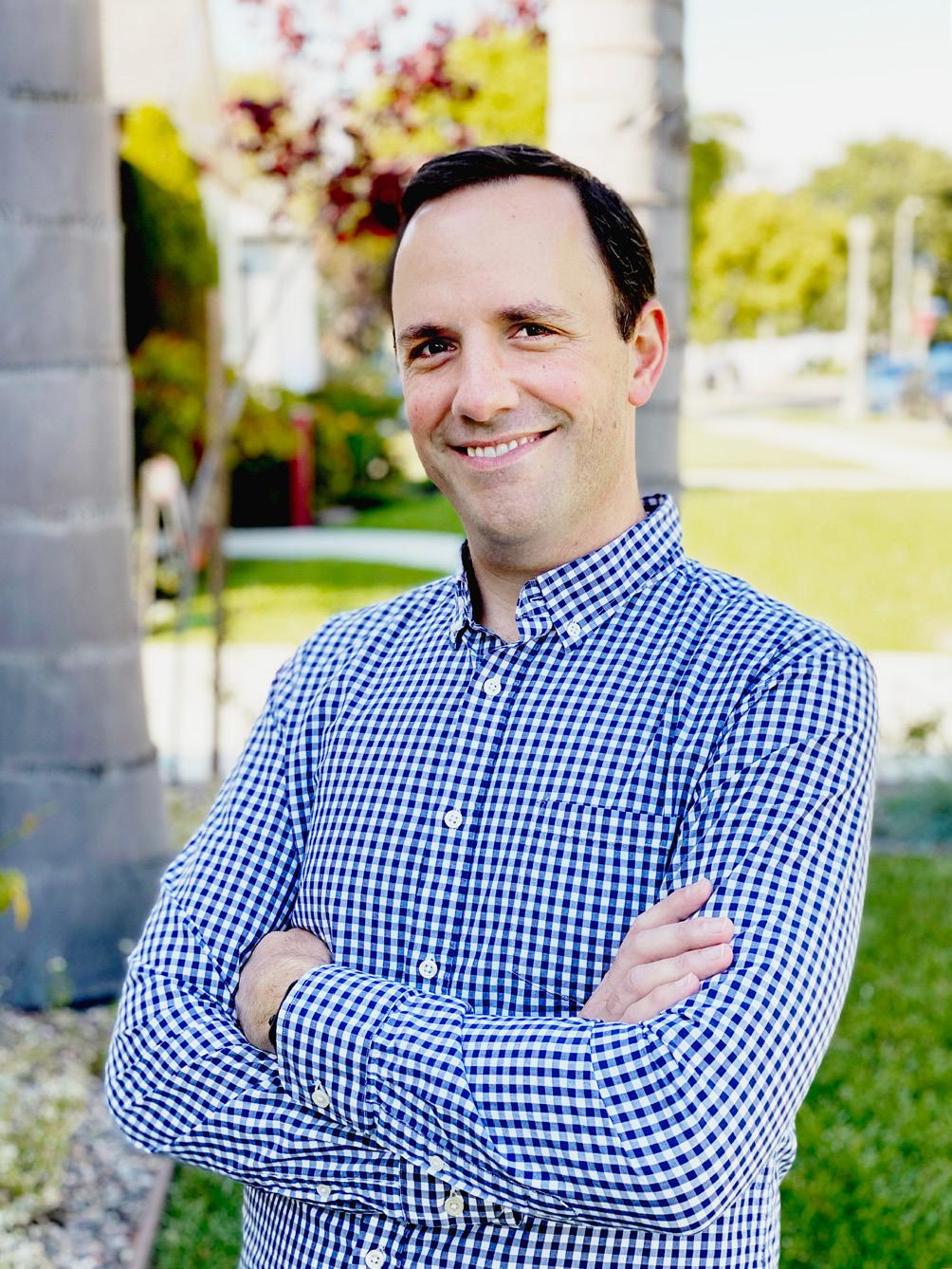
“I was impressed with every person that I met. I was impressed with their ability to balance highlevel, high-caliber legal work with a family life and just being nice, kind, caring people overall. That really drew me to the firm,” Feldman explains.
In addition to being surrounded by hardworking, genuine people, Feldman explored different areas of law. “I had the opportunity to do a little bit of everything as a young corporate lawyer, which was great. I did a lot of mergers and acquisitions, but I also got to do public company reporting work and equity offerings, which gave me a broad base of knowledge and a strong legal foundation,” he says.
After a six-year run with O’Melveny & Myers, Feldman faced a fork in his career. “I was at the point in my career where I had to decide,” he recalls. “Did I want to push to try to make partner at the firm, or did I want to try something else? For example, the in-house route?”
Then an opportunity arose through his wife’s law firm. “This company, Rubicon Project, was a client of my wife’s firm, and they had a really experienced general counsel who was looking for kind of a right-hand person to help him,” Feldman says. Feldman aced his interviews and moved in-house with Rubicon Project.
When he started at Rubicon Project, Feldman worked very closely with the former general counsel, Brian Copple. Through his network, Feldman had heard excellent things about Copple’s career and mentorship abilities, but Copple exceeded all expectations.
“Brian is someone who really likes to teach, explain, and guide as opposed to just mandating or telling you what to do,” Feldman says. “He always gave you the room to figure things out or to own a problem, but he also offered advice or shared his experience. He saw me as an equal, and he would run ideas by me as much as I ran things by him.”
Jonathan Feldman Former Co-General Counsel and Secretary The Rubicon Project
“I really enjoyed learning about how the law interacted with both business and music.”
Modern Counsel 157
Danielle Warner
Jon
and
Co-General Counsel & Secretary of Rubicon Project
When an external opportunity came up for Copple, he recommended to leadership that Feldman and another lawyer take over his responsibilities. Feldman believes that for the entirety of their working relationship, Copple was always training and mentoring him to eventually ascend to the general counsel role.
“He always tried to help me think like a general counsel: what they need to focus on, what they need to worry about, how to do a risk assessment, how to prepare for a board meeting,” Feldman explains. “He was methodical, and that is something I have tried to emulate as I have literally stepped into his shoes.”

As Feldman has navigated his co-general counsel role and whatever may come next for him professionally, he has strived to maintain work/life balance as a father of two. Since Feldman and his wife both serve as general counsel for their respective companies, time is tight, but that’s partly what makes it so precious.
“It is important to me to make it home in time for dinner and bedtime. It’s important to me to be there and see them grow up,” he says. “I want to be a present and connected dad, to be there for them emotionally or in any way that they need me.”
O’Melveny & Myers LLP: “I’ve known Jon for more than a decade. He is a pragmatic lawyer, looking to solve problems by addressing the business objectives and not just the legal hurdles. He is smart and flexible in his approach.”
–John-Paul Motley, Partner

applauds
Feldman
the bold and insightful leadership he brings to his role as
Century City Los Angeles Newport Beach New York San Francisco Silicon Valley Washington, DC Beijing Brussels Hong Kong London Seoul Shanghai Singapore Tokyo omm.com
As our client, alumnus, and friend, we’re proud to see your accomplishments recognized Congratulations
158
“It is important to me to make it home in time for dinner and bedtime. It’s important to me to be there and see them grow up.”
Throughout her career, Marla Nicholson has thrived on change. Now she’s putting the lessons she’s learned along the way to work as vice president and general counsel at Ciner Resources.
By Clint Worthington
Adaptability in Action
Modern Counsel 159
IF THERE’S ONE THING MARLA NICHOLSON VALUES,
it’s adaptability. It’s been a driving force in her career: she’s regularly stepped up to the plate and taken on new industries and responsibilities, even when she wasn’t sure she was ready. That willingness to accept new opportunities has led her to her position as vice president and general counsel of Atlanta-based materials company Ciner Resources (pronounced jin-ner). It’s also helped her cultivate mindfulness and strong communication skills that have served her well in her new role.
After graduating from Cornell Law School, Nicholson started her career in earnest at Atlanta-based firm Jones Day, where she gained a great deal of experience in securities and mergers and acquisitions (M&A) work. “It set a good foundation for me,” reflects Nicholson, but she quickly saw that her legal style didn’t align well with the competitive nature of firms. “I like to be in competition with myself, not anyone else,” she says. It became clear to her that the in-house counsel role was where she would thrive most.
She then moved to a software company called CDC, based in Hong Kong. There, she worked for three years on contracts, M&A work, and more. After CDC got bought out by a private equity firm, Nicholson made her biggest leap yet: data-focused tech company LexisNexis, first as corporate counsel and eventually as director and senior corporate counsel.
“[The industry] was supernuanced, very esoteric, and I’d never been exposed to it before,” she notes. Still, Nicholson mastered the steep learning curve for the highly regulated work of LexisNexis and was promoted to a director role within two years.
Two years after that came another big transition: moving to Ciner Resources. “It was time to explore other opportunities,” explains Nicholson, whose switch to Ciner meant not just a change in industry (Ciner specializes in the production of natural soda ash) but also in scale. While LexisNexis was like “working in your own mini law firm,” Nicholson says, Ciner’s legal group was much smaller.
But Nicholson saw the switch to Ciner as a tremendous opportunity to be a big fish in a small pond. “[The position] also came with exposure to the board,” she explains, “which is something I didn’t have before.”
At both LexisNexis and Ciner, Nicholson had to work hard to acclimate herself not only to different office cultures but also different industries. “It’s a tremendous leap,” she explains of changing industries. “You can’t appreciate the change until you’re in it.” Having different working environments affects how you practice, advise, and communicate with those around you, she says.
When it comes to team management, Nicholson values communication above all else. “Communication is all about looking at the folks you have,” she says. “It’s not one-size-fits-all; they’re people, not robots.” Both at LexisNexis and Ciner, she’s thrived by tapping into the strengths of the people she works with to effectively utilize their skills.
Nicholson has homed in on several key attributes that are necessary to successfully acclimating to these new environments. Mindfulness, for
Lead 160
“Communication is all about looking at the folks you have. It’s not one-size-fits-all; they’re people, not robots.”
instance, is a key component of adaptability; high emotional intelligence and an ability to adjust to change are paramount. “You have to be sensitive and mindful of the culture,” Nicholson says of joining a new team. “You don’t go in with preconceived notions.” She’s had to absorb information and cultural dynamics like a sponge, taking them in and folding them into her workflow.
The new role has come with challenges, though. “I’m very new in this position,” explains Nicholson, who became vice president and interim general counsel in October 2019. As the only member of Ciner’s legal department, she gets a lot of exposure to the business, doing everything from litigation to secretarial duties. She also makes extensive use of outside counsel, the management of which is its own unique skill set.
“You need to know your folks—which firm is good at this, which attorneys are good at that,” she explains. She advises in-house counsel to keep a diverse stable of attorneys around them to fill whatever niche they might need.




That said, Nicholson still feels she has a significant impact on shaping Ciner’s culture, which is exciting and daunting in equal measure. “There are ways you shape a culture that you’re not even cognizant of” in your work, she notes. Ciner’s a smaller company; it sports around five hundred employees, only forty of whom work in Ciner’s Atlanta headquarters with her. “When you jump, that splash is more impactful in a lake than an ocean.”
To fellow executives looking for advice on dealing with the ever-changing needs of an organization, Nicholson stresses the importance of perspective. “These kinds of changes are opportunities to grow in ways you haven’t grown before,” she says. One of the first things she does in a new environment is talk to colleagues who’ve been at the company longer than her—“the folks who’ve lived and breathed it for a while.” Don’t be shy about tapping into these resources, she says.
Much of Nicholson’s career in the last few years has been marked by incredible shifts in scope and responsibility. Luckily, she thrives on that kind of unpredictability. “The only thing that’s constant is change,” she says.

Hunton Andrews Kurth is a global law firm serving the world’s leading companies. Our industry focus spans the energy, financial services, real estate investment and finance, insurance, retail and consumer products, and technology sectors. With offices wellsituated throughout the United States, Europe, Asia and the Middle East, Hunton Andrews Kurth is poised to help businesses around the world navigate complex legal challenges. For more information, visit HuntonAK.com.



We congratulate Marla Nicholson, Vice President and General Counsel of Ciner Resource Partners LLC, for her accomplishments.
161
©2019 Hunton Andrews Kurth LLP
Joshua Lute, general counsel of Dutch Bros Coffee, leads his legal team in carrying out the company’s core values and mission
By Keith Loria
Cup of Culture
Lead 162
As an undergrad, Joshua Lute studied communication and aspired to enter the world of mediation and dispute resolution so he could help people solve problems. When he was looking into grad schools, a favorite professor recommended that if he really wanted to pursue this course, becoming a lawyer was the best way to do it. Lute took that advice to heart. After a few years in the “real world,” he made the jump to Willamette University College of Law, which was in the same city where his extended family lived, providing much-needed support to his wife and three children.
Joshua Lute General Counsel Dutch Bros Coffee

Modern Counsel 163
Sam McGehee
Although Lute never became a mediator, he has used his legal skills to help people work through issues—and work together—throughout his career.
He spent his first two and a half years after law school as a law clerk in the US District Court in Portland, followed by two years as an associate at Perkins Coie.
“I ended law school with five kids, so I was looking for a good job,” Lute shares. “I did well in law school, so it opened some doors I never really thought about. While I was working as a litigator, I realized I wanted to help build something that was bigger than myself— more on the constructive side of law.”
In 2012, he was hired as general counsel of Dutch Bros Coffee, based in Grants Pass, Oregon, where he continues today.
Landing the job was something of a full-circle moment for Lute. When he was sixteen, he worked at the local Dutch Bros coffee shop. Back then, it was a small-town mom-and-pop business run by two brothers, and Lute loved the culture.
Over the years, the business started growing and franchising, and Lute even worked at a franchise while studying for the bar, reconnecting with the family. So when he got a call from them about the general counsel gig, he knew it was meant to be.
In his role, Lute provides timely legal advice and assistance that helps Dutch Bros Coffee fulfill its goals of providing unparalleled service to customers and a compelling future for both employees and franchisees. Lute embraces the mission of the company as a “fun-loving, mind-blowing company making a massive difference one cup at a time.”
“Every day that our company responsibly spreads its mission to a new location is another day that I get to join in making the world a better place,” he says.
The company has plans to continue growing—with a goal of eight hundred shops—and Lute is playing a big part in that expansion. He’s hired a senior paralegal and two real estate attorneys and continues to acquire key talent.
He starts each day by checking in with his team and advises the board of managers and executive team on strategic issues and plans.
“My leadership style is that I really want people around me who are professionals and work as part of
the same team,” Lute says. “When I hire someone, I want them to be the expert in their job. If they need resources or help from me, they just need to ask, but I want them to be the professional. I’m the opposite of a micromanager.”
What Lute loves about the job is that he is charged with dealing with a wide variety of issues on a daily basis and has the team in place to make it all a reality.
“Our company is so multifaceted. We have roughly five thousand employees in seven (and soon nine) different states,” Lute explains. The company also has franchises across various states, which employ another seven thousand people, as well as a roasting plant where Dutch Bros manufactures its own coffee and develops its own product lines.
Another well-known facet of Dutch Bros is its community involvement. Annually, all the shops donate a day’s profits to the Muscular Dystrophy Association. Also, on February 14, or Dutch Luv Day, the company donates a portion of drinks sold to local food organizations. And a program is in the works that will allow a franchisee to sponsor an organization for a grant through the Dutch Bros Foundation.
The legal team plays a major role in these philanthropic efforts. Lute and his colleagues are responsible for drafting contracts and checking the verbiage on marketing materials to ensure help gets to those who need it most.
“We are a culture-first company, and we are about impacting our communities and supporting our employees,” he says. “If you look at the number of organizations that we or our franchises are supporting in the communities, it’s in the hundreds. We want to make sure we make the best impact. I know at the end of the day, this is something I believe in—giving back to the community and connecting with people. I know this is the right job for me.”
Morgan Lewis:
“Josh exemplifies the strategic vision and leadership that are critical to the general counsel role. He capably navigates complex legal and business challenges and instills a culture of collaboration and excellence among his team.”
–David McManus, Partner
Lead 164
Star Power
Winner of the 2019 Magna Stella Award, Mindy Harper advises and advocates for both her team and Mattress Firm as a whole
By Zayvelle Williamson
165 Modern Counsel
MINDY HARPER IS A STAR. THAT IS, she won the Texas General Counsel Forum’s Magna Stella Award in 2019, a coveted prize that designates Harper as a leader in the legal community. Indeed, as vice president and senior litigation counsel at Mattress Firm, the largest specialty mattress retailer in the United States, Harper has dazzled those around her with her litigation expertise, her strategic vision, and her commitment to putting a halt to unfair business practices.
Even a Star Needs a Team Harper has made a profound impression on both her Mattress Firm colleagues and outside partners since joining the company’s legal team just a few years back. “‘[M]agna stella’ means ‘magnificent star,’ and that is an apt description for . . . Mindy and [her] work handling litigation for our client Mattress Firm,” remarked John B. Thomas in a press release. Thomas is the cofounder of Hicks Thomas, the firm that nominated Harper for the Magna Stella Award.
“Mindy’s among the best in-house counsel I’ve had the pleasure to work with,” Thomas says. “She has nerves of steel and easily translates complex litigation into the language of business, making her an asset to her clients and outside counsel alike.”
“Complex” may be putting it nicely. In her role as senior litigation counsel, Harper oversees a dizzying array of litigation and claims related to Mattress
Harper VP and Senior Litigation Counsel Mattress Firm
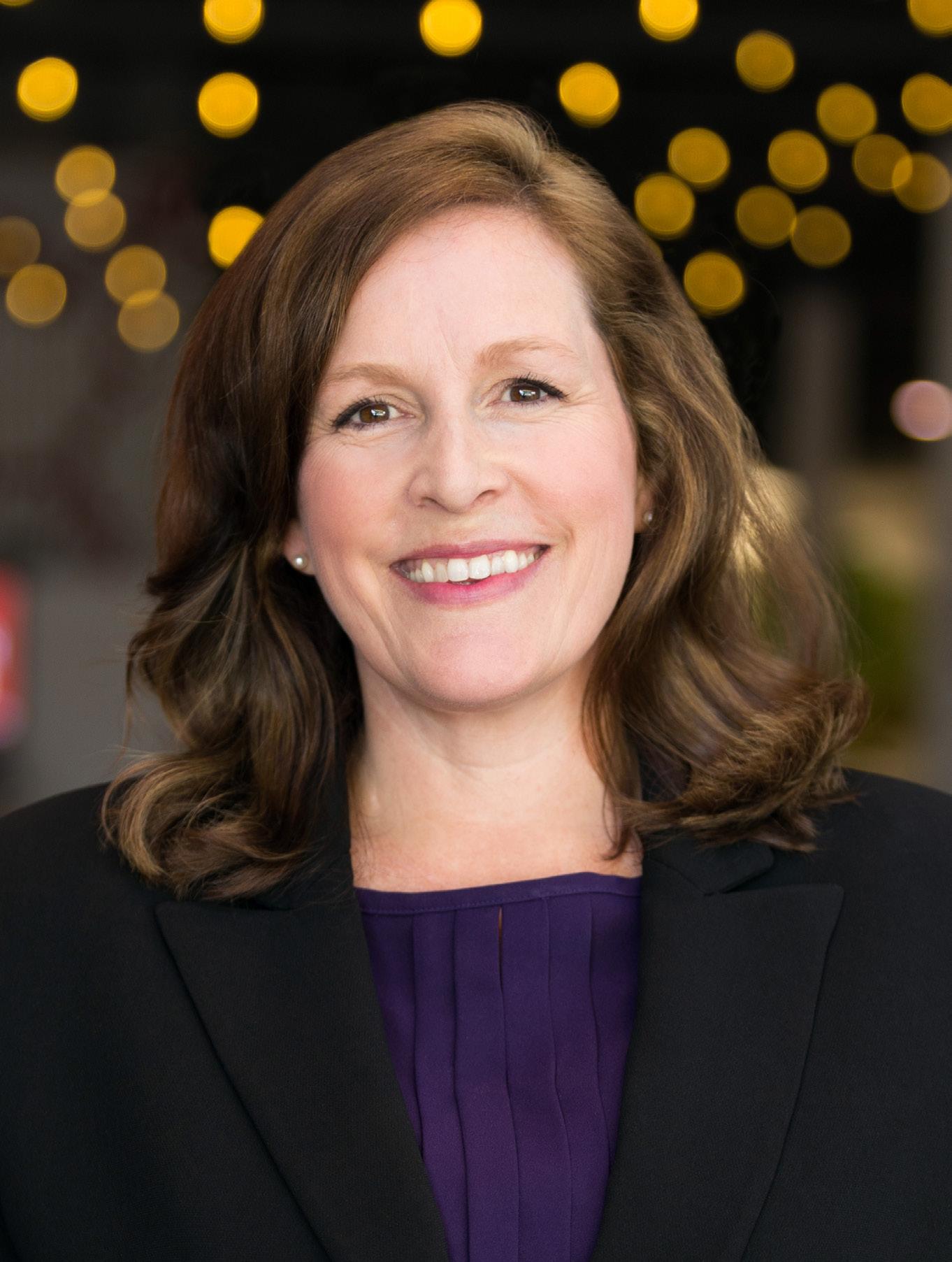 Mindy
Mindy
Lead 166
Patrick Hubbard
For the Dreamers
Mindy Harper knows that a helping hand can make all the difference. As a past board member for the “I Have A Dream” Foundation, she has helped empower children from underserved communities (“Dreamers”) across the nation pursue higher education and fulfill their potential. The foundation focuses on removing financial barriers to Dreamers’ education and building long-term relationships with both Dreamers and their families. Their aim is to ensure that Dreamers have the skills and knowledge to thrive in school as well as in life.
The impact of this work is clear in the numbers offered by the foundation:
18,000+ Dreamers have been served since 1981
200+ programs are offered nationwide
25 million students in US public schools are low income
9 percent of low-income students earn a bachelor’s degree, compared to 77 percent of their high-income peers
90 percent of Dreamers complete high school, compared to 74 percent of their low-income peers
Firm’s 2,500-plus retail stores. On any given day, she may be managing commercial disputes with competitors or landlords, supervising intellectual property and trademark matters, or directing the company’s approach to consumer disputes.
To keep atop of her many and varied responsibilities, Harper relies on her colleagues in the legal department. According to the VP, Mattress Firm’s legal team is primarily composed of women and includes many mothers. Everyone on the team is highly supportive of one another, Harper emphasizes, and is always eager to collaborate.
Mattress Firm’s legal team is led by Executive Vice President and General Counsel Kindel Elam, who overlapped with Harper during her stint at Fulbright & Jaworski (now known as Norton Rose Fulbright). In her seven years with that firm, Harper honed her litigation expertise, eventually rising to a position as senior associate thanks to her adept handling of commercial, product, personal injury, and insurance coverage litigation matters.
Responsibility Is the Name of the Game
In addition to leading the litigation function, Harper also serves on Mattress Firm’s safety committee. In that role, she regularly coordinates with the company’s risk management, customer service, and loss prevention teams to resolve operational issues and mitigate risk.
Modern Counsel 167
Everyone Deserves a Good Night’s Sleep
One reason Mindy Harper has found such a good fit at Mattress Firm is the clear alignment between her commitment to giving back and the company’s. Over the years, Mattress Firm has engaged in a number of initiatives designed to engage with local communities, including the Mattress Firm Foster Kids program.
Founded in 2015 through a partnership with the Ticket to Dream Foundation, Mattress Firm Foster Kids aims to help foster kids around the country stay healthy and do well in school by getting a good night’s sleep. Through this program, Mattress Firm provides various charities and nonprofits with both monetary contributions and “sleep essentials” like pajamas, toys, and books.
The program has been a rousing success. And in 2016, renowned gymnast Simone Biles partnered with Mattress Firm Foster Kids to help spread the word about how everyone can support the more than four hundred thousand children who call the US foster system home.
Harper is well acquainted with the requirements of this position, given the two years she spent as a senior risk management counsel for Baker Hughes, but it is by no means a role she takes lightly. In fact, in May 2018, Harper joined a panel of speakers organized by the University of Texas School of Law for the 40th annual Corporate Counsel Institute so that she could expound upon the importance of responsibly navigating business risks.
Active in the Arts
In addition to fiercely advocating for both her team and her entire organization at Mattress Firm, Mindy Harper is an active proponent of the arts. She has previously served as a board member of Opera in the Heights, a Texasbased nonprofit dedicated to helping emerging opera artists find career-defining opportunities to perform. She currently serves as a board member for the Houston Boychoir, a community organization that offers a musical education to all young boys eager to learn about music reading, music history, music theory, and other aspects of vocal performance.
During the conference, Harper and her fellow panelists spoke to the many legal and business challenges associated with natural disasters such as Hurricane Harvey. They discussed the various lessons that business leaders can and should learn from the fallout of such incidents, particularly highlighting the need to maintain positive relationships with employees as well as the public.
No individual, Harper and the other panelists argued, should be terminated from their position simply because they were trapped in a hurricane and were thus unable to come to the office. No business, they emphasized, should mark up the prices of essential supplies such as bottled water when the community is still suffering from the fallout of a hurricane.
To be sure, no organization should go without the expertise, vision, and guidance of a leader like Harper.
Larson • King, LLP:
“As outside counsel, I’ve observed Mindy leading her team with grace and humility. It is truly a delight and privilege to work with Mindy.”
–Mark Solheim, Partner
Lead 168
Campbell, Conroy & O’Neil,
is proud to recognize the accomplishments of Mindy Harper
We are honored to work with Mindy and be a part of the Mattress Firm team of outside counsel.

CAMPBELL TRIAL LAWYERS






Christopher B. Parkerson
cparkerson@campbell-trial-lawyers.com
(617) 241-3075
P.C.

You’re more than an executive. We’re more than a magazine. Join the network connecting leaders of the fastest-growing market in America. Visit hispanicexecutive.com For editorial consideration, contact info@hispanicexecutive.com
Evaluate
A look at the logistical challenges, evolving regulations, industry shifts, and cultural concerns outside the office that lawyers must analyze and navigate to manage their impact inside the office
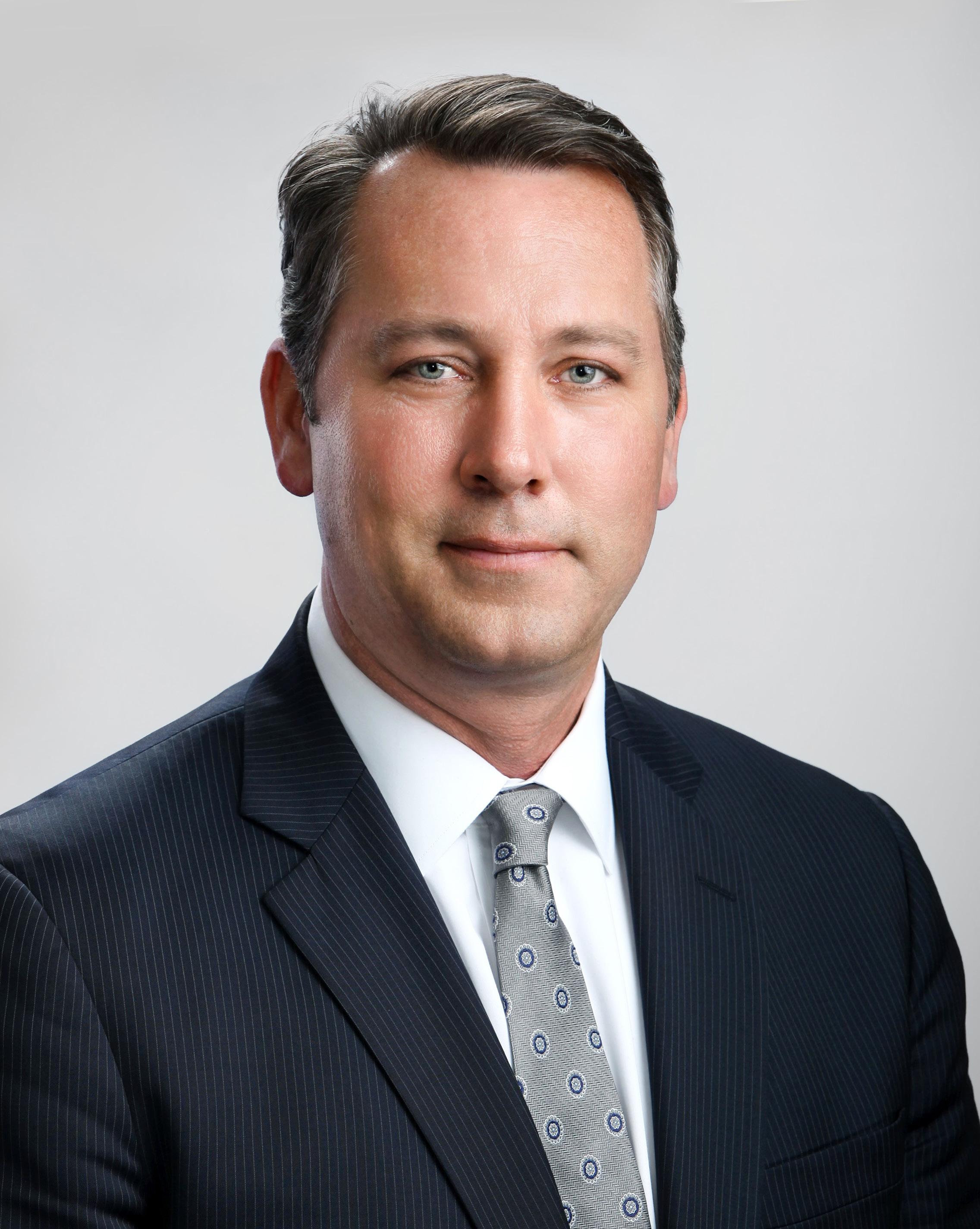 Martin Wheeler
Martin Wheeler
Evaluate 172
Steve Heinrichs Chief Legal & Compliance Officer, EVP, General Counsel, and Secretary Mueller Water Products
Physical Artifacts
After twenty-plus years in the manufacturing industry, Steve Heinrichs is using his wealth of legal experience to expand operations at Mueller Water Products
By Sara Verdi
Modern Counsel 173
IMAGINE WALKING DOWN THE STREET
in a metropolitan area—say New York City, for example. If you happen to see a fire hydrant, chances are that Mueller Water Products manufactured it. As one of the leading manufacturers of products used in water distribution in North America, Mueller is most likely responsible for the infrastructure that transmits the water to that fire hydrant too.
It’s true that a good portion of Mueller’s products go unseen, since they are subterranean or tucked behind walls. But Steve Heinrichs, Mueller’s chief legal and compliance officer, executive vice president, general counsel, and secretary, is working to make sure that Mueller’s work doesn’t go unnoticed.
Heinrichs is fascinated by the manufacturing industry. Admittedly, he is drawn to the honesty and necessity of it. “I love working for a company that makes physical things,” he says of Mueller. “Someone once explained to me that in heavy manufacturing, we develop ‘physical artifacts,’ and the water that comes into people’s homes, in all likelihood, has come in contact with these products or artifacts that our people have made. I love that! There’s something really special about that,” he enthuses.
He also appreciates how Mueller’s manufacturing plays an integral part in supporting small-town economies. “Almost all of manufacturing in America is done within small communities, so we have become a part of the communities our plants are in,” he says. “We support a whole host of ancillary businesses along the way, and I like being in a job that connects me like that.”
The Journey In-House
Beyond his personal ties to and interest in manufacturing, Heinrichs’s prior roles in legal for manufacturing giants have solidified his expertise working within this space. Before arriving at Mueller, Heinrichs started his legal career in private practice—but shortly thereafter transitioned in-house. “I was looking to get in-house because I felt like it was a good combination of my skills,” he explains. “I was always interested in the business side of the law. Some people think there’s a downside to having just one client, but I really like that aspect. In a multinational manufacturing environment, the array of issues and distinct ‘client’ interests, even within one company, is interesting and challenging.”
The appealing versatility of an in-house role and a desire not to be pigeonholed only strengthened his resolve to make a change. He started his in-house journey with American Commercial Lines, a marine transportation and manufacturing company.
“I really learned and cut my teeth in that environment,” Heinrichs says. “I did a lot of things that I had never done before, from labor and employment to intellectual property to environmental matters. I also got more experience in areas I was more familiar with, like corporate M&A and litigation. It was really a great lead into being a good in-house lawyer, which means having a broad base of experience.”
Though he only spent five years with American Commercial Lines, the expe-
“Almost all of manufacturing in America is done within small communities, so we have become a part of the communities our plants are in.”
Evaluate 174
Built for RESULTS
rience he garnered with the company was worth a lifetime in the legal space. During Heinrichs’s tenure there, American Commercial Lines transferred equity twice and refinanced multiple times, which made for an immense and varied legal workload. “It was an incredibly busy and sometimes difficult time, but it was also an amazing experience,” he recalls.
As Heinrichs notes, this position and the next, with a company called Mariner Health Care, collectively increased his corporate finance skills, which would play a large factor in both his future work and his interest in publicly traded companies. “I prefer to be in the publicly traded context,” he says. “I started taking calls after I had monetized my time at Mariner, and that’s when I got my first general counsel gig.”
Heinrichs was hired by Kimberly-Clark Corporation as the chief legal officer of their paper and pulp division but was soon reshuffled into a role as general counsel of a spin-off division called Neenah Paper. “There were just a handful of us, including our CEO, CFO, and myself, in a makeshift office, and we set up everything: corporate, payroll, policies, you name it,” he recounts. “We IPOd the business in 2004 and became an independently traded, New York Stock Exchange company.
“It was that year that I first held a top seat with a public company, and that was a super job,” he continues. “It truly reinforced my skill set and interest in rationalizing portfolios and strategic organization.”
After fifteen years with Neenah, Heinrichs made the decision to take his wealth of experiences in both manufacturing and corporate finance to Mueller.
An Eye on International Expansion
Now, at Mueller, Heinrichs is responsible for running the legal function for Mueller’s global organization, from traditional corporate practices in mergers and acquisitions to international law to various trade compliance matters. He is in charge of the “soup to nuts” legal function, as he puts it.
“Steve is one of those rare people who is able to seamlessly blend the boundaries between law and business, which makes
taylorenglish.com
Taylor English is honored to be a trusted partner and counselor of Mueller Water Products. We commend Steve Heinrichs for his innovative contributions to Mueller’s business success and his energetic and effective leadership of its legal department.
175
Celebrating excellence.
We proudly support a creative and dynamic leader, Steve Heinrichs, for his many accomplishments at Mueller Water Products.
Together we are honored to provide legal solutions that help Mueller Water Products continue to manufacture quality products for the community

him extremely valuable from the M&A perspective,” enthuses King & Spalding partner Cal Smith. “He has just as firm a grip on traditional legal issues as he does on the issues underlying a target’s P&L. It gives him tremendous credibility, both internally and externally.”
Though Mueller is primarily focused on the North American market, Heinrichs is hopeful that his prior experiences will help diversify Mueller’s portfolio and grow their global presence. “In terms of manufacturing, we have more than ten plants here in the United States and Canada. We have warehouses and operations in China as well as the West Bank and Tel Aviv in Israel. We have a relatively broad global presence,” Heinrichs explains.

Still, he hopes to grow Mueller internationally, with a focus on international manufacturing and serving local markets in new geographies. “Growing our business globally isn’t just shipping our products around the world,” he says. ”It’s actual physical participation in those key geographies and having a branded and specified position with municipalities and governments.”
To enhance its portfolio, Heinrichs speculates that Mueller could look into adjacent categories. “We’re not in wastewater, for example. We are a clean drinking water and natural gas distribution company, so could we go into wastewater? Could we go more into industrial spaces or agriculture? Those are all categories of products that we may have expertise in making but do not currently make,” Heinrichs explains.
Though this move could help address the question of business diversification, Heinrichs still has to consider how Mueller can solve its geographic conundrum. “We really aren’t in Western Europe,” Heinrichs says. “That’s another large, developed economy with massive levels of infrastructure that date back to pre–World War I times. The global infrastructure is really old, and it’s a business with really good bones, so it’s a matter of finding a pathway to get into those markets.”

troutman.com Trou t man Pep p er H amil to n S and er s LLP
176
Heinrichs believes that operating in countries in Western Europe, like France or Germany, requires a local presence. “These countries are relatively provincial, and they already have companies doing the manufacturing for them,” he says. “As my German colleagues say, ‘Life is not a pony farm.’ It can be difficult to find actionable and attractive targets, and while developing this side of this business is something that is difficult, I do love it.”
Heinrichs asserts that Mueller’s historic focus has been on manufacturing, but he believes that with a small perspective shift, it can grow both its product offerings and the company globally. Luckily, Heinrichs is just the man for the job. “This is something that I both have a lot of experience in and, ultimately, what I love to do.”
Taylor English:
“It has been an honor to partner with Mueller Water Products over the past ten years. Steve is a confident and innovative leader, committed to the pursuit of excellence for Mueller and his legal team.”
–Jeffrey Kuester, Partner
Troutman Pepper:
“Steve Heinrichs is one of the best deal lawyers in the country. He has the unique ability to drive the legal deal to completion while never losing sight of the big picture strategic business issues.”
–Mike Hobbs, Partner
177 kslaw.com
King & Spalding congratulates and is proud to partner with Steve Heinrichs, who is keeping Mueller Water Products in the lead.
Leading the Way
ThreeDimensional Chess
Marubeni America Corporation’s Jerome E. Barnett reflects on thirty-six years of bridging culture gaps and handling compliance for the principal US operating company of a major Japanese trading company
By Billy Yost
Evaluate 178
AS SENIOR VICE PRESIDENT OF COMpliance for Marubeni America Corporation, Jerome “Jerry” E. Barnett finds himself in one of the more complicated situations a compliance attorney can encounter. “We are a company that is Japanese owned, operated in the United States, but with extensive Japanese and other foreign involvements and activities,” Barnett explains. Marubeni America Corporation is the largest member of the Marubeni Group, which is headed by Marubeni Corporation, a major Japanese trading company. Marubeni Group comprises a network of more than 125 Marubeni Group offices in sixty-eight countries and more than 450 associated companies worldwide. “It really does feel like three-dimensional chess,” Barnett says.
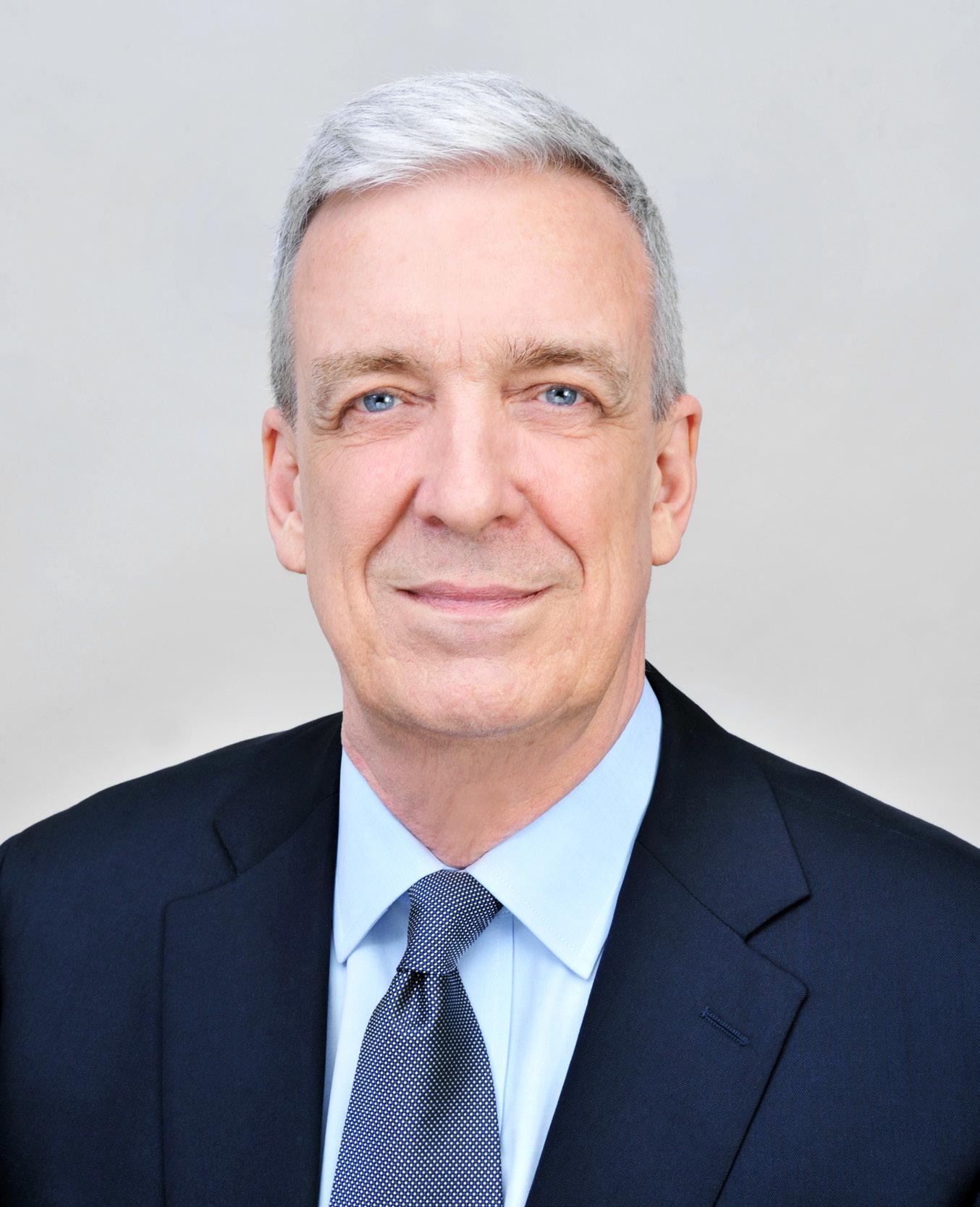
While he’s been in his current role since 2009, Barnett is essentially a lifelong “MC” devotee, having just celebrated thirty-six years with the principal American subsidiary of Marubeni Corporation. It’s not by accident or happenstance that Barnett found himself intricately woven into enabling business across countless jurisdictions and regions. Japan left an impact on the young University of Wisconsin graduate, and he’s intent on overseeing an integrated and synergetic compliance effort that will keep an enterprise he believes in secure and successful long after his tenure ends.
From Madison to Yokohama
Barnett knew he was interested in Japan before he was interested in becoming a lawyer. “I’m still surprised that I went into law, even though both my maternal and paternal grandfathers were lawyers, my dad was a lawyer, and my mother became a lawyer later in life,” the attorney says. “I went through some ups and
downs in college where I really had to figure out a path for myself and decide what I wanted from life.”
Barnett’s goals weren’t to make partner at a massive firm or to land a deal that would make him a household name in law. “This may sound strange, but I just wanted a spouse whom I loved and who loved me. I wanted a socially useful job that I believed in. I wanted to have outside interests that suited me and could be another avenue for learning and growth. And maybe a house in the country.” Over the next forty years, Barnett would achieve his goals, his kōseki (business achievements), by uniting his love of culture with his career.
As an undergrad, Barnett studied under the eminent author and East Asian historian John W. Dower. He was part of the first graduating class of East
Sean Yoo
Modern Counsel 179
Jerome E. Barnett SVP, Compliance Office Marubeni America Corporation
Expertise Spotlight
Helena Agri-Enterprises, LLC is a complete agronomic solutions provider headquartered outside of Memphis in Collierville, Tennessee. Helena’s core business as a multifaceted retailer and distributor is to provide its customers in the production agriculture and specialty markets with the tools they require. The absolute measurement of Helena’s success is the success of its customers. That’s why Helena markets and sells innovative products and services to improve productivity and deliver greater customer returns. Helena is one of the only retailers and distributors with expertise in formulation, research and development, precision technology, professional application, and manufacturing.
Helena is owned by Marubeni America Corporation, its parent company since 1987. It has grown to become one of the nation’s foremost agricultural and specialty formulators, with six thousand employees and 450 locations in fortytwo states and a growing international presence. Helena ranks near the top nationally in volume and sales in crop protection products, fertilizer, custom application, seed and precision agriculture, as well as turf management, industrial weed control, forestry, aquatics, and more. As a sustainable solutions provider, Helena is focused on the application of knowledge, helping its customers make critical decisions about soil variability, nutrient and water availability, seed selection, and pest management. Though much has changed over the years, one thing remains the same: the need to produce more on existing acres globally. Its core belief in People… Products…Knowledge…is the formula to guide Helena into the future.
Helena is supported in its day-to-day endeavors by internal legal, regulatory, and government affairs departments. Assisting in the support are various outside counsel with whom Helena has enjoyed long-standing relationships and Marubeni legal and compliance staff, including—for the past thirty-three years—Jerome Barnett.
Asian Studies majors at the University of Wisconsin, where he would also earn his JD.
After graduating from UW Law, Barnett was not entirely sure what direction his career should take. “I remember interviewing at a Wisconsin firm where the person interviewing me asked me what kind of fish I would be as an attorney. And I said something along the lines of a rainbow trout,” Barnett remembers. “He stopped me and said, ‘Absolutely not. I need a barracuda.’ The hustle and bustle of private practice just didn’t seem like it was going to suit me.”
Soon thereafter, Barnett made the leap to Yokohama and Tokyo on a Japanese Ministry of Education Fellowship. He then earned a master’s in economics from Yokohama National University.
Fortunately, Barnett soon found the meaningful experience he was looking for at Baker McKenzie in Tokyo—an experience that has stayed with him far longer than being asked what kind of fish he would be. “I had been working on a spin-off deal for a company whose future was in doubt, and I essentially whiteboarded a strategy that kind of bridged the gap and helped the deal go forward,” Barnett remembers.
There was a party to celebrate the deal, and at the evening’s end, the staff of the newly divested Japanese company lined up to individually thank Barnett. “I never really got over it,” Barnett admits. “That experience somehow led to my decision to work within the Japanese business sector.” And it’s how he would find his way to Marubeni America Corporation.
Bridging the Gap
Barnett has been with MAC for thirty-six years, and he says it took him around fifteen to feel like he truly understood the inner workings of a Japanese company operating in America. Although he had previously worked as a translator, spent years in Japan, and immersed himself in the culture of the country, he still had a lot to learn.
“First and foremost, there is the consensus-style decision-making that means everyone is in the room together at the same time,” the attorney explains. “Sometimes that can seem formulaic because it can just be a ratification, but it’s the work that goes into getting there that is the rewarding part for me.”
Evaluate 180
“Jerry’s ability to understand and work with people from differing backgrounds has proven invaluable in his support of Helena Agri-Enterprises and in Helena’s growth under Marubeni’s ownership,” says David W. Hawkins, vice president and chief legal officer at Helena Agri-Enterprises, a subsidiary of Marubeni America Corporation. Hawkins has worked with Barnett for more than twenty years. “Jerry is an expert in his field and cares about Helena’s business and people. Helena and I continue to benefit from his guidance.”
As for his compliance role, Barnett says many foreign-owned companies have a very difficult time adapting to US-style compliance. When it came to translating Marubeni’s rule set into a wider North American compliance effort, there was a great deal of work to be done.
“We have worked to develop a system that can be meaningfully applied to both our major and minor subsidiaries,” the SVP explains. “They range from meatpacking to grain traders to solar panel testing; we adopt our parent company rule set but tailor the rules so we’re able to tie each into our five formal US-style compliance programs. It’s worked very well.”
One of the biggest victories over time, Barnett says, is the active and ongoing communication between Marubeni Corporation and its North American subsidiaries. “We’re able to comment on each other’s approaches in a way that is real progress in terms of creating a climate for overall group governance,” Barnett says. “While our parent company is a major Japanese public company, we have more assets in the US than anywhere else, so that makes effective and ongoing communication essential.”
Over the course of his legal career, Barnett has felt a meaningful change of titles. “I eschew the phrase ‘in-house’ or ‘corporate lawyer,’” the SVP says. “I think
of myself as an enterprise lawyer, and the more I understood what that meant, the better lawyer I became.”
Moreover, the SVP has been able to help drive business for an entity he believes in. “You have to have patience in a role like this. You have to have that gambatte (do your best and go for it) attitude,” Barnett explains. “But I believe in this company, and I enjoy the people I work with here. And I plan to carry this compliance effort through to make sure that when I leave, the structures we’ve put in place and the people I’ve been able to mentor will be ready to carry the effort forward.”
Modern Counsel 181
“I plan to carry this compliance effort through to make sure that when I leave, the structures we’ve put in place and the people I’ve been able to mentor will be ready to carry the effort forward.”
HONORING JEROME BARNETT
MARUBENI AMERICA CORPORATION

Helena Agri-Enterprises, LLC congratulates our friend, Jerome Barnett, on his feature article, and we thank Jerry for his 33 years of support and guidance to the employees of Helena and to Helena’s mission of providing best-in-class goods and services to America’s agricultural producers.












 By Zach Baliva
By Zach Baliva
Safety Assured
JENNIFER BARTH WAS AN HR MANAGER WITH A LAW degree when she realized something: her employer was spending a lot of money on outside legal expenses. The year was 2010, and Missouri Employers Mutual (MEM) didn’t have a general counsel. Barth volunteered to review contracts, slowly took on more legal responsibilities, and ultimately became vice president, general counsel, and corporate secretary. Barth, who joined MEM in 2005, says the perfect combination of culture, opportunity, and purpose has kept her at the workers’ compensation provider for more than fifteen years.
In 2020, MEM celebrated its twenty-fifth anniversary. As the number one workers’ compensation provider in Missouri, MEM is the company employers turn to for a personalized approach and comprehensive safety programs. A partnership with Previsor Insurance, an independently managed company owned by MEM, allows MEM to cover employers with multistate needs and offer coverage in six other midwestern states.
Evaluate 184
Jennifer Barth takes Missouri Employers Mutual Insurance Company from provider to partner with a true commitment to all things related to safety
But Barth says MEM is more than a traditional insurance company. In fact, she sees it as a workers’ compensation partner. “We are a safety company that sells insurance,” she says. “We advocate for safe workplaces and provide innovative and cost-efficient programs that allow our policyholders to ensure that their employees go home to their family and friends.
I am proud of what we do.”
While workers’ compensation is often seen as a mandatory expense that delivers little value unless injury occurs, MEM sees workers’ compensation insurance as more than the basic promise every carrier makes to pay claims. MEM works with its policyholders to build a culture of safety that turns employees into Safety Fanatics.
One way they do this is through an innovative service portfolio known as SafetySmarts. The services, which Barth helped design and launch in 2016, improve and reward workplace safety. Through its Safety Dividend program, employers with safety programs and success in reducing injuries receive a return of a portion of their policy premiums. MEM also offers matching safety grants of up to $10,000 to help policyholders purchase and install equipment that enhances safety in the workplace. The portfolio also offers a 24/7 nurse triage line and postoffer employment testing.
Innovation is just one of MEM’s stated values. Others include safety, service, caring, integrity, and accountability. Those values help form the corporate DNA that’s kept Barth at the company for so long. “We provide our employees with a good compensation and benefits package and a great physical environment. But we also have an excellent company culture, and that helps us provide excellent customer service,” she says. Through workers’ comp and safety training programs, MEM helps keep both policyholders’ employees and its own employees healthy. The insurer implements the policies it shares with clients with its three hundred employees in four workplaces, ensuring the organization practices what it preaches.
In addition to an excellent internal culture, MEM has always supported career development and continues to encourage professional growth opportunities. “I’ve learned and grown here while trying new things and finding fresh ways to contribute to what we’re all doing together,” Barth says. She’s relied on
Jennifer Barth VP, General Counsel, and Corporate Secretary Missouri Employers Mutual Insurance Company
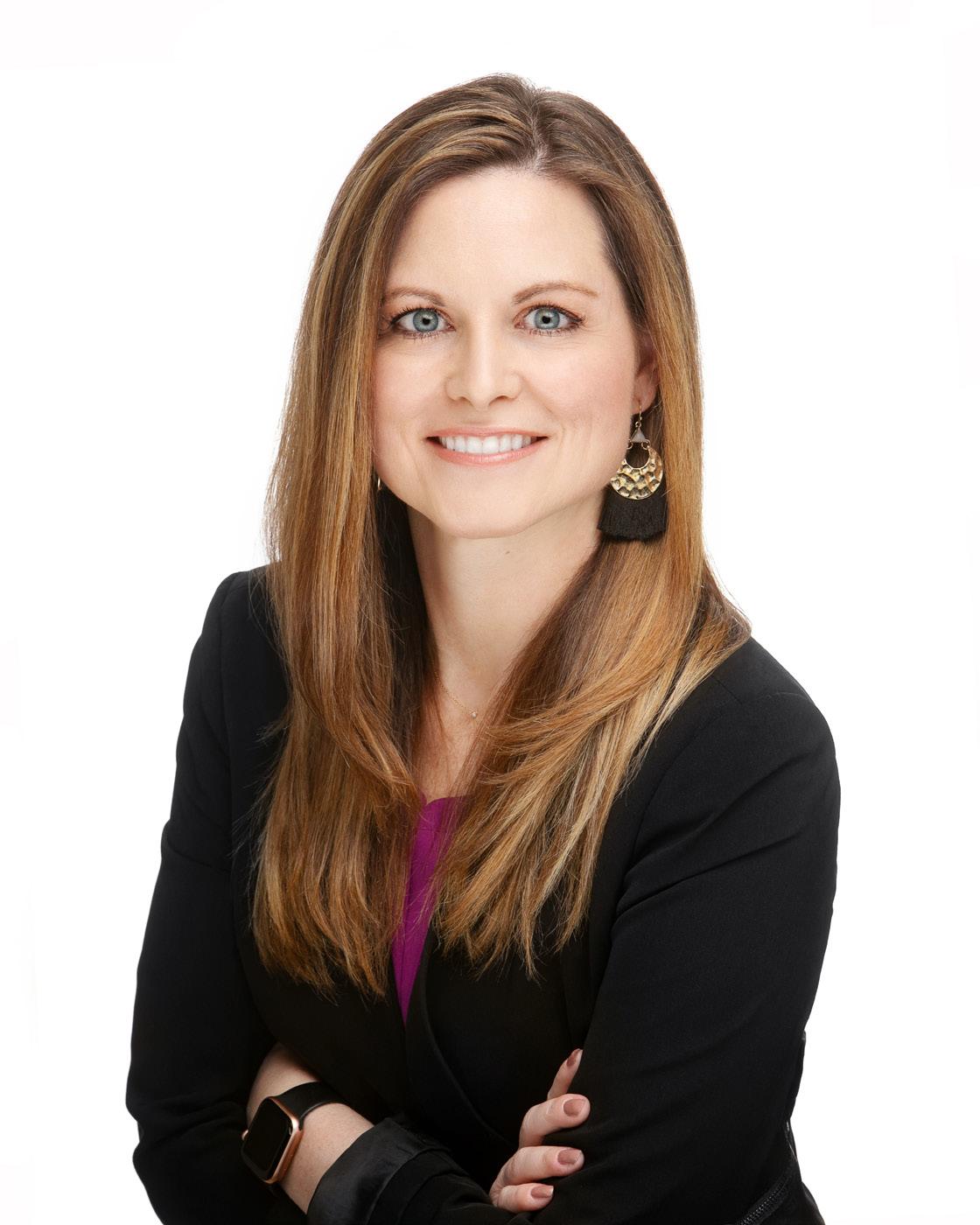
Annika Miller
Modern Counsel 185
mentors and outside counsel to help her layer the nuances of insurance, regulatory law, and corporate law on top of her strong foundation in employment law. Barth’s stint as an HR manager gives her unique insight into the needs and preferences of company employees and how their work ties into the bigger picture.
A general counsel role in a relatively small company requires Barth to serve in many functions. She leads MEM’s business continuity planning (BCP) team, a crossfunctional group that contemplates corporate response to tornadoes, power outages, and other disasters. In 2020, COVID-19 put MEM’s pandemic response plan to the test. Barth and her colleagues executed an established plan and met twice per week to assess and adjust. By moving to a work-from-home model, MEM was able to provide uninterrupted customer service and push information and resources to policyholders.
The BCP is an important piece of the job for Barth because it helps MEM provide and project confidence and stability. That helps the insurer turn challenges into opportunity, even in uncertain times. “We can’t know what the future holds, and neither can our policyholders,” Barth says. “But I’m proud to work for an organization they can trust to be here to keep their employees safe in all situations.”
Your Partners for Economic Growth
in Missouri.
Jennifer, you are a model attorney: knowledgeable, prepared, and always thorough. You epitomize the values of strength and leadership by action and example. Congratulations on your recognition by Modern Counsel
.
— Scott R. Pool Partner, GPT
&
(573) 636-2614 Jefferson City, Missouri pool@gptlaw.net gibbspoolturner.com
186
“We can’t know what the future holds, and neither can our policyholders. But I’m proud to work for an organization they can trust to be here to keep their employees safe in all situations.”
No Stone Unturned
Michael Appelbaum of Goldberg Segalla brings a sharp investigative eye to all his cases, including a unique trial where he proved social media evidence belongs in the courtroom
By Courtney Ryan
Modern Counsel 187
EVERYONE HAS SEEN THE HOLLYWOOD TRIAL
where the underdog defense team produces evidence in the final hour and uses it to cross-examine the plaintiff. The jury gasps, the innocent defendant is saved, justice has prevailed, and the audience cheers. That is, until the attorney in the room sighs and says, “That would never happen in a real trial.”
Usually, that’s true, but in Michael Appelbaum’s case, the Hollywood version really happened, thanks to his social media investigation skills.
“This was honestly a case I was prepared to lose,” says Appelbaum, a partner at Goldberg Segalla with many years of trial experience, of the initially routine automotive liability case. Two drivers both claimed to have crossed an intersection with a green light while the other had the red light, resulting in an accident. Unfortunately for Appelbaum’s client, a UPS driver came forward as a witness, claiming he saw the defendant run the red light while on the phone.
“I believed my driver, but I admit he does not make the best impression,” Appelbaum says. “Whereas the
plaintiff was very well put together. He was very polished, very well spoken, very likable—just a downto-earth kind of guy. And I thought [the jury] would really like this guy.”
To avoid a scenario where the plaintiff and his client were each 50 percent at fault for the accident, Appelbaum knew he had to find a way to cast doubt on the witness’s testimony. That’s when social media evidence changed everything.
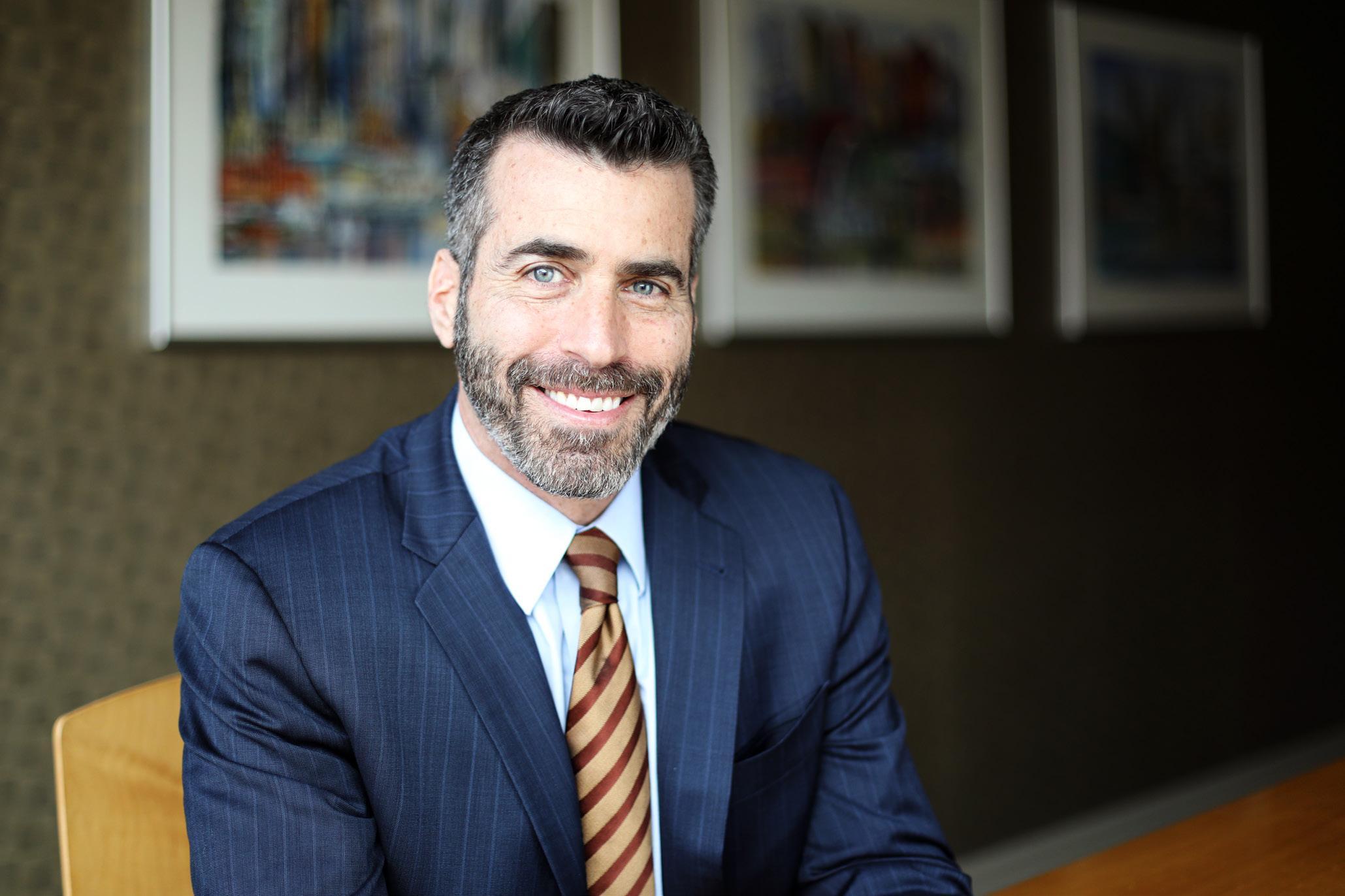
“There is relatively little case law available on the use of social media, especially on its use in the courtroom,” Appelbaum explains. However, litigators have increasingly used social media when investigating the opposing side. Many people maintain public accounts, making obtaining information somewhat easy.
“The challenge is how we use the information at depositions and at trial. Just one week before my trial, one of my partners attempted to use the same type of evidence in another court, and he was denied outright. Judges and attorneys are still trying to figure this out,” Appelbaum says.
Courtesy of Goldberg Segalla
Evaluate 188
Michael Appelbaum Partner Goldberg Segalla
Appelbaum has handled numerous cases where social media evidence was used at a deposition. Usually, the evidence constitutes pictures or video of the plaintiff engaged in activities that an injured person shouldn’t be doing. But in these circumstances, the evidence has to be turned over to the plaintiff’s counsel before the deposition to avoid surprise.
“There are no ‘gotcha’ moments allowed,” Appelbaum says. “If you try to surprise the plaintiff and catch them in a lie, you risk being precluded from introducing the evidence at trial.”
This trial was unique both because the information Appelbaum found came from a nonparty witness and because he would be questioning the witness, not the plaintiff. This allowed for that cinematic element of surprise typically reserved for fictional trials.
The witness had testified multiple times that he and the plaintiff had never met and had no connections whatsoever. But what Appelbaum uncovered while scouring Facebook and other social media platforms told a different story.
Once the witness appeared in person in the courtroom, Appelbaum knew he wasn’t mistaken: the Facebook photos clearly showed the plaintiff and witness together. But he still had to turn this information into evidence.
“If I just opened up with, ‘Do you have a Facebook account?’, he could have said no, and I would have been out of luck,” Appelbaum says. “I had to establish sufficient evidence that tied him to the Facebook account before revealing the source of my information.”
Appelbaum asked the plaintiff about family members, friends, and hobbies, such as fishing. “Counsel objected multiple times because he had no idea where I was going with this,” he recalls. “The judge was also confused, leading me to beg for his patience several times.”
Finally, after confirming he had accurate information on the witness, Appelbaum asked pointblank if he had a Facebook account. At first, he
denied it, but Appelbaum established the account was indeed his.
And then it was time to reveal three photos he had uncovered that showed the witness and plaintiff acting chummy together. The final challenge was getting the witness to acknowledge it was indeed him in the photos with the plaintiff. Only then could Appelbaum enter the photos as evidence to the jury.
Luckily, the witness squirmed. “I made it clear that I knew about his personal life, and he was visibly uncomfortable. When shown the first two photographs, the witness flat out denied that the man who was obviously the plaintiff was in fact him. Perhaps it was the mounting discomfort that caused him to change his tactic on the fly,” Appelbaum says. “When I showed him the third and final picture, I asked the question in my most snarky and incredulous tone of voice. After he identified himself, I again pointed to the man that I knew was the plaintiff and asked who it was. His [affirmative] response set out a collective gasp from the jury.”
Even then, the witness maintained he had never met the plaintiff. But it was too late—no one believed him. Appelbaum was prepared to show a video of the two discussing their shared interest in fishing, but opposing counsel advised that the video would not be necessary. The claim was discontinued on its merits in open court, and the plaintiff was left with nothing.
“Social media evidence is investigatory material that attorneys can use in many different ways and should be a part of every litigator’s tool kit,” Appelbaum says. “Getting your hands on it is one thing; being able to use it the right way is another. There’s a bit of a blueprint here.”
Diamond Medical Examinations:
“Mr. Appelbaum is honest, diligent, and competent. He has extensive experience and an in-depth understanding of injuries, which makes him consistent and well prepared. He has the ability to see all details of a case to arrive at sensible conclusions.”
–Emma Zawisky, Director of Operations
Modern Counsel 189
Student Housing 2.0
Gone are the days of cramped rooms, bunk beds, and treating students with a herd mentality. The Scion Group’s Eric Bronstein describes how Scion has created a new standard for the student living experience.
By Zach Baliva
Eric Bronstein EVP and General Counsel The Scion Group
 Courtesy of The Scion Group
Courtesy of The Scion Group
Evaluate 190
When the firm made Bronstein a nonequity partner, he celebrated. He quit two days later.
What seemed like an abrupt exit was a calculated risk that Bronstein had dreamt about for months. “I went to law school because I love logic and critical thinking, but I knew I didn’t want to be a lawyer forever. I knew the skills I learned early in my career could be applied to really create value, if I just found the right opportunity,” he explains. That opportunity came through his younger brother, Rob.
Rob Bronstein, then a commercial lease broker, had helped the School of the Art Institute of Chicago create its first purpose-built student housing project. As the Bronstein brothers talked, they realized a sea change was on the horizon. Millennials were about to spike college enrollments to record numbers. And those colleges lacked adequate housing options.
Buoyed by their early exposure to real estate, finance, and law, the Bronsteins drafted a business plan. The Scion Group was born. The brothers opened their first office in Rob’s spare bedroom.
Twenty years later, Scion has become the country’s largest privately held owner/operator of student housing, with nearly sixty thousand beds and $5 billion in assets under management, in partnership with investors. The company has 180 corporate employees and more than 1,300 overall. During those two decades, it has also advised more than two hundred colleges and universities.
Although Bronstein left private practice, he says that experience is still relevant to managing acquisitions, business transitions, and the occasional dispute as Scion’s executive vice president and general counsel. “I write better contracts and negotiate better deals because of
In 1999, Eric Bronstein was a fifth-year associate at a Detroit law firm. The partners had supported his decision to move from litigation to transactional law. He was newly married. The Lions were on their way to the playoffs. Life was pretty good. But something strange was happening. Bronstein watched as college friends and young clients started dotcom businesses and attracted high-dollar investments.
Modern Counsel 191
Meanwhile, his value in private practice seemed tied solely to his ability to clock time and bill hours. Then he missed out on an opportunity to join a wildly successful start-up.
what I learned in litigation,” he says. Bronstein further honed his legal skills by working as in-house counsel for a Fortune 100 automotive supplier while moonlighting at Scion until going full-time in 2006.
Today, he leads a small legal department that includes three other attorneys and four paralegals. Since Scion acts as investor, owner, and operator advisor at more than eighty properties with hundreds of residents each, his department is busy.
Each student has their own contract, and most have a financial guarantor with their own contract as well. Scion generates and executes more than one hundred thousand contracts per year. The company adapts its own custom-built electronic contracts to comply with varying state and local laws and uploads them to one centrally managed database. The system must be easy and painless for a prospective customer, yet still give the company consistency and centralized control.
Despite the high volume, Bronstein’s legal team is ultraresponsive and hands-on. Property managers

are trained to send concerns about contract questions, fair housing, or myriad other issues to email addresses monitored by the legal department. The team spends many hours each week drafting issue-specific letters based on proven response models, which property managers can send out in their own names. Bronstein has worked to position his department as a trusted ally and resource, ready to provide a quick answer or ad hoc training.
“We don’t charge our properties for our time because we’re also an owner, so we see these legal services as baked into our relationship,” Bronstein says. “Our managers don’t need expensive outside counsel every time they encounter a problem, and the approach gives us consistency in brand and message throughout our large portfolio.”
The Bronsteins and their leadership team have met clients’ expectations and redefined student living. Two decades ago, college students lacked options. They typically lived on campus in aging, unattractive, Courtesy of The Scion Group
Evaluate 192
Alight at Purdue University in West Lafayette, Indiana, is one of the Scion Group’s communities. Scion’s brands are designed to reflect residents’ personalities and provide an identifiable experience while keeping pace with changing customer preferences.
utilitarian residence halls, or off campus in a hodgepodge of often unsafe local rental housing. The Scion Group has never sought to develop new construction, but through acquisitions, it has amassed a national portfolio of upscale apartment complexes off campus, and some managed properties on campus, that offer security features, ample amenities, on-site management, shuttle buses, and other conveniences.
“We’ve studied the market and responded accordingly,” says Bronstein. “College students are looking for real communities and a distinct experience, and that’s what we provide.”
Because the company can do this at scale (Scion acquired $4.5 billion in assets between 2016 and 2018), it can deliver its services at competitive, cost-effective rates. Today, as Generation Z moves in, Scion is migrating its properties into four main brands (Alight, Lark, Redpoint, and Ion), designed to reflect the personalities of the residents and provide an identifiable experience while keeping pace with changing customer preferences.






It’s been two decades since Rob and Eric Bronstein spotted an opportunity and started Scion. They have played a key role in making student housing a respected subsector of the residential real estate market. As purpose-built onand off-campus communities become the new standard, and with an in-house legal department turbocharging its engine, Scion is poised for continued growth.
–Ryan D. Watstein, Partner
KABAT CHAPMAN & OZMER LLP PRACTICE AREAS Commercial Litigation Class and Collective Action Defense Labor and Employment TCPA and Privacy Financial Services White Collar Defense www.kcozlaw.com A LITIGATION AND COMPLIANCE BOUTIQUE WITH A NATIONAL PRACTICE
Kabat Chapman & Ozmer LLP: “Eric is the rare combination of a skilled lawyer and advisor, a savvy businessman, and an all-around good person. That makes him an ideal in-house partner and a tremendous asset to his organization.”
193
Revolutionizing an Industry
Steven Weisbrot has modernized the class action notice and claims industry with Angeion Group
By Courtney Ryan
WITH RAPIDLY EVOLVING TECHNOLogy, processes that were once taken for granted can easily become obsolete. That is, unless someone takes an active role in their evolution.
Take, for example, the class action notice and claims industry. For decades, if a consumer turned out to be a class member due a settlement payment, they would learn about it in their local newspaper or see an ad in the back pages of popular national magazines such as People. But as more information turned digital, class action notices remained analog, and fewer people learned that they were class members of a wide variety of settlements.
“The reality is, if a class member never sees the ads we take out and the judge approves the settlement, that class member can never make the
claim again,” says Steven Weisbrot, partner and chief innovation officer of the comprehensive settlement management services company Angeion Group. “It’s very important to the judge, and to the whole system, to ensure that we are providing the best notice practicable and that we’re doing it the right way.”
Angeion Group operates much like an advertising agency, except its sole purpose is to reach consumers who have already completed a purchase and need to be made aware of a class action settlement involving their purchase. Weisbrot is one of just a handful of class action notice experts in the country and is largely responsible for taking class action notifications digital.
“When you start a company, there are always butterflies and nerves, but to a certain extent I always expected that we
Evaluate 194
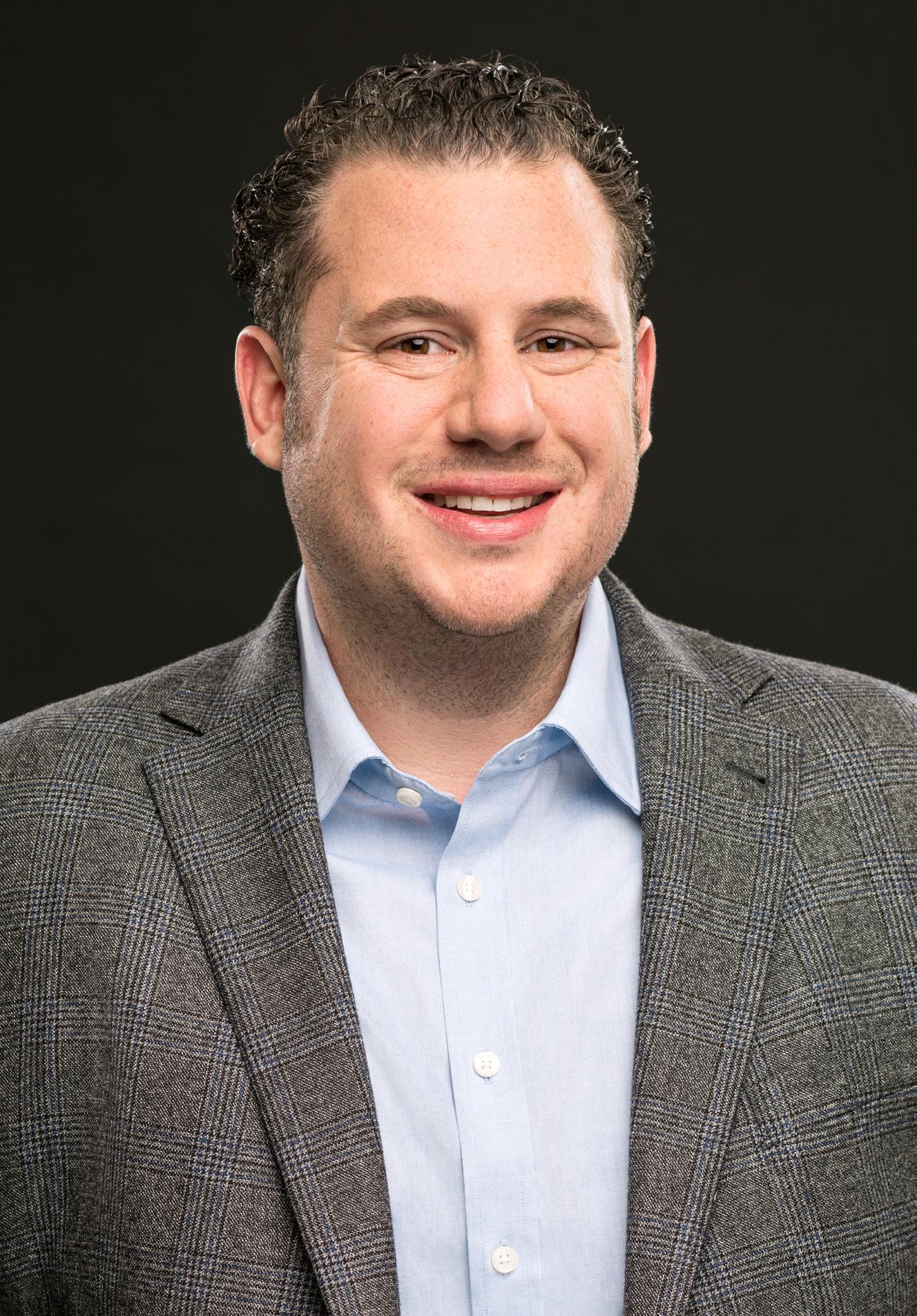 Stuart Goldenberg
Steven
Stuart Goldenberg
Steven
Weisbrot Partner and Chief Innovation Officer Angeion Group
195 Modern Counsel
“We were taking an industry that was so caught in the past and modernizing it. It was so ripe to be disrupted and to be restructured, so I had faith that the market would follow.”
would be successful,” says Weisbrot of Angeion Group’s early days in 2013. “We were taking an industry that was so caught in the past and modernizing it. It was so ripe to be disrupted and to be restructured, so I had faith that the market would follow.”
The market did follow. Not only has Angeion Group revolutionized how people are notified of class action suits but it has also completely altered how settlements are distributed. Previously, class members received a paper check in the mail. “We don’t do that as much anymore,” says Weisbrot. “We have cases that only offer PayPal or Venmo—or digital checks—because that’s how we’re collectively sending money these days.”
Weisbrot’s expertise developed years before he joined Angeion Group, when he brought clientele to his previous law firm by becoming an early adopter of search engine optimization and Google AdWords. As he began to focus his legal practice on class action notices and claims, he quickly saw where he could innovate.
Now, instead of hoping class members will find the ads—or focusing exclusively on online purchases that render an email trail and exclude many cash and in-store purchases—Angeion leverages data aggregation to find people who were once thought unfindable.
Some of Weisbrot’s innovations seem like such inevitable solutions that it’s difficult to believe they weren’t already in practice. For example, if someone
is struggling to operate a product, they might search for a how-to video on YouTube. Thanks to Angeion, a video ad alerting the user that they may be part of a class action suit will now pop up before the how-to video airs.
“But we also make sure that we’re always serving our ads in what we call a ‘brand-safe environment,’” he explains. “This way, the company does not end up having their class action ads play next to hate speech, pornography, or an ad for their own services. We verify that on both the front end and the back end by using various technologies.”
Along with serving as a testifying notice expert—a third-party liaison between the court and the companies fulfilling class action claims—Weisbrot says he will continue moving the industry forward so that it’s not just catching up but actually at the helm of digital communication. To achieve this goal, he is not simply relying on his experience and the experience the company has tracked over the years. He has also become IAB-certified to stay abreast of any and all digital media developments.
“We are always a step ahead in terms of innovating and having the class action experience mirror how people are living everyday life, whereas it used to be sort of anachronistic,” he says. “There will never be commonplace technology that we won’t try to use in our notifications and distribution.”
Evaluate 196
“We are always a step ahead in terms of innovating and having the class action experience mirror how people are living everyday life, whereas it used to be sort of anachronistic.”
Predicting the Future
Paul Maltseff of data capture company Datalogic cuts down on bureaucracy and turns competitors into collaborators
By Clint Worthington
WORKING IN IP, EXPLAINS DATALOGIC Chief IP Counsel Paul Maltseff, is like trying to predict the future. For Datalogic, a midrange company based out of Italy that works in the automatic data capture and process automation markets, performing well in an industry with much larger competitors comes from identifying the needs of the marketplace and capitalizing on them before anyone else does. Maltseff emphasizes that it is key to look for IP innovations and secure the rights to them quickly.
“IP innovation is of great interest to us, even if it’s just incremental innovation,” Maltseff explains of Datalogic’s view of the future.
This kind of flexibility and nimbleness aids Datalogic as a midsized company, Maltseff says, as “big companies are very slow on the development side.” Bureaucracy can slow them down, giving more fleet-footed firms like Datalogic the agility they need to get ahead.
As chief IP counsel, Maltseff is responsible for everything related to intellectual property, from product
Modern Counsel 197
clearance to patents and licensing. To accomplish this kind of in-depth global work, Maltseff works with a seven-member team spread out across the United States and European Union as well as China and Vietnam. Having representatives in every major market, he explains, makes it easier to file patents and build IP consortiums across the world.
Maltseff has decades of business and IP experience, going all the way back to his work for the Soviet Union’s Academy of Sciences. He’s a huge proponent of systems theory, which argues that “anything we have in our world, including human beings, is part of a system with complex interactions that lead to behaviors,” he says. His work in IP law started in 2000, when he was working at Intermec Technologies Corporation. He came to Datalogic in 2014 as chief IP counsel when Intermec was acquired by Honeywell.
Why the change? “I don’t like bureaucracy and love new challenges,” he says.
Central to his work—and Datalogic’s ability to maintain an edge in the data capture and process automation field—is anticipating what competitors are getting ready to research and develop. With his team, Maltseff pores through technology news and publications as well as publicly available patents to identify technology trends and what new products larger companies are creating. Most big companies lay down patents years before they develop or put out products, giving Datalogic a preview of where they need to focus their own energies.
“You don’t need to waste money on every concept,” he notes. “We look at our competitors, identify what they’ve patented, and see what they try to achieve. If you do that and can attend conferences and look at exhibitions, you will know what you need to do.”
When Maltseff and the team at Datalogic see a company developing a groundbreaking new product, they need to find a way to differentiate their own product in order to not infringe on patents and copyright. What’s more, they can simply license or cross-license that same technology for their own products. “And there are just plain sales of patents,” Maltseff adds.
Apart from that drive to beat competitors to the punch, though, there are ways in which competitors can become potential collaborators. This is especially
Paul Maltseff Chief IP Counse l Datalogic
true when it comes to litigation: part of Maltseff’s job is to negotiate agreements between Datalogic and its competitors to provide joint defense against lawsuits from nonpracticing entities.
“Patent litigation is quite expensive,” Maltseff says, making it more beneficial to them to work out deals rather than risk everyone entering costly legal battles over patents.

To other IP counsel hoping to bolster their company’s performance, Maltseff advises: seek excellence. “Truth will adhere, so never make a drastic decision. ‘My way or the highway’ will never give you a positive result.” At Datalogic, he practices this every day by taking a detailed, patient look at the future and determining what part the company will play in it.
Juhasz, President
The Juhasz Law Firm, PC:
“Our team at Juhasz Law salutes Paul Maltseff for exemplary leadership, an exceptional team, and demonstrated results. This honor is well deserved. We are proud to serve you and your global team at Datalogic.”
Evaluate 198
–Paul
Courtesy of Datalogic
Stephen Ifeduba is cut out for the varied needs of Washington Prime Group, a major owner and operator of shopping centers
By Russ Klettke
Be Adaptable, Come
What May Modern Counsel 199
IT’S NO SECRET THAT DIGITAL SHOPPING HAS TAKEN a bite out of traditional brick-and-mortar retail, creating existential worries for mall tenants and many of their landlords, the mall operators. Industry trends, such as the growing popularity of online retail, have a disproportionately large effect on companies with a broad footprint.
But Washington Prime Group Vice President of Corporate and Litigation Counsel Stephen Ifeduba offers a different perspective on the business environment for the real estate investment trust based in Columbus, Ohio. The owner and manager of retail properties has a nationwide portfolio of 101 shopping centers, consisting mostly of enclosed malls, with approximately 54 million square feet of managed gross leasable space.
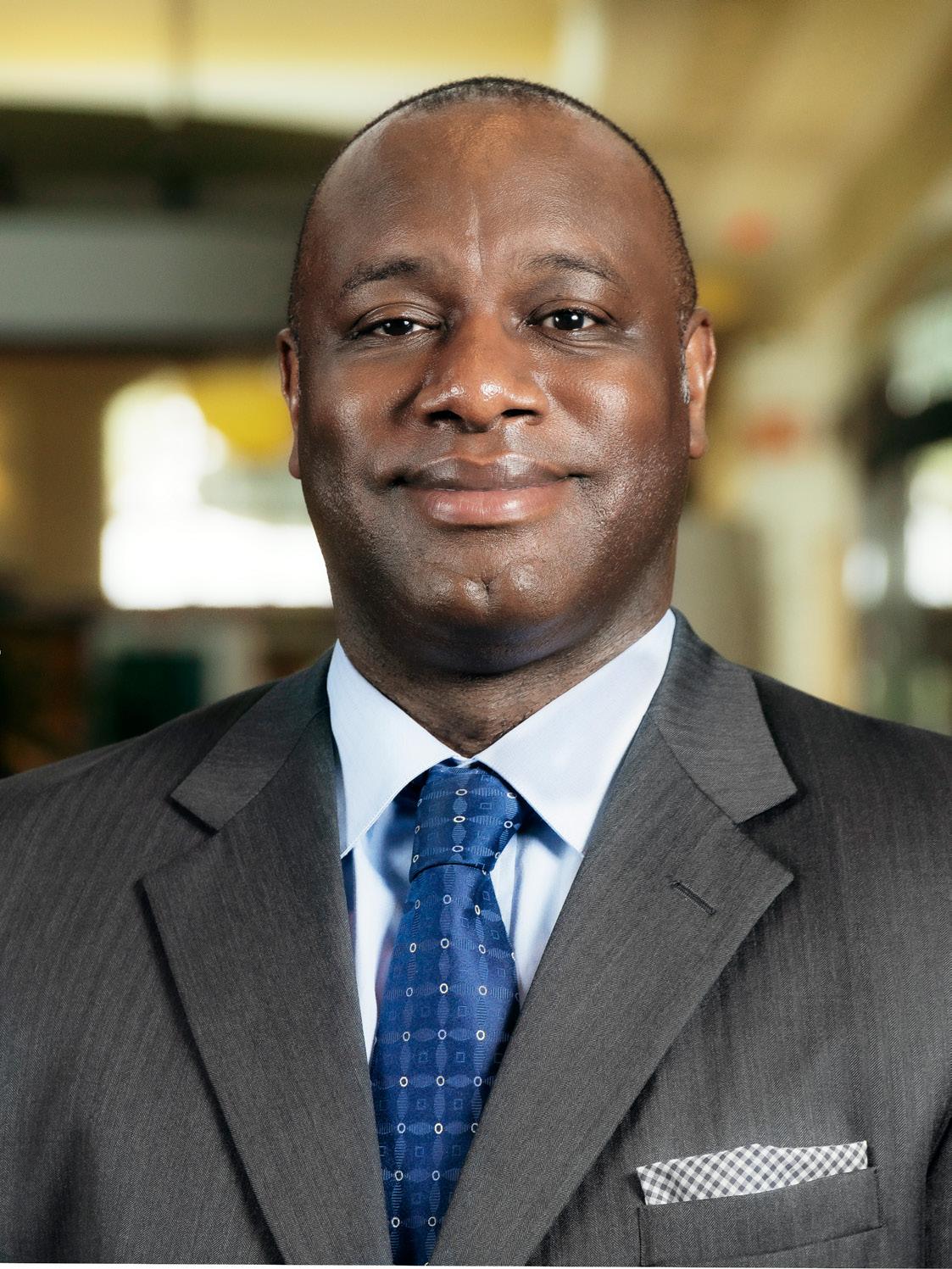
Contrary to public perception, brick-and-mortar retail spaces are still where people make about 85
percent of purchases. Consumers inherently appreciate a shopping experience that allows them to see, hold, and compare merchandise. The youngest adult shoppers, Generation Z, are leading a trend back to shopping with their feet on floors instead of fingertips on a keyboard. In response, mall operators are developing properties and events that make stores a destination.
As with just about every profession, Ifeduba says his corner of business law has been transformed by technology. Virtual meetings via computer screens have become a new tool that practitioners are continuing to leverage to add efficiency to their practice. As he manages high volumes of work with many properties—and his outside counsel in dozens of markets—he finds the many devices and platforms for communications invaluable.
“Our legal research capabilities, document production, and exchange and communication options have been greatly advanced because so much information is either cloud based or uses a database,” he says. “Due diligence for capital markets or property dispositions and acquisitions in the past would require travel and several days, but now, with Adobe, Excel, Word, and email, it’s possible to complete aspects of diligence in a shorter amount of time.”
Ifeduba’s more than two decades of work in business law—largely practicing in transactional, regulatory, and securities work—qualify him to handle the shifting demands of his role. Luckily, in his first law firm, he worked on both transactional corporate matters and litigation, providing him with a dual track of experience that is uncommon for young attorneys. “It’s good to have worked in both,” says Ifeduba. “Particularly in the tougher times, the emphasis can shift to lawsuits.”
Across so many properties with so many retail tenants, there will always be an ebb and flow of bankruptcies for any mall operator. For instance, when many retailers entered bankruptcy or closed stores in early 2020 during the COVID-19 pandemic, it generated considerable legal activity. Ifeduba and his outside counsel, most of whom are located in the markets where the company’s properties are, oversaw this legal work related to litigation or bankruptcy matters.
In states like Ohio, where Washington Prime Group is based, Ifeduba grappled with additional com-
Gust Smith/Fahlgren Mortine
Evaluate 200
Stephen Ifeduba VP, Corporate & Litigation Counsel Washington Prime Group
plexities because moratoriums were placed on tenant evictions during the crisis period. Furthermore, landlords sought to defer mortgage payment terms to ease cash flow concerns.

For all the changes he deals with in the dynamic landscape of retail, some constants remain for Ifeduba. He has long enjoyed the intellectual property work related to mall marketing. He oversees trademarks and patent work for logos and insignia related to the names of Washington Prime Group properties and programs (standouts include “Polaris Fashion Place,” “Scottsdale Quarter,” and “Shelby’s Sugar Shop”). A successful holiday marketing concept created at one property—called “Sensitive Santa” because the designated St. Nick was specially trained for children with developmental challenges—required trademark protection because the program proved so popular it was copied by other parties.
Ifeduba notes that what he sees retailers doing is similar to what he’s done throughout his career, which is to be adaptable, come what may. “This business is a lot harder than it was twenty-five years ago, but I get a lot of professional satisfaction from being a generalist,” he says, “not siloed into just leases or development.”
201
“This business is a lot harder than it was twenty-five years ago, but I get a lot of professional satisfaction from being a generalist.”
Empathy Opens Doors
Tiffany Archer champions ethics and compliance as part of the empathetic culture of Panasonic Avionics
By Keith Loria
TIFFANY ARCHER LEADS ETHICS AND compliance in North America, Latin America, and Europe for Panasonic Avionics, overseeing the company’s global activities related to antibribery and corruption, regulatory risk, crossborder internal investigations, and reputational risk management.
Archer’s interest in Panasonic stemmed from wanting to work somewhere where she could make a difference.
“When the position was offered to me nearly four years ago, the compliance department was quite small,” the attorney explains. “The role reported directly to the CCO [chief compliance officer] and afforded me the opportunity to have direct, hands-on experience and help build the compliance function from the ground up.”
Panasonic Avionics was also in the midst of managing its responses
to a Foreign Corrupt Practices Act (FCPA) inquiry by both the Department of Justice and the US Securities and Exchange Commission. Archer thought it would be professionally rewarding to immediately dive into challenging work at the company.
Since she first came on board, Panasonic’s compliance function has evolved tremendously, with a new chief ethics and compliance officer, Catherine Razzano, and additional resources to grow the team. “I am very proud of all that our team has accomplished as we continue to build a best-in-class compliance program and implement rigorous internal controls,” Archer says.
Before earning her JD at the George Washington University Law School, Archer majored in psychology and belonged to the Psi Chi psychology honor society at the University of
Evaluate 202

Benjamin Chateauvert
Modern Counsel 203
Tiffany Archer Regional Ethics & Compliance Officer and Corporate Counsel for the Americas & Europe Panasonic Avionics
Pennsylvania. Studying psychological principles and theories afforded her a deep understanding of different personalities, human behaviors, and drivers of certain conduct. This understanding continues to inform her work today as she navigates Panasonic’s global landscape.
“Emotional intelligence is an invaluable soft skill,” Archer says. “It opens doors to building trust with business stakeholders, developing strong relationships, creating open lines of communication, and eliciting candor and honesty.”
Archer’s ultimate goal in any interaction is to achieve a productive outcome. In the context of ethics and compliance, the organization must calibrate an employee’s moral compass and guide them so their conduct feels authentic. All the while, their conduct must also be consistent with the organization’s principles.
“Empathy is a key pillar that I rely upon to be successful in my field,” Archer notes. “There is something to be said about putting yourself in someone else’s shoes, connecting with them on a deeper level, and effectively communicating and resolving conflicting viewpoints without tension or resistance.”
In her role, Archer oversees two regions that uphold vastly different cultural norms—Europe and the Americas (North and South). She refers regularly to tips and strategies laid out in The Culture Map by Erin
Meyer, which describes the cultural nuances and invisible boundaries to consider when dealing with stakeholders in different countries. Using Meyer’s methodology, Archer resolves critical business matters and tactfully moderates cultural differences.
“It is no secret that one of the biggest challenges in a global organization is to manage diversity, personality differences, and inherent cultural beliefs, including cognitive bias,” Archer says. “This is where I find the application of empathy to be critical, as it allows you to bring people together and provide a platform in which the team can have open dialogues, work collaboratively, and come to agreements on business decisions and appropriate behaviors to drive change.”
Another major challenge that Archer faces in her day-to-day is changing the narrative around compliance.
“Many view compliance as the ‘Department of No,’ in large part because it can be perceived as a roadblock to doing business,” Archer says. “The department’s key objective is not to rigidly enforce rules but instead to empower employees with tools and resources to make ethical and informed decisions as they carry out their roles for the organization.”
Archer strives to strengthen the overall organizational culture from an ethical standpoint. A strong ethical culture enables the organization to
Evaluate 204
“[Emotional intelligence] opens doors to building trust with business stakeholders, developing strong relationships, creating open lines of communication, and eliciting candor and honesty.”
maintain a proactive—as opposed to reactive—stance toward compliance.

“To embed a culture of compliance, not only do you need the appropriate tone at the top but it’s also essential that a compliance department makes it a priority to forge strong partnerships with key functions such as finance, internal audit, IT, procurement, and HR,” shares Archer, who was honored with a 2020 Excellence in Compliance: Anti-Corruption award nomination by Compliance Week “Each of these functions plays a pivotal role in the success of a robust compliance program, as they help in the organization’s effort to mitigate risk.”
With this outlook, it’s no surprise that Archer has established herself as a thought leader who will only further enhance ethics and compliance at Panasonic Avionics.

205
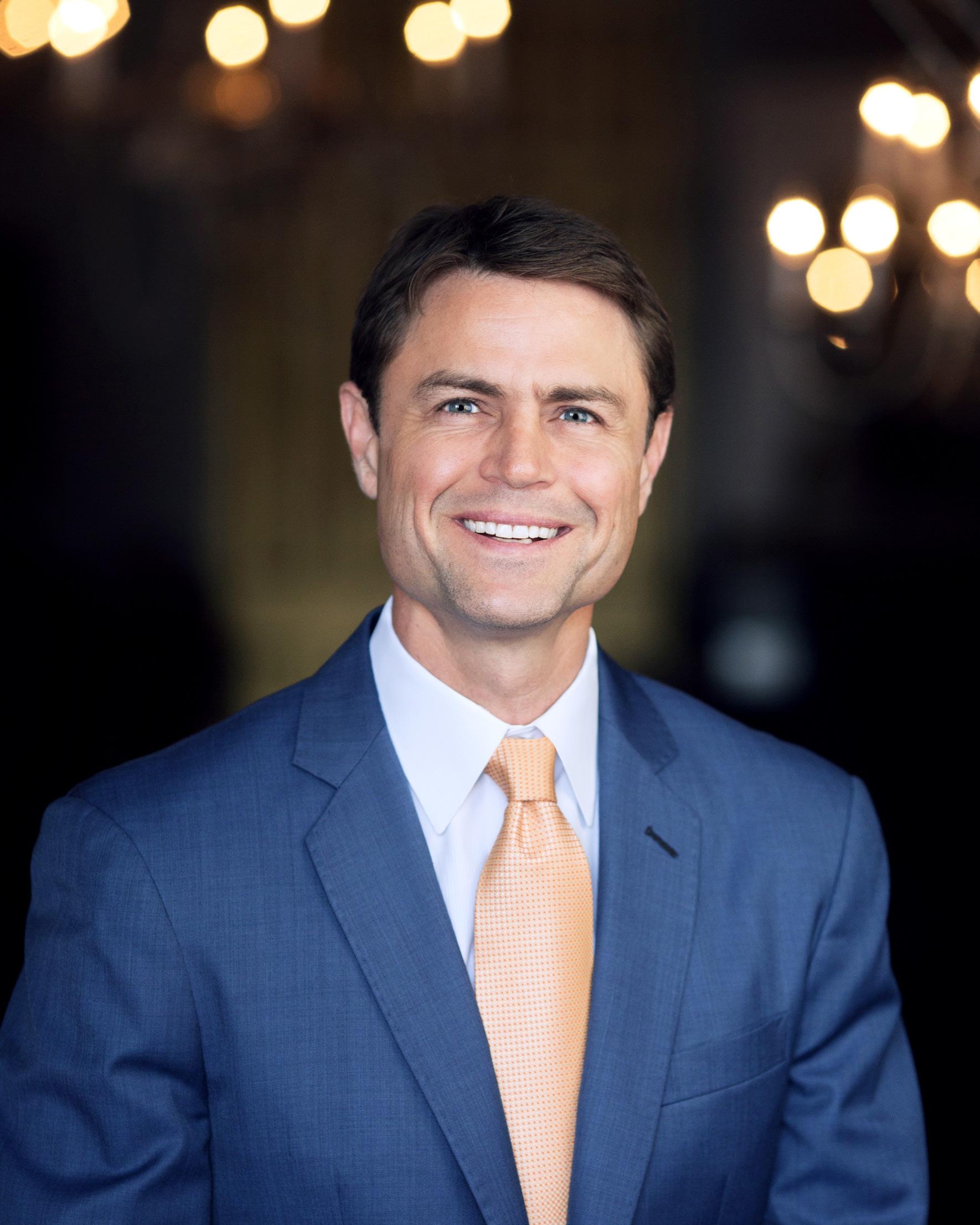
Callynth
Finney
James Wortman
Evaluate 206
SVP and Deputy General Counsel Caliber Home Loans
A Decade Together
James Wortman takes great pride in his work at mortgage company Caliber Home Loans, where he has been essential to the company’s growth
By Keith Loria
WHEN JAMES “JESS” WORTMAN BEGAN HIS CAREER at Caliber Home Loans, the company was just over a year old. Wortman saw his move to the young company as an exciting new opportunity with a lot of room to grow. “When I began the role, I got everything out of it that I could,” recalls Wortman, who is now Caliber’s senior vice president and deputy general counsel.
That was in September 2010, and Wortman and Caliber have grown together as he approaches his tenth anniversary at the company. In the beginning, Caliber had about thirty thousand borrowers and five hundred employees. Wortman was tasked with supporting customers and the growing business. A year later, he was promoted to overseeing the entire servicing portfolio—a role he has held since, as Caliber has evolved into a full-service mortgage provider with more than five thousand employees and more than five hundred thousand loans.
Modern Counsel 207
“Large corporate environments rely so much on lawyers having an understanding of the business,” Wortman explains. “Having a good amount of tenure at a company gets you to a point where you can understand the business and provide relevant legal guidance.”
Today, his work focuses primarily on overseeing the servicing portfolio of Caliber on the legal end, including identifying opportunities to enhance the customer experience.
“One of the things we really pride ourselves on is the idea of ‘a customer for life,’” he says. “We originate the loan, we service the loan, we have a relationship. Throughout the life cycle of the loan, we cater to the needs of the customer and identify opportunities to support their mortgage loan.”
Another important aspect of his work is providing guidance on emerging legal trends in areas including data privacy and mortgage servicing compliance. He identifies new laws and regulations and provides guidance on their potential impact through involvement with such organizations as the Mortgage Bankers Association.
“We have to make sure we have very good relationships with representatives and experts in all areas,” Wortman notes. “We have a concise way of consolidating and leveraging those relationships to identify trends in areas that may need further attention. We also create a balance so that we can filter through a lot of this information and provide guidance to the business on areas that we see as significant and having a potential impact on Caliber.”
In addition, he has made important contributions to Caliber’s strategic initiatives, including the development of several technology platforms that assist borrowers and clients. He also looks into new technologies and how a mortgage company can leverage those technologies while identifying potential risks they pose in such areas as security.
“It involves working very closely with other members within the leadership team to identify those opportunities and explore them to see if they work with the construct of where Caliber is right now—and also if they can support where Caliber wants to be,” Wortman shares. “We’re doing a review of what the needs of the consumer are in the current technology space and also reviewing new technology, such as
blockchain and other technology providers who may be able to provide solutions.”
Wortman began his legal career at Locke Lord, where he represented banks, mortgage companies, and other financial institutions in defensive litigation matters. Five years later, he took a job with a different firm, where he represented other financial institutions and their affiliated entities in litigated matters throughout Texas.
He also worked as a Dallas County interim prosecutor, and though he served in that post for just three months, it proved an invaluable experience.
Wortman has much to be proud of as he marks a decade with Caliber. He has overseen both loan servicing and loan originations and served twice as interim general counsel, most recently in 2016. What he takes special pride in, however, is helping the company grow over the last decade.
“That’s what I love the most about what I’ve done. I was a good litigator; I represented companies very well,” he says. “Frankly, I was very good in the courtroom working for the Dallas County District Attorney. But I really think that I can show my best value in working with this business as it’s grown and developed.”
Evaluate 208
“I really think that I can show my best value in working with this business as it’s grown and developed.”
None of this growth would have been possible without building partnerships with the business to achieve common goals. “Partnerships and relationships are perhaps the most important element of a successful in-house counsel,” he says.
He adds that working for Caliber in his earliest days was a lot like working for a start-up, and he helped build the company from the ground up.
“Every one of the leaders of Caliber looks back and says, ‘Wow, I’ve really had a helping hand in building what we’ve built,’” he explains. “To look back and see the progress we’ve made, as well as knowing I built it with people I respect and trust—that’s what makes coming to work worth it every single day.”
“Locke
–Rob Mowrey, Partner
Congratulations to our friend and client
Home Loans on this well-deserved recognition of your exceptional career Atlanta | Austin | Boston | Brussels Chicago | Cincinnati | Dallas | Hartford Hong Kong | Houston | London Los Angeles | Miami | New Orleans New York | Princeton | Providence San Francisco | Stamford | Washington DC West Palm Beach © 2020 Locke Lord LLP Practical Wisdom, Trusted Advice. www.lockelord.com
Jess Wortman Senior Vice President / Deputy General Counsel Caliber
Locke Lord LLP:
Lord congratulates Jess Wortman on this well-deserved recognition. Having long worked with Jess and our friends at Caliber, we celebrate how Jess collaborates with outside counsel, his industry knowledge, and his commitment to excellence.”
209
“To look back and see the progress we’ve made, as well as knowing I built it with people I respect and trust—that’s what makes coming to work worth it every single day.”
A Better Way of Doing Business
Harry Sokhi has helped some of the United States’ biggest insurance companies run a more effective business by embracing diversity, data, and values-based hiring
By Paul Snyder
Evaluate 210
WHEN HARRY SOKHI IMMIGRATED TO the United States from India, he was five years old and didn’t know a word of English. Growing up in inner-city Philadelphia, Sokhi felt a responsibility—that lingers to this day—to make his parents’ decision to leave their home and create a better life for their son “worth it.”
It didn’t take long for his new surroundings to inspire what he wanted to do with his life.
“I remember seeing how people were taken advantage of if they didn’t know their rights,” he recalls. “That’s what drove me to law school. I wanted to make a difference.”
Sokhi recalls doing whatever jobs he could to graduate from Temple University Law School. He also notes that as much as his personal values attracted him to law, youthful ego likely steered him toward the insurance industry.
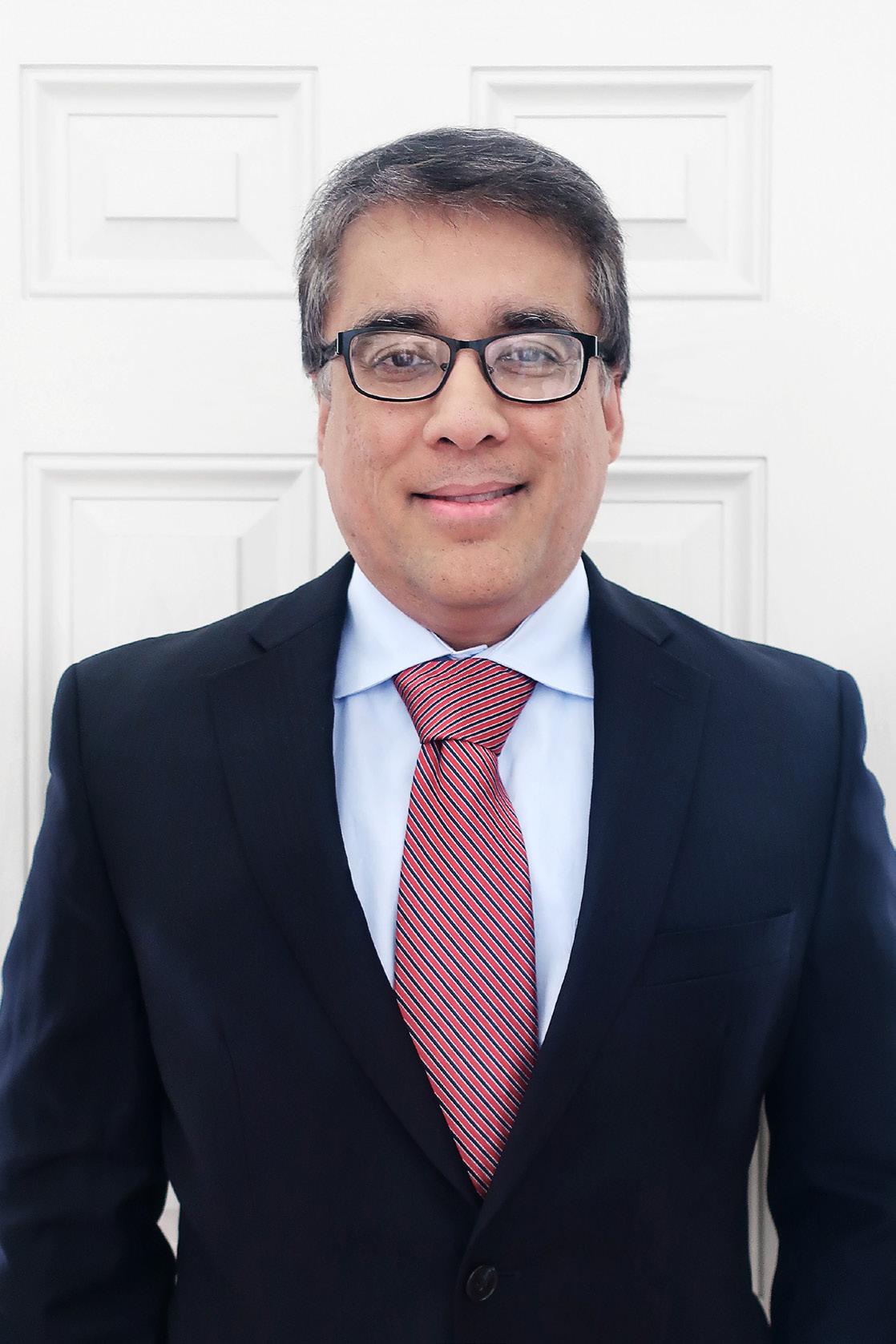
“Some of us who come into this profession have a need to be a showman,” he says, laughing. “I had a big personality, big goals, and I thought I’d like to be in a courtroom. Insurance companies love to litigate cases. You write opinions and memos, but more often than not, you’re in a courtroom every day. It was a natural fit for me.”
Sokhi began practicing with a small firm that did work for State Farm, but he soon felt a desire to learn the other side of the business and better understand his clients. That desire ultimately led him to roles with AIG, Nationwide Insurance, State Auto Insurance, and now with EMC Insurance Companies. With every step, Sokhi has sought mentors, taking advantage of mentorship programs and connecting with senior leaders.
“Once I moved into a leadership role, I had someone with whom I could
Jeevan Sokhi
Harry Sokhi Counsel
Modern Counsel 211
EMC Insurance Companies
Data Speaks
As Told to Paul Snyder
My job in managing data is not for the insurance company. It’s really for the law firm. The big question in the legal function is utilizing that data. This is where we as a legal profession need to go to the next level.
It doesn’t matter if it’s a large or small firm. I’ve seen deficiencies in both where they should be measuring the effectiveness of each partner and associate. We have to establish those aggregators or blue chips that show that that is the right lawyer for us, the right partner for us.
If we tell an attorney to take a case to trial, we measure the effectiveness of that actual result. Do they win for us? There are also going to be jury awards to consider. Is the jury award larger or smaller than our last offer? We track each one of these firms to see where they stand. We look at verdict results. We look at lawsuits and measure “cycle time,” which starts when the lawyer gets the case and ends when he or she shuts it down.
We don’t just hire lawyers to go through the motions. We hire them for their counsel and advice as well. We see how long the file is open and try to be fair in our comparison. We need apples-to-apples comparisons that show efficiency. Then, we try to compare law firms within that state, so when I’m comparing lawyers and trying to track their data and their effectiveness, I’m measuring a Florida lawyer against another Florida lawyer. It’s not fair to, say, measure a Florida lawyer against an Ohio lawyer because the litigation landscape is completely different.
We also ask each of our file handlers who managed the litigation with the law firm to complete a survey on the law firm when it’s concluded. How good was counsel’s advice? Was it timely? Was it right? Was it effective? Did it help you resolve the case? You don’t just measure a law firm based on numbers; you look at it from a qualitative perspective as well.
Now we’re at a point where we can slice it and, say, look at a head injury verdict. We can look at the verdict value of that head injury in terms of one attorney versus another in a true apples-to-apples comparison. Not only can we determine who the better performer is but law firms can then use that data to figure out bonuses and identify who deserves to be rewarded and who needs to be coached.
discuss soft skills,” he says, “someone I could talk to about what would make me a better person, a better manager, professionally, and how I could be of benefit or value to the organization. As my career progressed, I had to look for somebody outside of my discipline to help me stretch my abilities and continue to do those things that help me grow.”
Over time, Sokhi has stockpiled experience in using data to determine which law firms are best suited to helping insurance companies land effective results in their cases. It’s an investment that can take months to establish, but with a solid data template, Sokhi is providing immeasurable value to the company.
He’s also continually pushing for more diversity in his department, clients, and outside counsel. Sokhi knows that success cannot be sustained without new ideas.
“Diversity is not just color or race. It’s also a way of thinking across different generations,” he explains. “With insurance, we have different classes of people from all walks of life, and our lawyers should reflect that. Our lawyers should be able to relate to whatever happened in an accident to get an idea of why something happened. It goes toward communication and bridging gaps to create an understanding.
“It also brings out the best in everybody,” he adds. “I could hire everybody that agrees with me or everybody that looks like me and we all could just move in lockstep, but the law firms we hire should be there to challenge me. There’s back-and-forth. You have to be comfortable with that.”
When looking at new hires and new firms with which to work, Sokhi says he doesn’t put a value on skills that he says can easily be taught or refined, like drafting motions. Instead, he prizes values and work ethic.
“You can’t teach values,” he says. “You either have them or you don’t. Why do you
Evaluate 212
come to work each day? What drove you at this particular position? Why did you go to law school? If they say, ‘Well, I wake up at 5 a.m., go to sleep around 11 p.m., and I worked my way through school because I had a tough upbringing,’ then to me, that’s valuable. If they then tell me they can’t do an effective closing, it’s OK. I can teach that stuff. But no company can teach people the building blocks of being a good person.”







This mindset extends beyond the courtroom. Sokhi says he finds the most joy in mentoring others, furthering their career aspirations, and ensuring that colleagues— or even neighbors’ kids who want to become lawyers and are seeking letters of recommendation—have the tools to achieve more than he has.
“I expect the best out of people and that they’ll be there to help,” he says. “There’s a lot of good in the world, and you have to draw on that when you’re in tough times. There were a lot of people along the way who helped me, and we have to be there to provide the same service to the generations that come after us.”

smsm.com AUSTIN | CHICAGO | DETROIT FT. LAUDERDALE | HOUSTON JERSEY CITY | NEW YORK PHILADELPHIA | ST. LOUIS
Segal McCambridge joins Modern Counsel in recognizing Harry Sokhi for his dedicated leadership and guidance.
213
“I expect the best out of people and that they’ll be there to help. There’s a lot of good in the world, and you have to draw on that when you’re in tough times.”
The Intricate World of Dietary Supplements
Reckitt Benckiser’s Mark Levine talks about the legal and regulatory challenges as well as the opportunities of dietary supplements and why science is key to his success
By Stephanie Zeilenga
Evaluate 214
With fewer rules and regulations than medicines, dietary supplements pose distinctive challenges. Mark Levine brings years of experience in the industry to Reckitt Benckiser’s health division, RB Health, where he’s ensuring the team operates within a gray zone ethically and successfully.
“Dietary supplements are regulated with foods within the FDA,” he says. “They operate somewhat on the honor system; you can put your product out there without preapprovals or registrations. This leaves room to be creative and also room to get into trouble—unlike with over-thecounter drugs, where you have strict rules and a list of monograph claims you can make for each active ingredient.”
Modern Counsel 215
It’s common for companies to take advantage, whether that means putting unapproved ingredients in supplements (think weight-loss products that contain methamphetamine) or making outrageous claims (“Lose ten pounds in a week!”). Some recent examples of these bad players include companies producing supplements with CBD, which hasn’t yet been approved by the FDA, or making exaggerated claims related to COVID-19.
It’s Levine’s job to make sure Reckitt Benckiser’s supplements follow all the rules regarding ingredients and make only truthful and accurate claims. These products include Move Free for joint health; MegaRed, an omega-3 supplement; Airborne for immune support; Neuriva for brain health; and Digestive Advantage, a probiotic supplement.
In short, Levine keeps the company’s offerings in line with the Dietary Supplement Health and Education (DHSEA) Act, passed in 1994, which provides manufacturing and labeling guidelines for supplements. He also ensures the company’s products won’t create any issues with the FTC or cause a competitor suit.
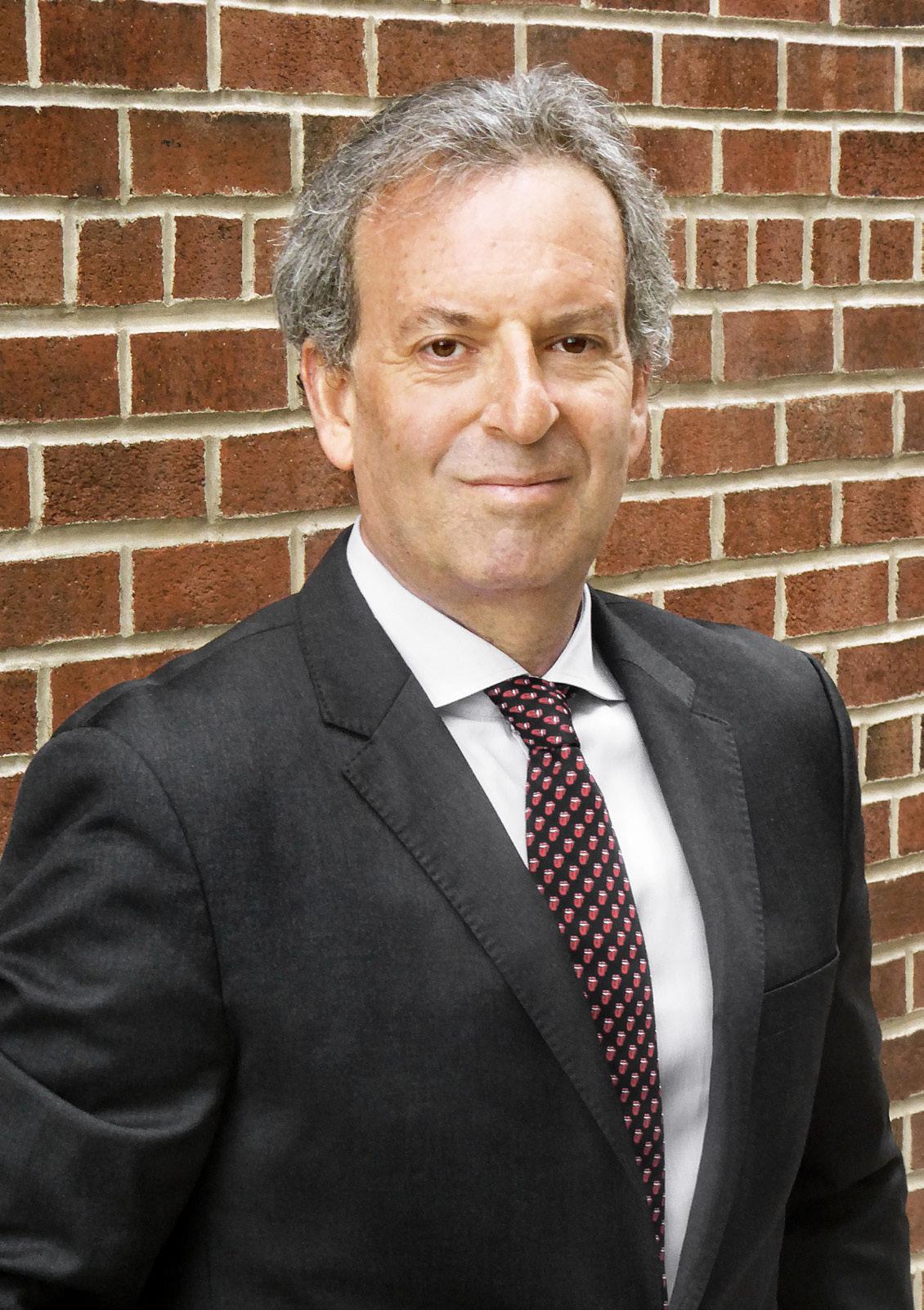
“There’s a lot to think about, and it’s especially challenging telling people they can’t say things that competitors are saying for the exact same types of products,” he says.
This gray area is particularly attractive to plaintiff attorneys, and even if a supplement is completely compliant with DHSEA and other guidelines, it can still get hit with a consumer class action lawsuit disputing the product’s claims or ingredients. Dealing with these lawsuits is a fixture of Levine’s work. Many of these suits target any claims that a product is natural.
“In recent years, there has been an increase in class actions for foods claiming to be natural, and that has bled into similar claims for supplements,” Levine says. “The problem is that no regulatory body has come forth with a definition for what is natural, which leaves it up to interpretation.”
Levine’s strategy for minimizing class action suits and other risks is to have a strong, cross-functional team and to thoroughly train every new employee and outside agency on the dos and don’ts of supplement marketing. “You want to make sure everybody in the chain, from manufacturing and R&D to medical,
Mark Levine
Associate General Counsel
Reckitt Benckiser
Evaluate 216
Adam Bernstein
regulatory, and legal, reviews all claims and labels before they get approved,” he says. “Legal is the last to review to make sure the class action risk is addressed.”
Levine, who has been in the supplements business in some capacity since 2007, is uniquely suited to this work. He first joined Reckitt Benckiser eight years ago, lending his legal expertise in marketing and advertising to all of the organization’s many brands, including Lysol, Mucinex, Durex, and Enfamil. When Reckitt Benckiser’s supplements division became its own end-to-end business unit in 2017, he became the unit’s general counsel.
In addition to his legal expertise, Levine has a strong science background that is essential to his role. He completed an undergraduate degree in biology before going on to earn his law degree with a specialty in patent work, and much of his legal career has involved some element of science. For instance, he spent some time at the National Advertising Division, reviewing ad claims for truth and accuracy. While there, he spearheaded an initiative with the Council for Responsible Nutrition to vastly increase the review of advertising for dietary supplements.
“In the supplements world, the key to success is understanding the science and making sure advertising and marketing materials accurately reflect this
science,” he says. “My science background enables me to actively participate in scientific discussions with our medical group and discuss study designs and results.”
He continues, “At RB, there is a focus on building innovative and superior products backed by clinical support, so there is always extensive science to review and evaluate. Even the litigations are heavily scientific, because you have to be able to argue that your product works and explain why, while the plaintiff is hiring an expert to argue the opposite.”
Overall, Levine relishes the challenges posed by supplements, an industry he says is growing increasingly mainstream as people become more invested in their health. “It’s an interesting industry because you can be creative and work with marketers to operate within that gray zone and come up with claims that are powerful but won’t get you in trouble,” he says.
Manatt, Phelps & Phillips, LLP:
“Over the years, we’ve had the honor of working alongside Mark, and we have witnessed firsthand his unparalleled contributions to the industry and community. Through his deft stewardship, Reckitt Benckiser has helped countless people care for themselves and their loved ones. Thanks, Mark, for all you have done and continue to do!”
–Robert Platt, Partner
Modern Counsel 217
“In the supplements world, the key to success is understanding the science and making sure advertising and marketing materials accurately reflect this science.”
Main Quest
Jordan Gimbel and the Twitch legal team help the livestreaming giant emerge victorious in an epic battle for market share in an industry with billions of users and millions in advertising
By Zach Baliva
Evaluate 218
WHEN JUSTIN KAN CLIPPED A MOBILE CAMERA TO HIS baseball hat in 2007, he had no idea how big his social experiment would become. Kan built a small following of people who watched his life broadcast around the clock on Justin. tv. When the fledgling company allowed other users to post original content, the platform morphed into a network.
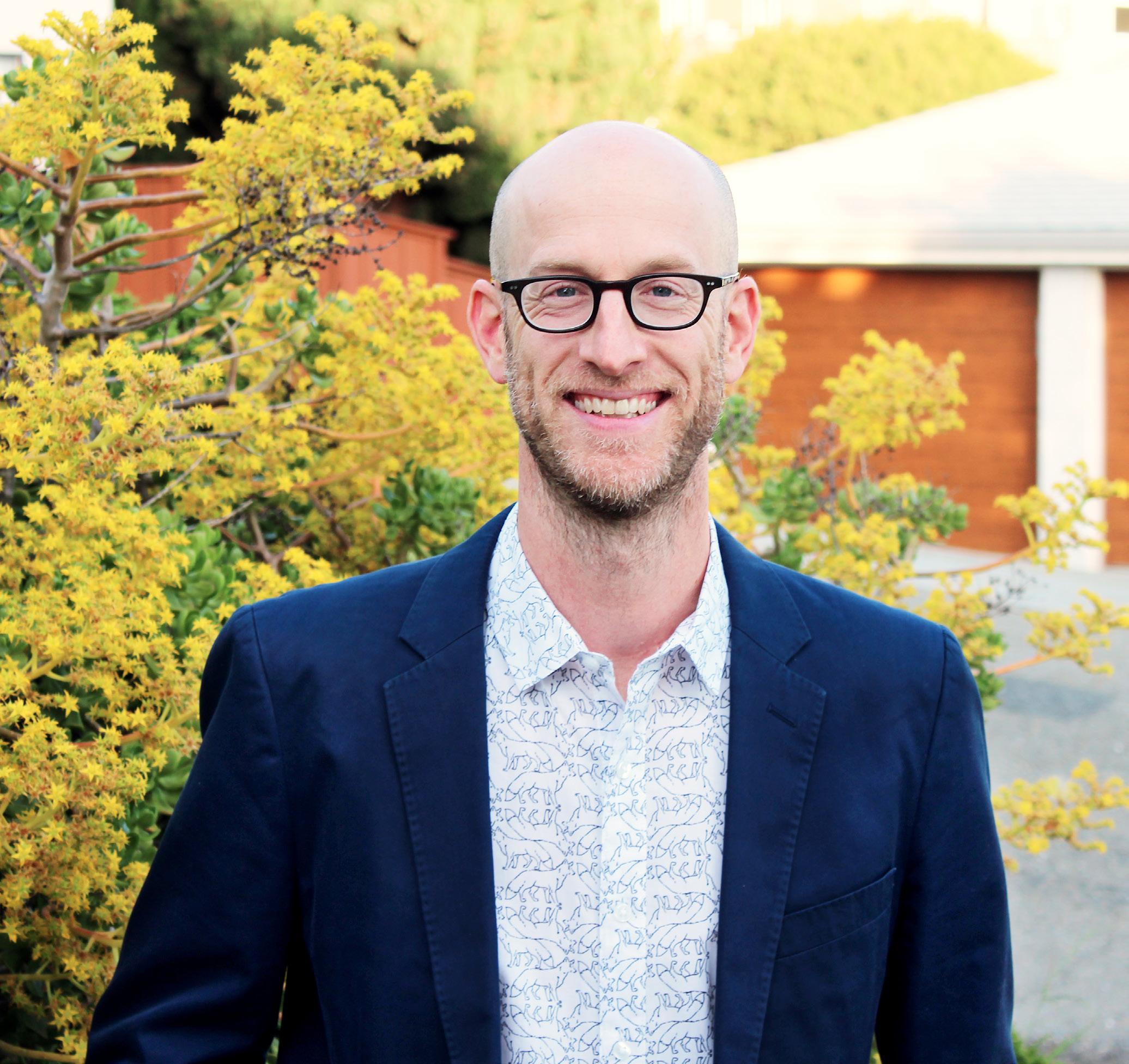
The site grew quickly, and its most popular category— video gaming—spun off as TwitchTV. Three years after its launch, Amazon acquired Twitch for $970 million.
Since the 2014 acquisition, Twitch has continued to grow at a breakneck pace. Each day, millions of users log on to
watch livestreaming and on-demand video broadcasts from gamers, musicians, and other creators. At any moment, 1.5 million people are watching, and the site attracts more than 17.5 million daily visitors. Industry experts expect the global platform to surpass 40 million US users in 2021.
As Twitch continues to blaze a trail forward, competitors like YouTube, Facebook, and Microsoft are courting users. In the billion-dollar, high-octane world of online streaming, there’s a lot on the line. Users are savvy, competition is fierce, and the rules aren’t yet set in stone. An effective legal team is key to success, and at Twitch, Jordan Gimbel is leading the way.
Joanna Rudnik
Modern Counsel 219
Jordan Gimbel Deputy General Counsel Twitch
Gimbel—a Fulbright scholar who studied at Stockholm University and Pepperdine Law—joined the company in 2016 to help business teams launch new products and services. As deputy general counsel, he now manages a team responsible for servicing the product, engineering, and ad sales teams.
“We’re at an exciting time in a unique industry where people are bringing themselves to our service to create and interact. The space is still developing, and the right legal strategies help our teams breathe life into what they do from ideation to release,” he explains.
It’s uncharted territory. Twitch streamers purchase and use a video game company’s product on a third-party site to create content that is broadcast to millions of viewers, accompanied by advertising messages. What liability issues does this raise? Who owns what? How do users stay safe? These are the questions Gimbel and his team must consider.
One simple mental trick helps Gimbel perform well in the unusual environment. “I’ve trained myself to be comfortable with chaos. You can’t know everything, and there’s always an opportunity to learn,” he says.
Some issues aren’t as complicated as they seem. Video game companies have existing relationships with their customers and see the value in streaming. Gamers come to Twitch to interact around shared interests. Twitch provides the community and an audience. The triangular relationship between developer, platform, and gamer is mutually beneficial.
For gamers, the relationship can be especially lucrative. Qualifying streamers who become Twitch affiliates or partners unlock access to shared paid subscription revenues and other perks. Viewers can support broadcasters through a variety of patronage tools, and broadcasters can attract sponsorships, compete for tournament prize money, or sell merchandise. Twitch’s top users have millions of followers and hundreds of millions in total views. Some users earn more than $500,000 per month.
Gimbel and his legal colleagues are intimately involved in creating and maintaining the guidelines for Twitch’s affiliate and partner programs, which accompany the site’s foundational terms of service. Because Twitch has positioned itself under
international safe harbor laws like the Digital Millennium Copyright Act, streamers are responsible for copyright infringement.
As its competitors seek to poach top users, Twitch tries to ensure a safe, fun community where streamers can play, collaborate, and earn a livelihood. “It’s a balance,” says Gimbel. “We want to help creators earn a living, connect with their community, and, through that, position Twitch to grow.”
To do so, his team must monitor ever-changing laws worldwide. They do that by scouring news headlines, subscribing to trade publications, receiving specific email blasts, and attending industry seminars from organizations like the Media Law Resource Center. Gimbel has asked team members to become his “in-house experts” on assigned topics such as legal lotteries or consumer protection laws. Outside firms around the world keep Twitch updated on relevant legal issues, and user reports help the company spot problems.
In 2017, after receiving numerous complaints from broadcasters in Europe, Twitch discovered that German regulators were asking Twitch users to pay fees and obtain antiquated licenses originally created for terrestrial radio companies. Twitch drafted a public policy response and hired a consultant to educate German lawmakers. Authorities eventually published a draft amendment (to be adopted later) of the existing law to provide an exclusion for online broadcasters of a certain size.
Evaluate 220
“I’ve trained myself to be comfortable with chaos. You can’t know everything, and there’s always an opportunity to learn.”
Continued growth brings increased scrutiny, and events like the Cambridge Analytica scandal of 2018 and the Christchurch terrorist attack livestreamed in 2019 underscore the critical need for robust privacy and safety guidelines. Gimbel says these issues are at the forefront of every decision, and his team can make the biggest impact when engaged early.
“We want to help our product teams build a great service and connect with the community in the best way possible,” he explains. “We work to ensure that safety and privacy are baked into products and services as part of the design process.”
With other service providers scrambling to catch up, a strong legal team has Twitch poised for continued success.
GIMBEL
for his
leadership
professional
our commitment to excellence begins with the understanding that our clients’ needs are unique. We are dedicated to finding creative solutions to novel challenges.
MORRISON & FOERSTER IS PROUD TO SALUTE OUR FRIEND JORDAN
of Twitch Interactive,
thought
and
dedication. At Morrison & Foerster,
DWT.COM
© 2020 Morrison & Foerster LLP
Davis Wright Tremaine is proud to honor Jordan Gimbel Deputy General Counsel, Twitch
Davis Wright Tremaine LLP: “On top of his tremendous legal skills and deep industry knowledge, Jordan is a great listener, a creative thinker, and an excellent collaborator with his clients, his legal team, and outside counsel.”
–James Rosenfeld, Partner
221
Did You Know?
Drink Up
7-Eleven stores started selling beer and liquor in 1933, following the repeal of Prohibition. Alcohol sales greatly aided 7-Eleven’s growth. Later on, so did the Big Gulp fountain drink, which has proven enduringly popular since its inception in the 1970s.

They’re the First
Since its founding in 1927, 7-Eleven has been a trailblazer. The first name in convenience was the first convenience store to sell gas and the first to offer ATM services, among other milestones.


PKpix/Shuttertock.co m(ATM), N Azlin Sha/Shutterstock.com (Big Gulp), s_ bukley/ Shutterstock.com (Kwik-E-Mart), 1000P hotography/Shutterstock.com (Slurpee) Index 222
7-Eleven Facts
A Slurpee
by Any
Other Name Originally, 7-Eleven’s Slurpee drinks were called Icees. Their new name refers to their distinctive sound when people drink them through a straw.


Please Come Again
In 2007, to celebrate the release of The Simpsons Movie, a dozen 7-Elevens in North America transformed into Kwik-E-Marts, vending items like Buzz Cola, Krusty-O’s cereal, and Squishees. Modern Counsel Managing Editor Hana Yoo wrote a story about the Chicago Kwik-E-Mart for suburban paper the Daily Herald that summer and remembers it fondly.

Modern
223
Counsel
People & Companies
Pooja Amin P96
Senior Counsel, Litigation CenterPoint Energy
Michael Appelbaum P187
Partner
Goldberg Segalla
Tiffany Archer P202 Regional Ethics & Compliance Officer and Corporate Counsel for the Americas & Europe Panasonic Avionics
Roger Assad P43 Chief Legal Counsel Sandvik
Gail Balcerzak P30 Deputy General Counsel, Americas
Hexcel
Jerome E. Barnett P178 SVP, Compliance Office Marubeni America Corporation
David W. Hawkins Vice President, Chief Legal Officer Helena Agri-Enterprises, LLC 901.537.7270 hawkinsd@helenaagri.com
David W. Hawkins has served as the lead in-house attorney for Helena Agri-Enterprises, LLC for the previous 21 years. In that role, he works with an in-house staff of 30 legal, regulatory and government affairs professionals to support the mission of Helena.
Jennifer Barth P184 VP, General Counsel, and Corporate Secretary Missouri Employers Mutual Insurance Company
Dawn Becker P120 EVP, General Counsel, and Secretary Federal Realty Investment Trust
Deborah S. Horwitz Director Goulston & Storrs 617.574.4123 dhorwitz@goulstonstorrs.com
Debbie Horwitz offers clients guidance on commercial real estate, acquisition/ disposition, development and permitting. She represents developers and owners of all types of real estate projects involving complicated structuring, development and finance issues.
Brent Bostrom P36 VP and General Counsel Growmark
Eric Bronstein P190 EVP and General Counsel The Scion Group
Jaye Campbell P134 General Counsel and Secretary CoStar Group
Theresa Conduah P74 VP of IP dosist
Deanna Cook P149
Assistant General Counsel Blue Cross Blue Shield of Michigan
Karissa Cottom P112 Managing Attorney, Corporate Litigation & IT The Williams Companies
Andrew Ditchfield Partner Davis Polk & Wardwell LLP 212.450.3009 andrew.ditchfield@davispolk.com
Andrew Ditchfield is a litigation partner at Davis Polk, focusing on complex civil litigation including M&A-related actions, contract disputes, securities litigation and shareholder derivative suits.
Mark T. Steele Partner
LathamSteele, Lehman, Keele, Ratcliff, Freije and Carter P.C. 918.970.2000 msteele@law-lsl.com
Mark focuses his practice on commercial litigation, professional liability, and personal injury defense. As an accomplished trial lawyer, he has taken more than 125 jury trials to verdict, winning more than $66 million in damages for clients in the past 20 years.
Cristina de Dona P88 Chief Counsel, International Hershey’s
Index 224
Michael Dolce P84
Partner
Cohen Milstein Sellers & Toll
Monika Dudek P15 VP of IP Trading Technologies
Misty Lavender Foy P33
Associate General Counsel of Operations & Litigation Delek US Holdings
Jonathan Feldman P156
Former Co-General Counsel and Secretary The Rubicon Project
Gregory Frantz P47 Senior Marketing Counsel and IP Counsel
Campbell Soup Company
Jordan Gimbel P218 Deputy General Counsel
Twitch
Carolyn Greenwalt P106 Chief Compliance Officer Genstar Capital
Ursula Guzman P50 Associate General Counsel CoreLogic
Steven Haber P92
Global Litigation Manager
Bloomberg
Stefanee Handon P134 Associate General Counsel and Head of Employment Law CoStar Group
Mindy Harper P165 VP and Senior Litigation Counsel Mattress Firm
Steve Heinrichs P172 Chief Legal & Compliance Officer, EVP, General Counsel, and Secretary Mueller Water Products
Stephen Ifeduba P199 VP , Corporate & Litigation Counsel Washington Prime Group
Dina Khaled P10 VP and Chief IP Officer Resideo
Eugene Kim P78 General Counsel Webtoon
Jeannette Koonce P134 Chief Compliance Officer CoStar Group
Robert LaPorta P27 Director and Assistant General Counsel Delta Airlines
Mark Levine P214 Associate General Counsel Reckitt Benckiser
Adam Levitt P100
Attorney and Cofounding Partner DiCello Levitt Gutzler
Steven Weisbrot, Esq. Partner & Chief Innovation Officer Angeion Group 215.563.4116
steve@angeiongroup.com
Steven has been the architect behind many of the country’s largest and most complex notice programs and regularly received judicial recognition for his work.
Heather Lohman P143 Managing Counsel of Employment Law & Litigation Insperity
John M. Polson Partner Fisher Phillips 949.798.2130
jpolson@fisherphillips.com
John Polson has significant experience representing temporary staffing, employee leasing, and Professional Employer Organization (PEO) clients in labor, employment, tax, and transactional matters.
Joshua Lute P162
General Counsel
Dutch Bros Coffee
Paul Maltseff P197
Chief IP Counsel
Datalogic
Modern Counsel 225
Allison McDade P60 Senior Trademark Counsel
7-Eleven
Mr. Sanjay Chhabra Senior Partner (Founding Partner) Archer & Angel +91.11.4195.4195 schhabra@archerangel.com
Sanjay is the managing partner with over 23 years of experience. Sanjay has been advising world’s leading Multinationals in FMCG, Retail, Services, F&B, Infrastructure and Technology.
Leela Mookerjee P54 VP and Corporate Counsel Life Storage
David Morris P140 Associate General Counsel and Global Head of Litigation Weatherford
Marla Nicholson P159 VP and General Counsel Ciner Resources
Amy Papsun P152 Associate General Counsel and Senior Director Oscar Health
Tunisia Poole P40 VP and Associate General Counsel Southwire
Terry Roberts P131 VP of Employment Law and Chief Inclusion & Diversity Officer American Eagle Outfitters
Harry Sokhi P210 Counsel EMC Insurance Companies
Krista Sweigart P126 VP and Chief Counsel—Commercial Transactions & Global Businesses AES Corporation
Ryan Toteja P68 Principal and Global Head of Fund Formation The Carlyle Group
Jonathan Adler Partner Debevoise & Plimpton LLP 212.909.6000 jadler@debevoise.com
Jonathan Adler is a corporate partner at Debevoise and a member of the firm’s Investment Management Group.
Matthew Wagner P18 General Counsel PDC Brands
Steven Weisbrot P194 Partner and Chief Innovation Officer Angeion Group
Chris Weinstock P24 EVP and Deputy General Counsel PennyMac
James Wortman P206
SVP and Deputy General Counsel Caliber Home Loans
Index 226
We are pleased to support the in-house leaders featured by Modern Counsel with whom we are honored to work.

Congratulations





















 –Jessica Kwak Rauckman, Principal
–Jessica Kwak Rauckman, Principal
























 –Craig S. Young, Managing Partner
–Craig S. Young, Managing Partner


 Tunisia Poole VP and Associate General Counsel Southwire
Tunisia Poole VP and Associate General Counsel Southwire






 –John McAleese, Partner
–John McAleese, Partner






































 Michael Dolce Partner Cohen Milstein Sellers & Toll
Michael Dolce Partner Cohen Milstein Sellers & Toll



 Pooja
Pooja

 Adam Levitt Attorney and Cofounding Partner
Adam Levitt Attorney and Cofounding Partner







 Dawn Becker
EVP, General Counsel, and Secretary
Federal Realty Investment Trust
Dawn Becker
EVP, General Counsel, and Secretary
Federal Realty Investment Trust
 By Billy Yost
By Billy Yost






















 Heim, Payne & Chorush has worked with David on several high-stakes patent cases and trials. His support has always been remarkable. Even in the most pressured situations, David is a steady hand and valuable strategist.
Heim, Payne & Chorush has worked with David on several high-stakes patent cases and trials. His support has always been remarkable. Even in the most pressured situations, David is a steady hand and valuable strategist.
 Heather Lohman Managing Counsel of Employment
Heather Lohman Managing Counsel of Employment






 Leavitt PC: Amy excels in a demanding, highly regulated area of law—healthcare—and works for an innovative, fast-growing company, Oscar. She more than meets those challenges with creative solutions for Oscar and regulators.
Leavitt PC: Amy excels in a demanding, highly regulated area of law—healthcare—and works for an innovative, fast-growing company, Oscar. She more than meets those challenges with creative solutions for Oscar and regulators.












 Mindy
Mindy








 Martin Wheeler
Martin Wheeler
















 By Zach Baliva
By Zach Baliva


 Courtesy of The Scion Group
Courtesy of The Scion Group







 Stuart Goldenberg
Steven
Stuart Goldenberg
Steven


























